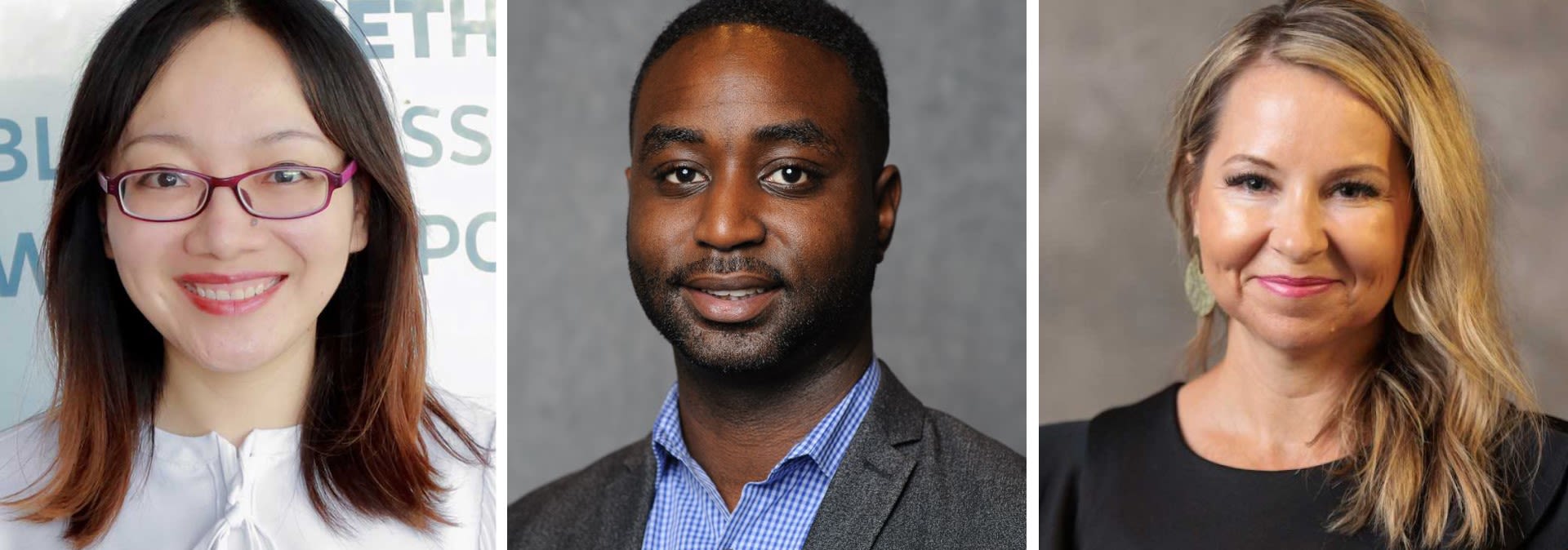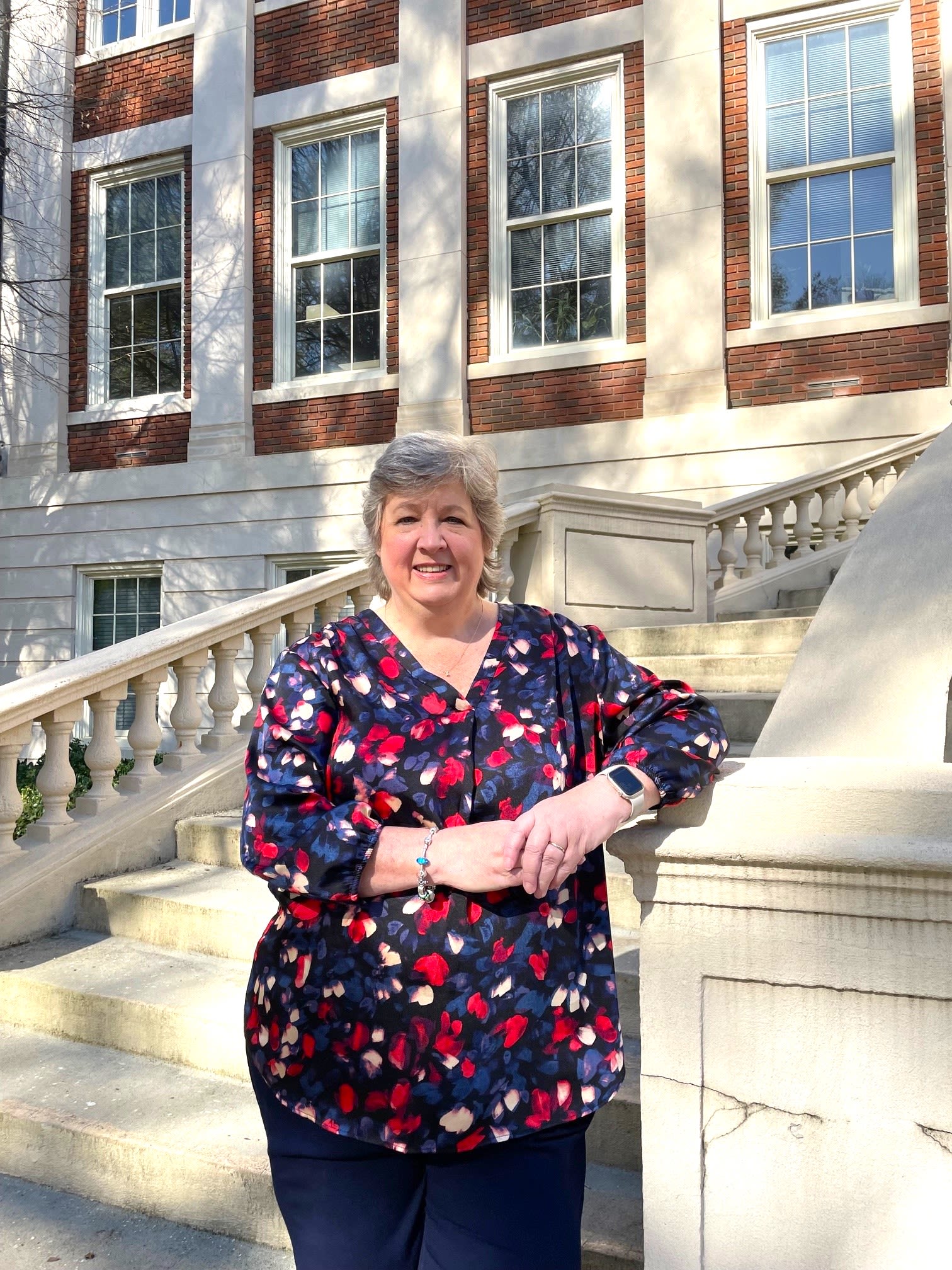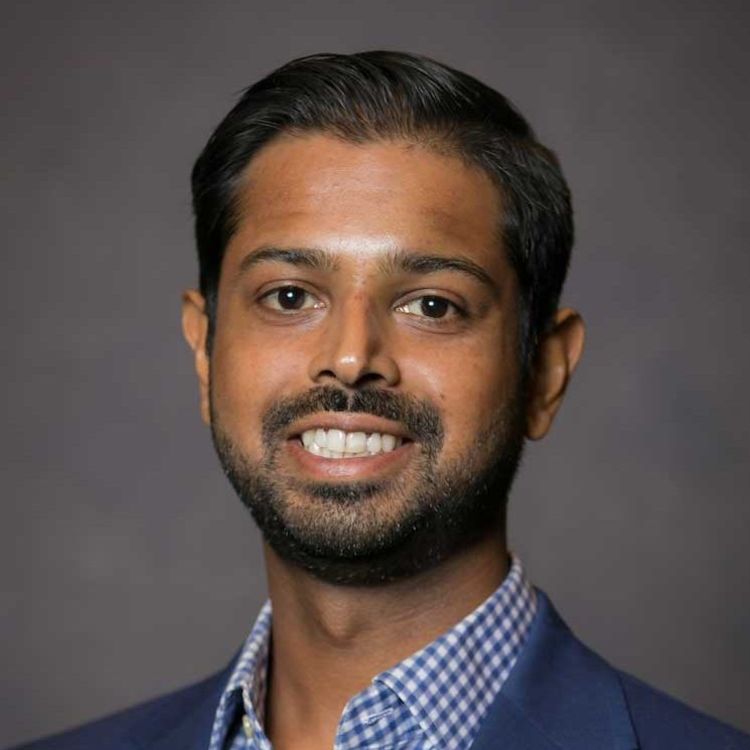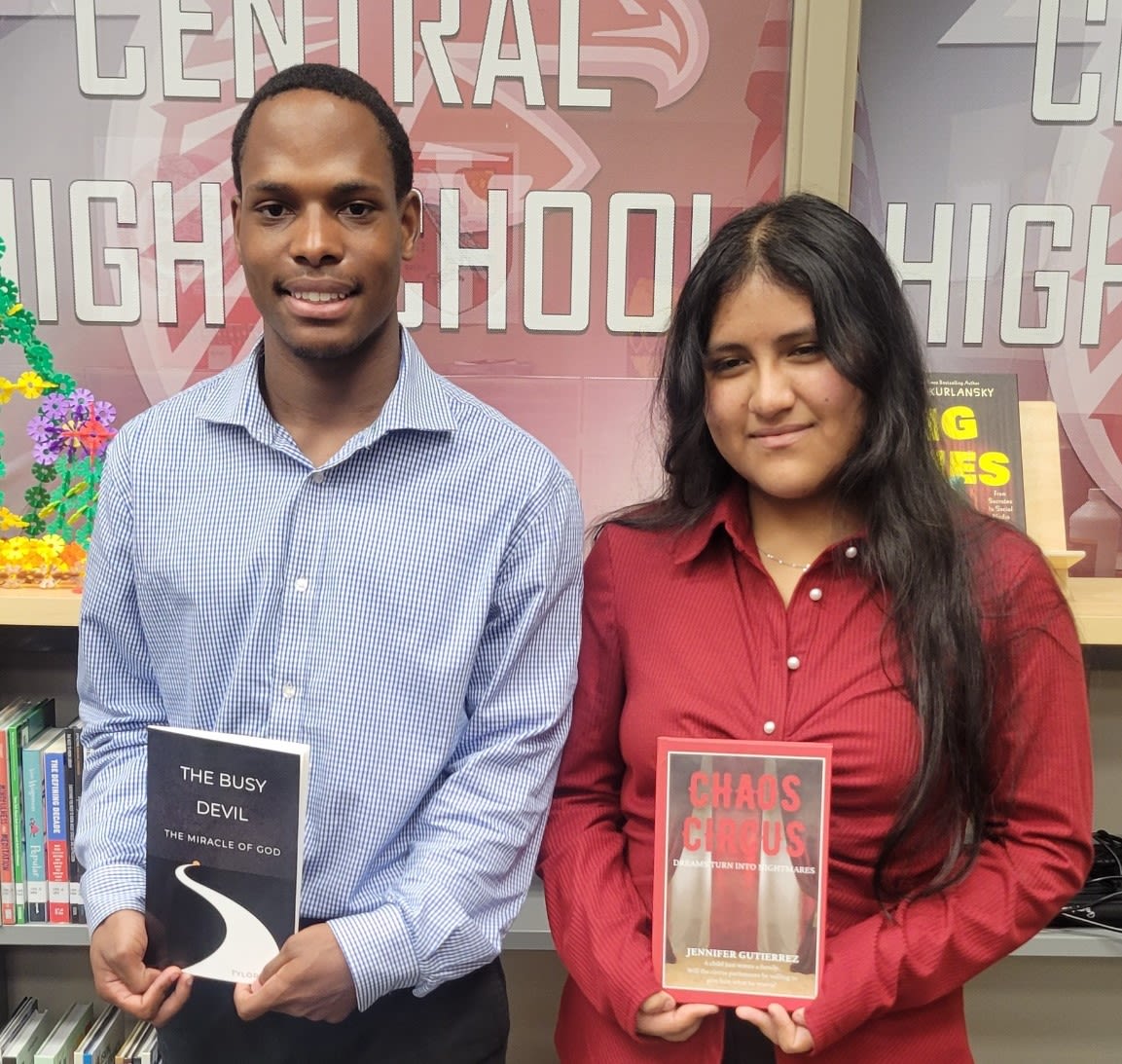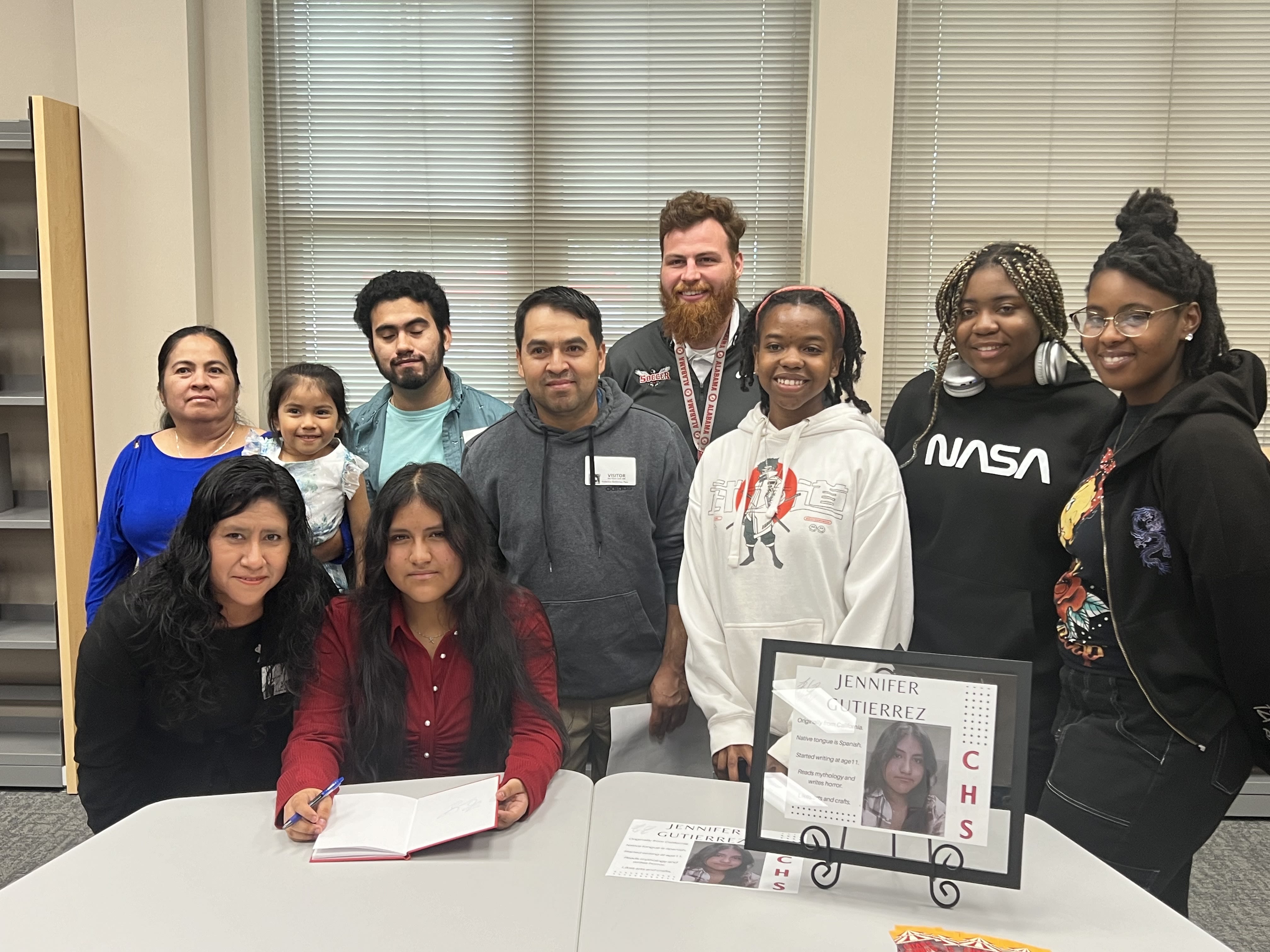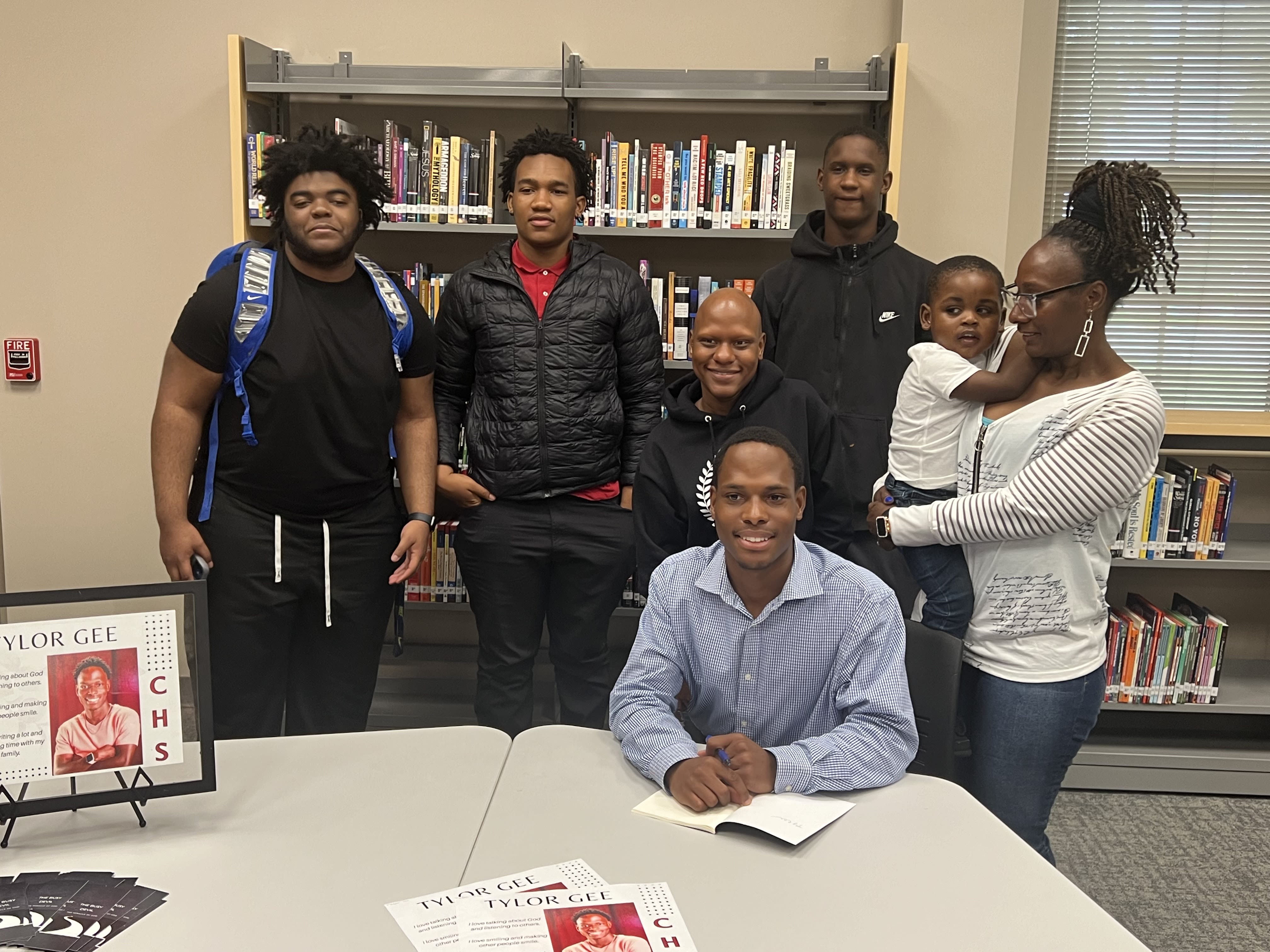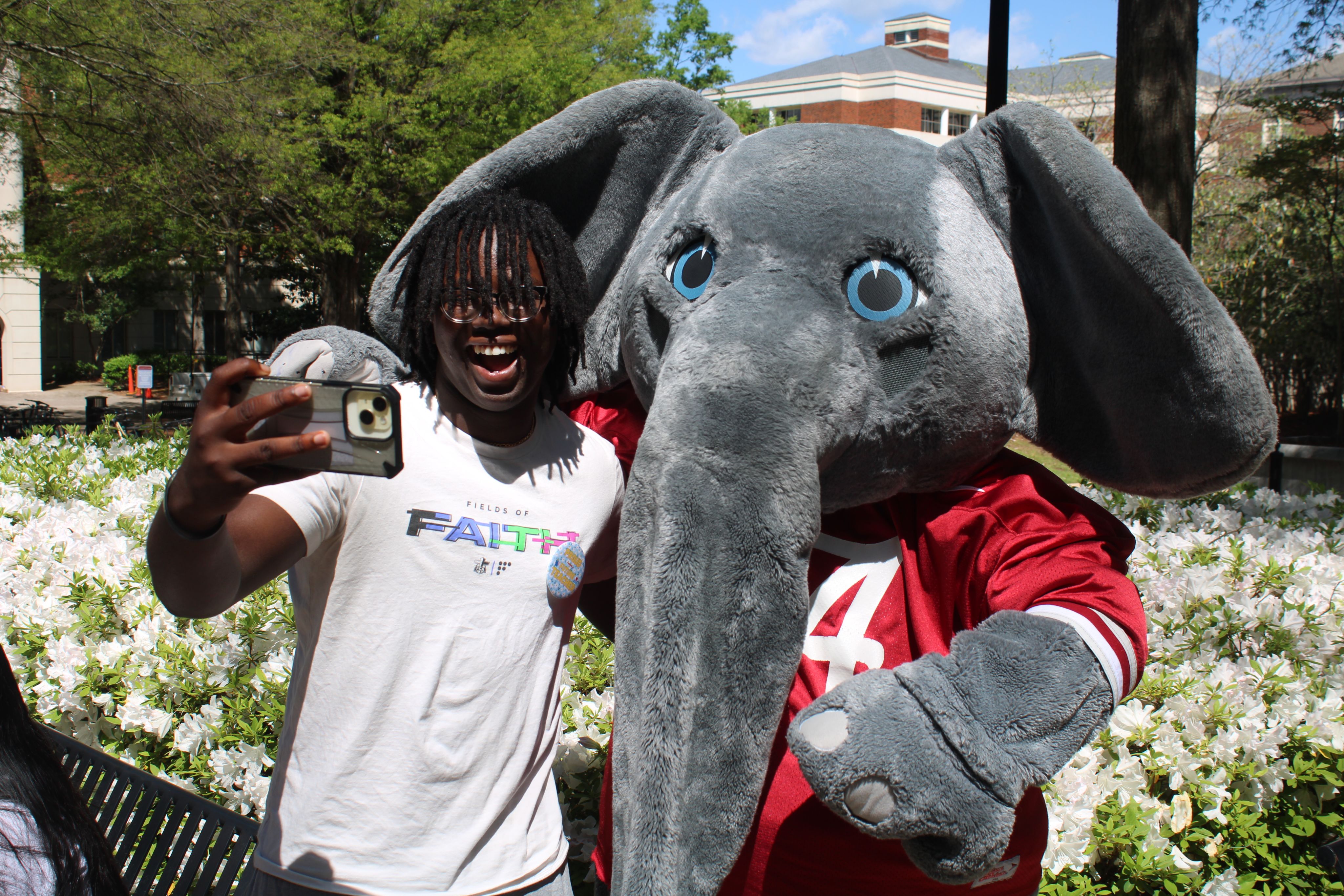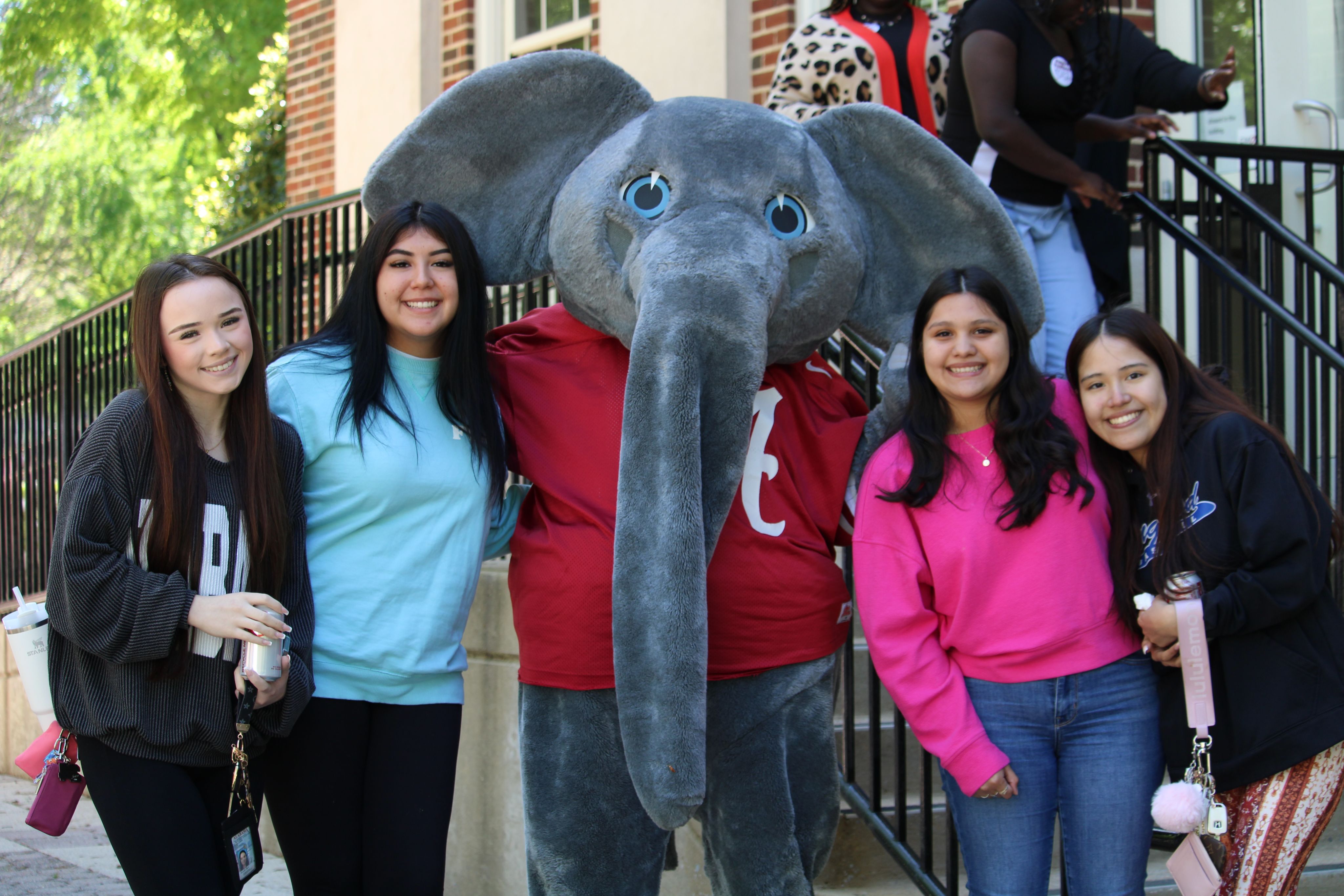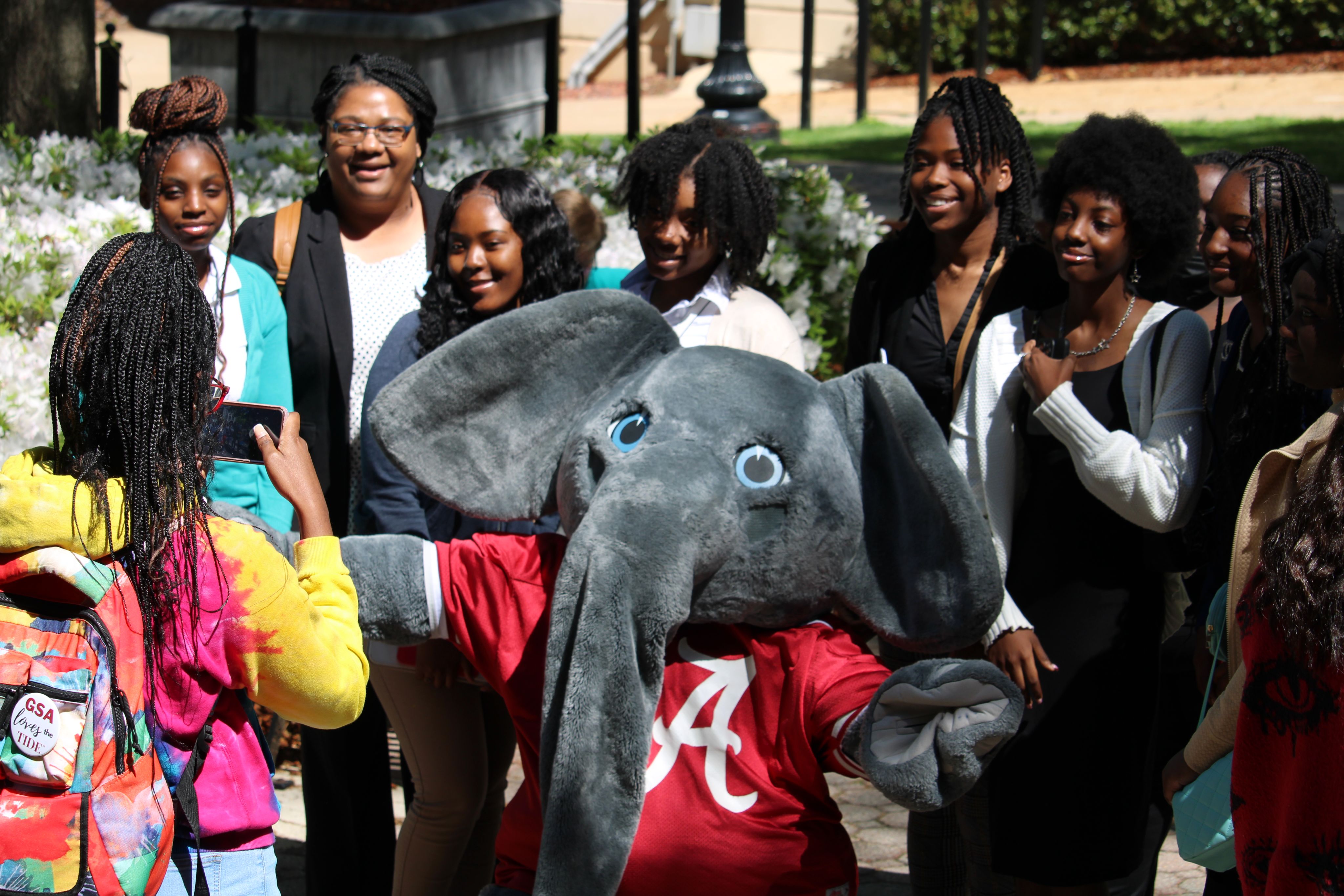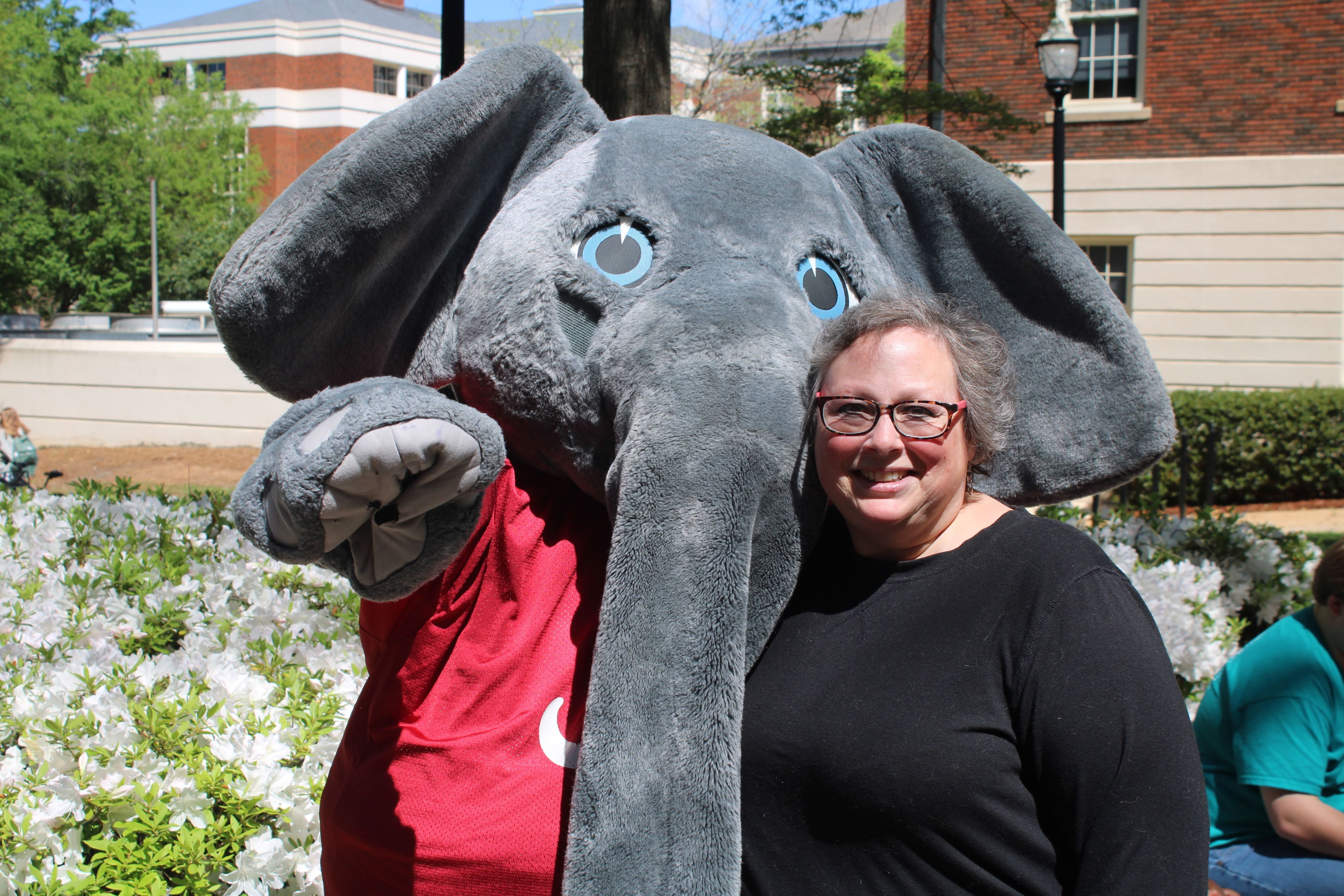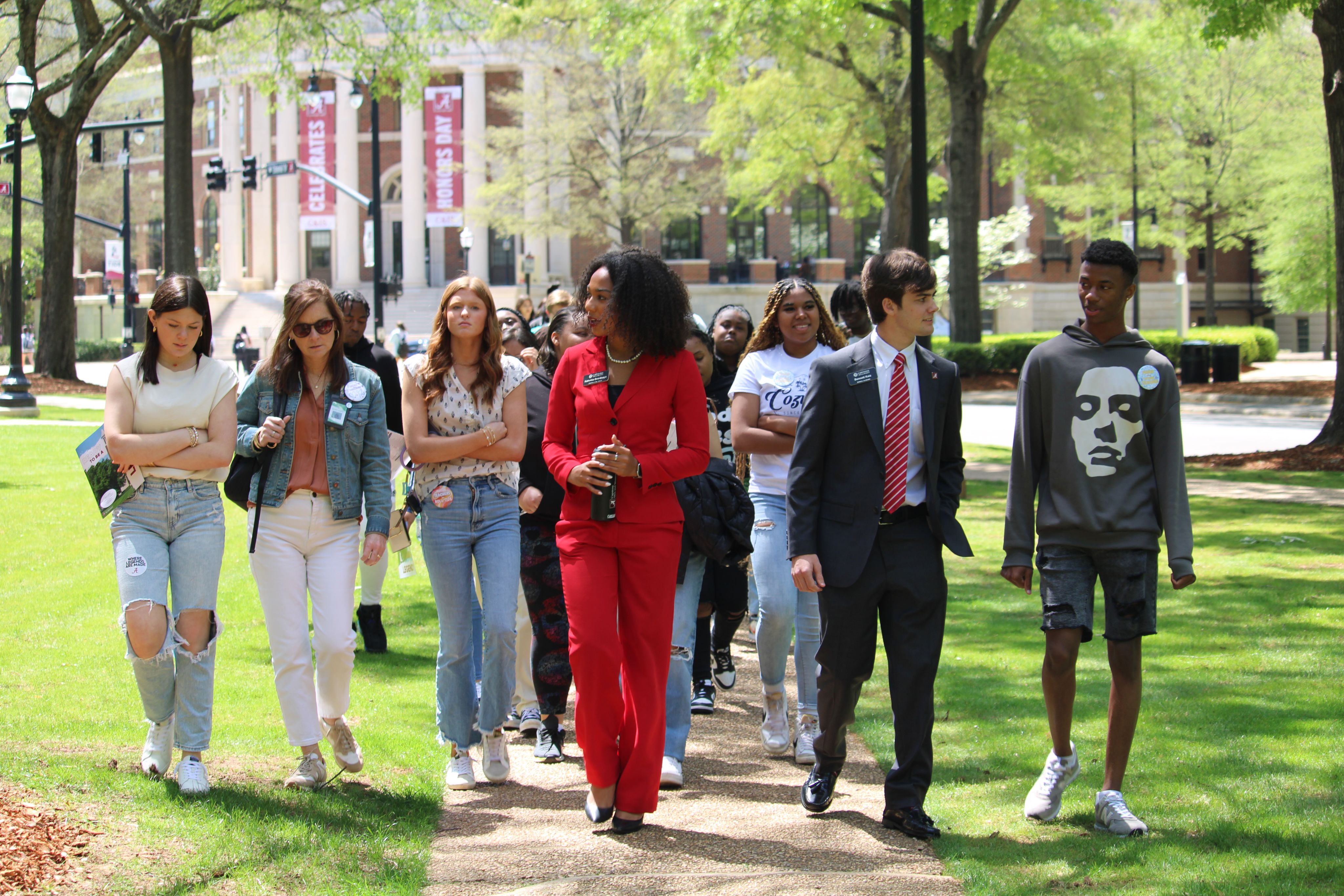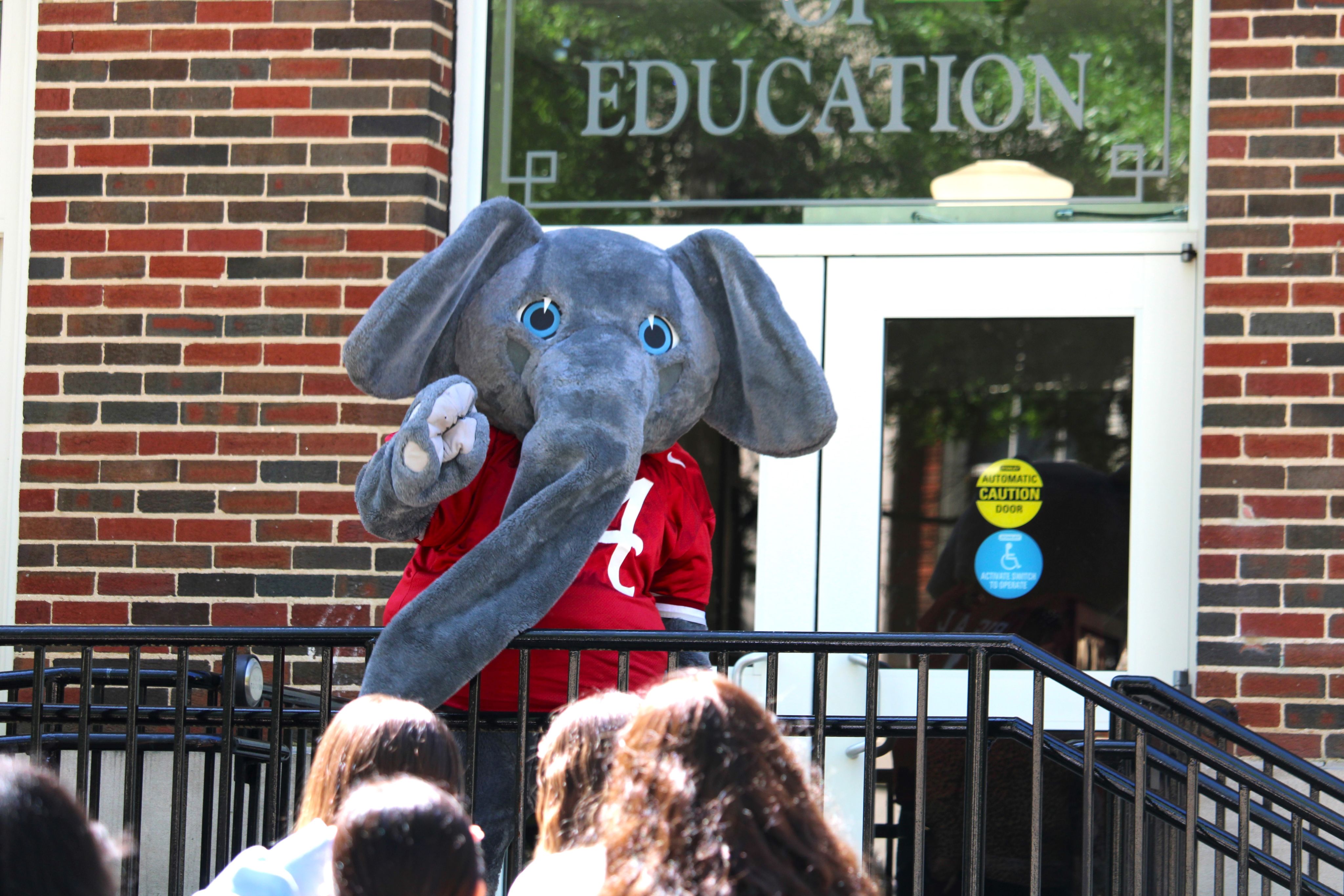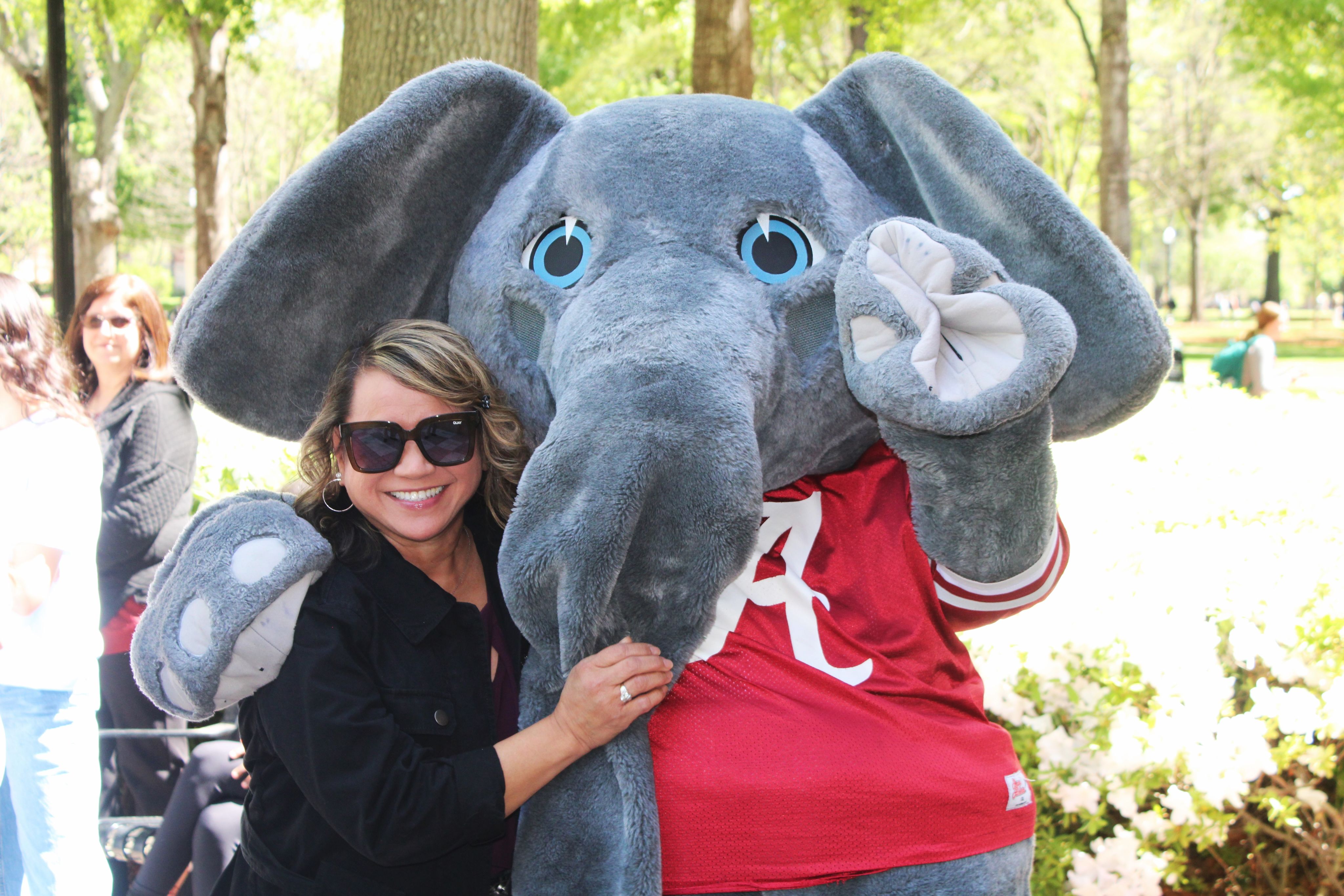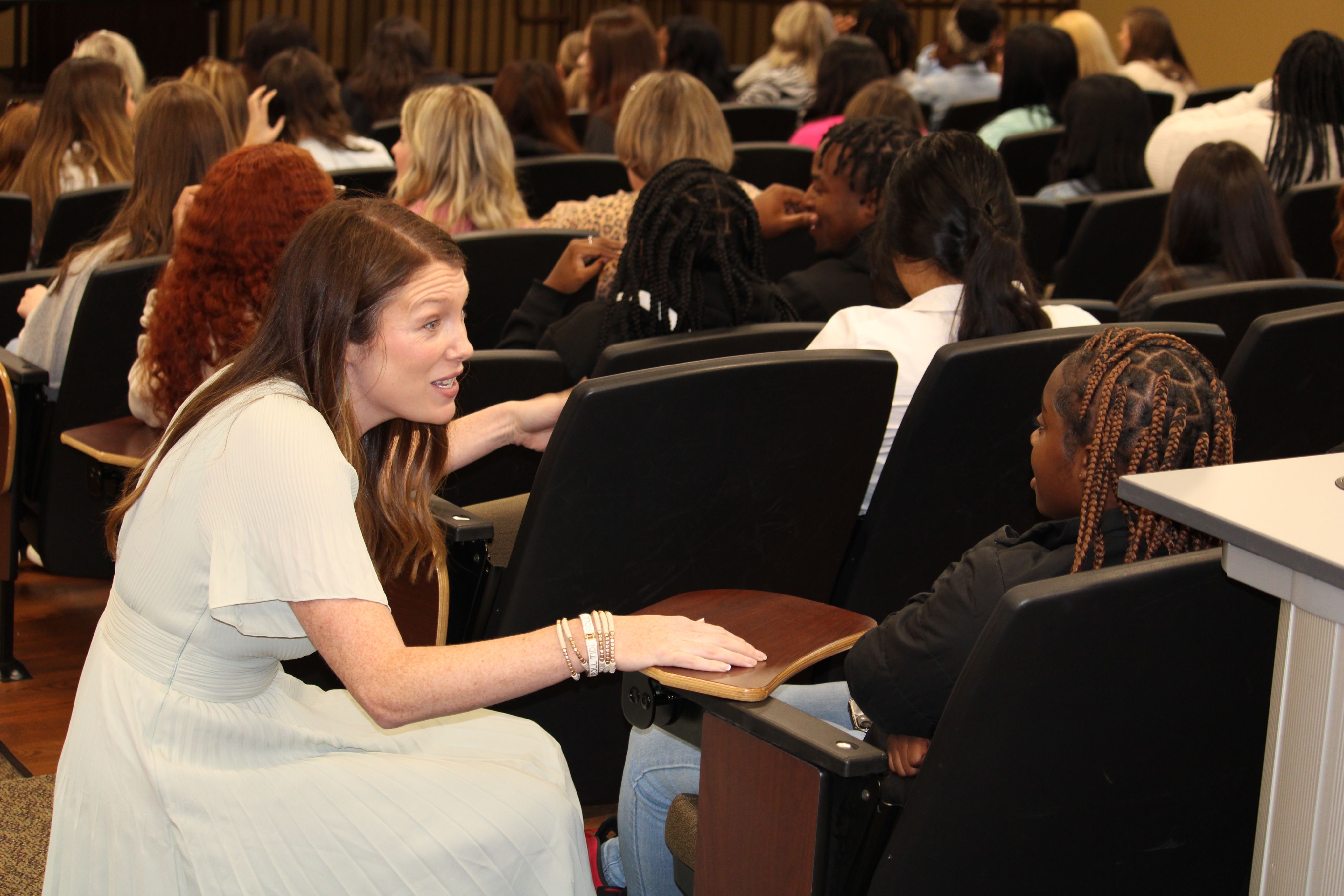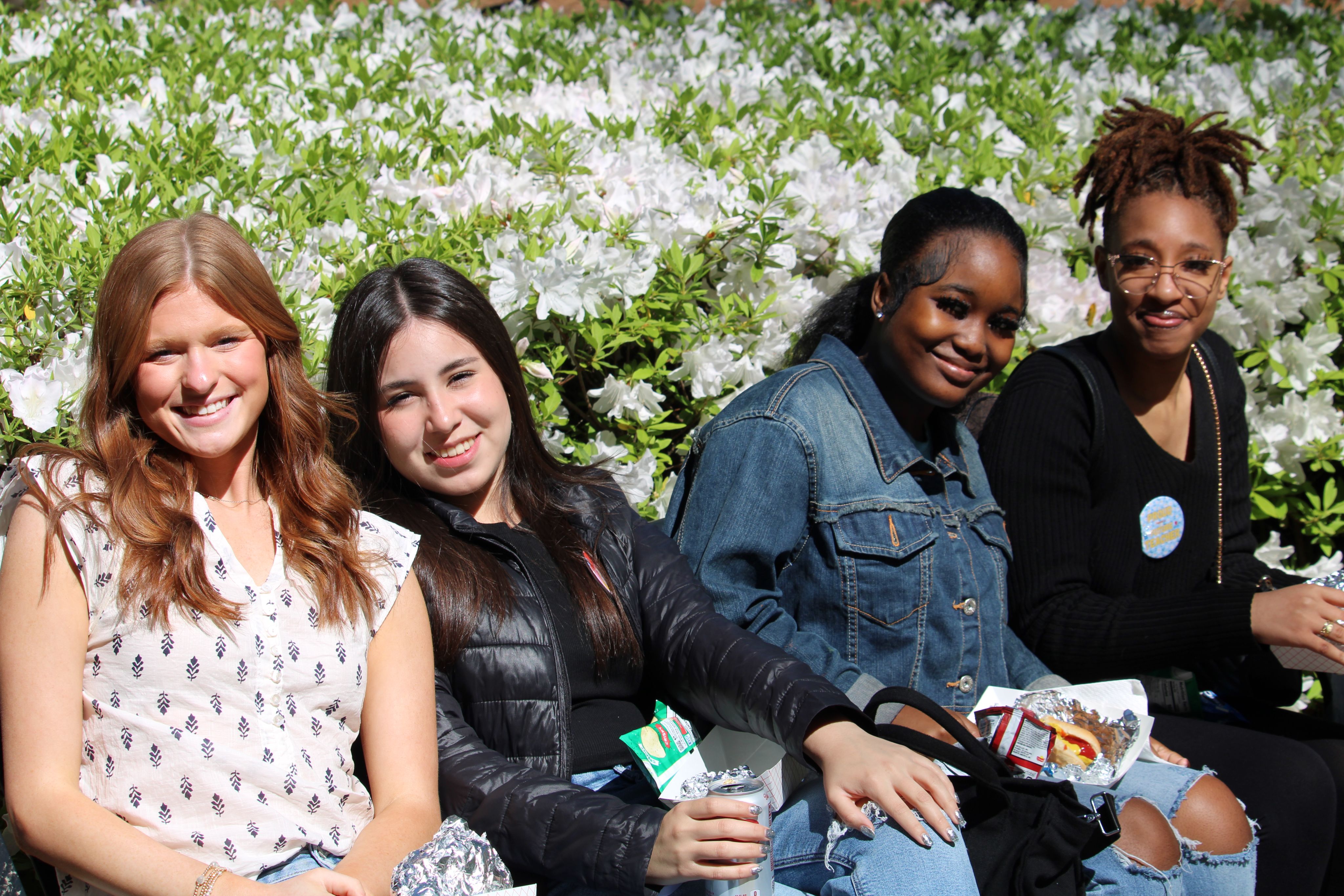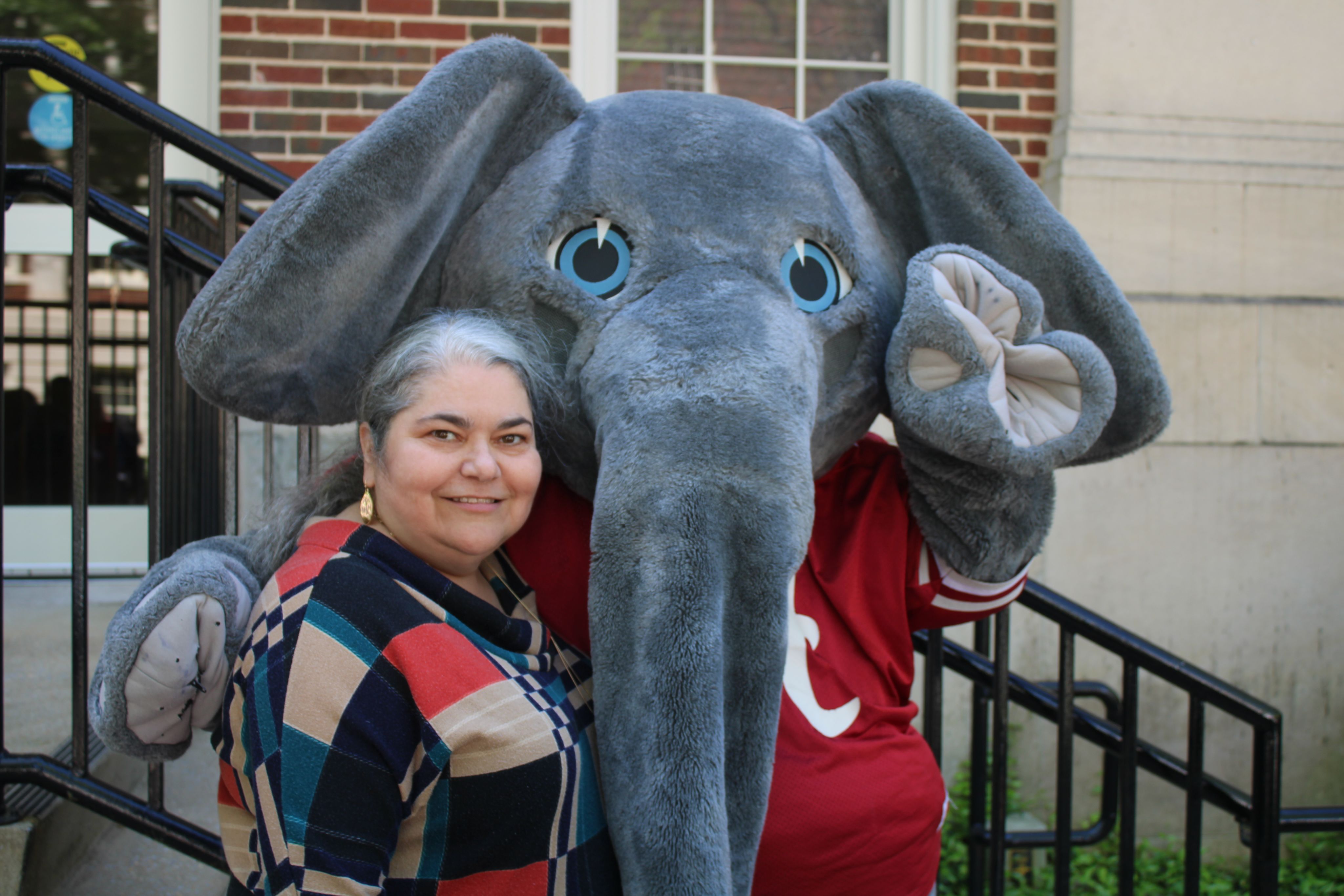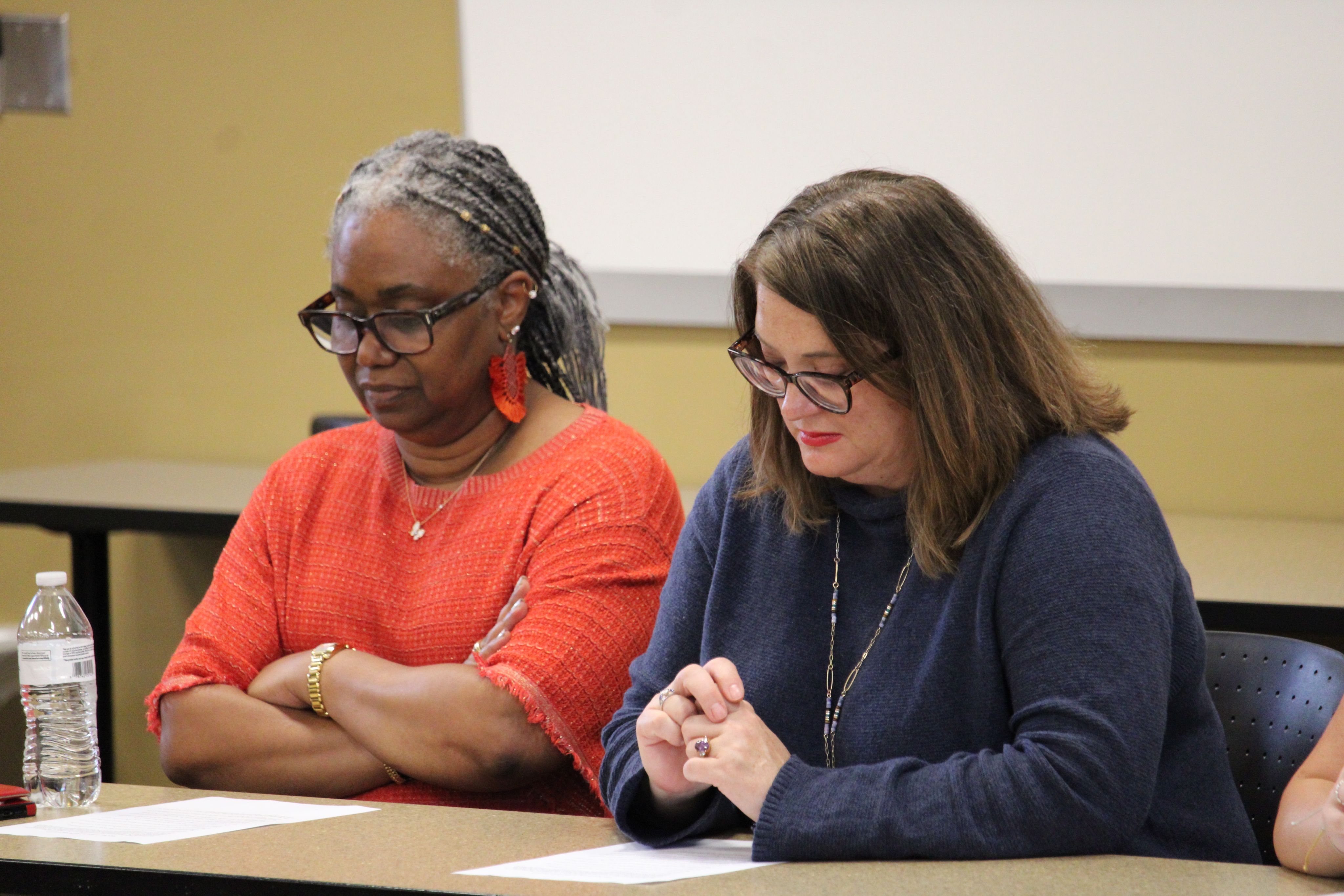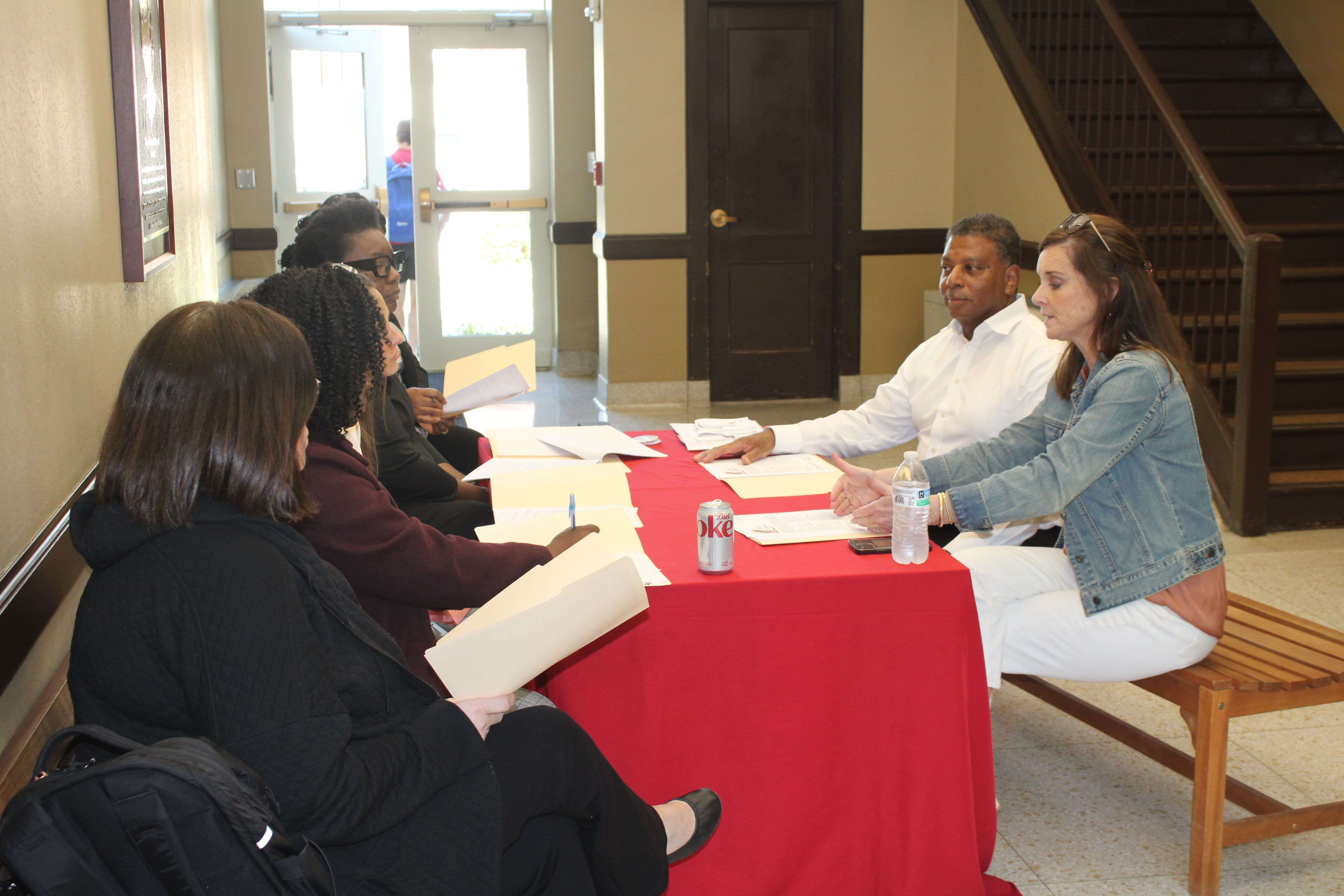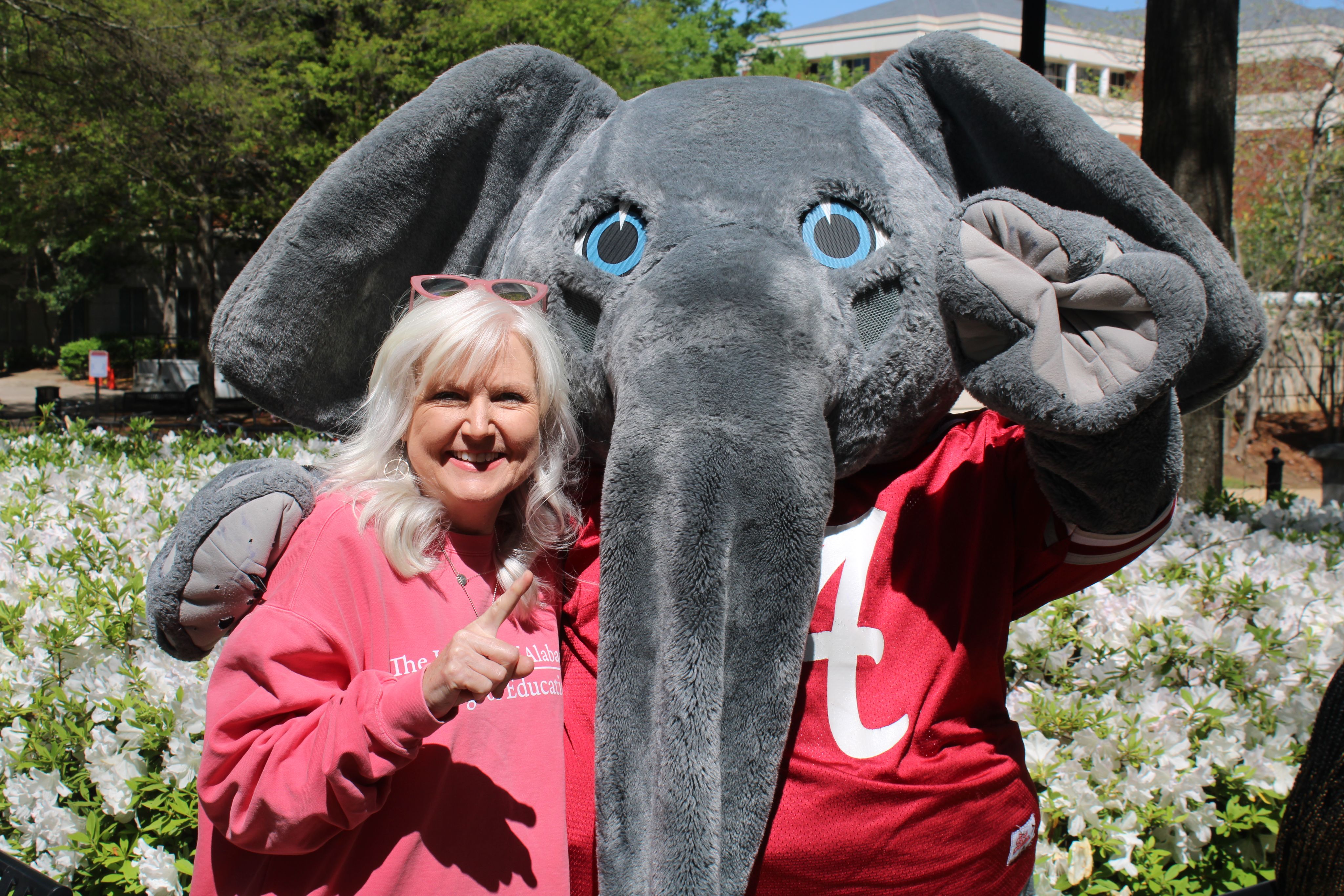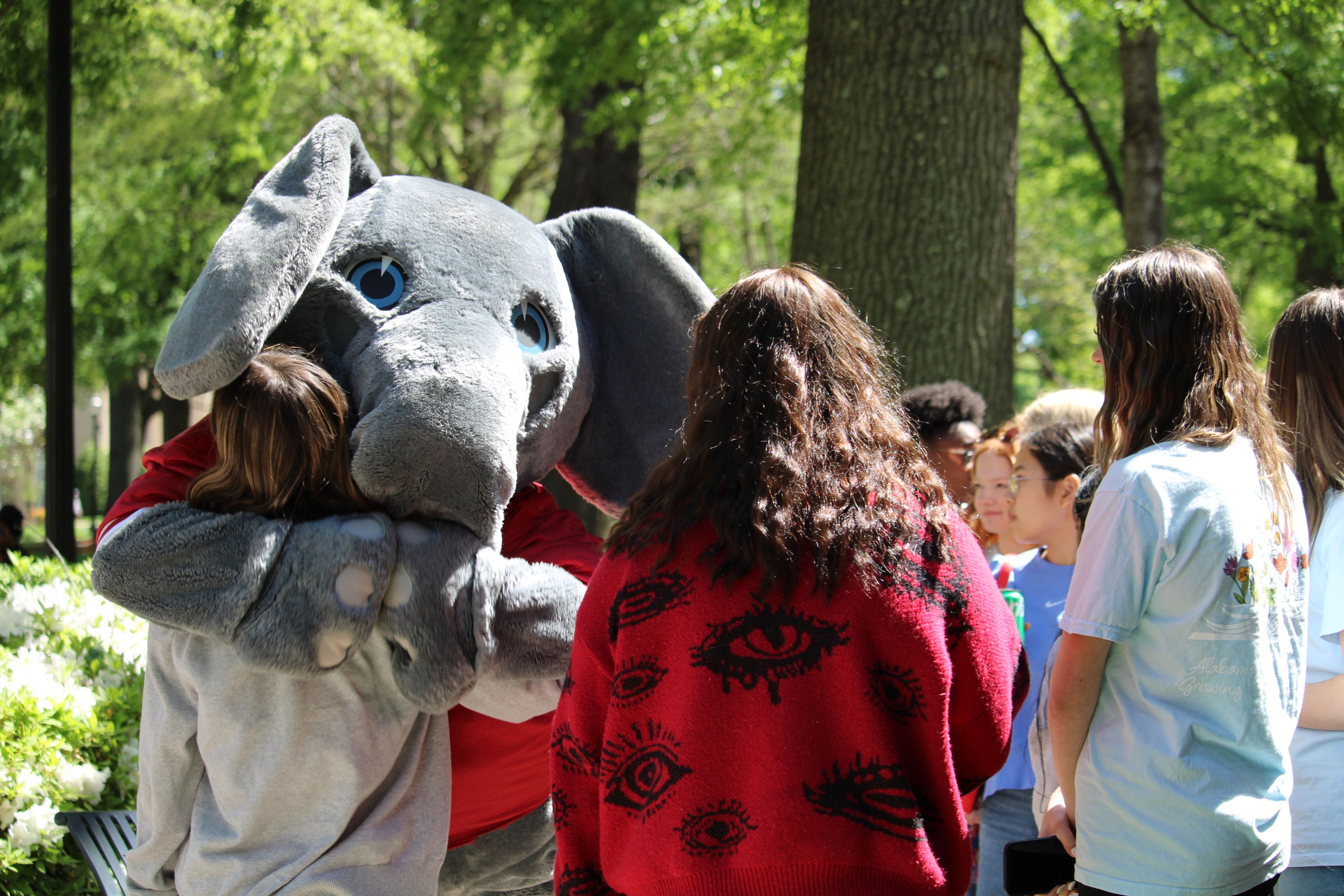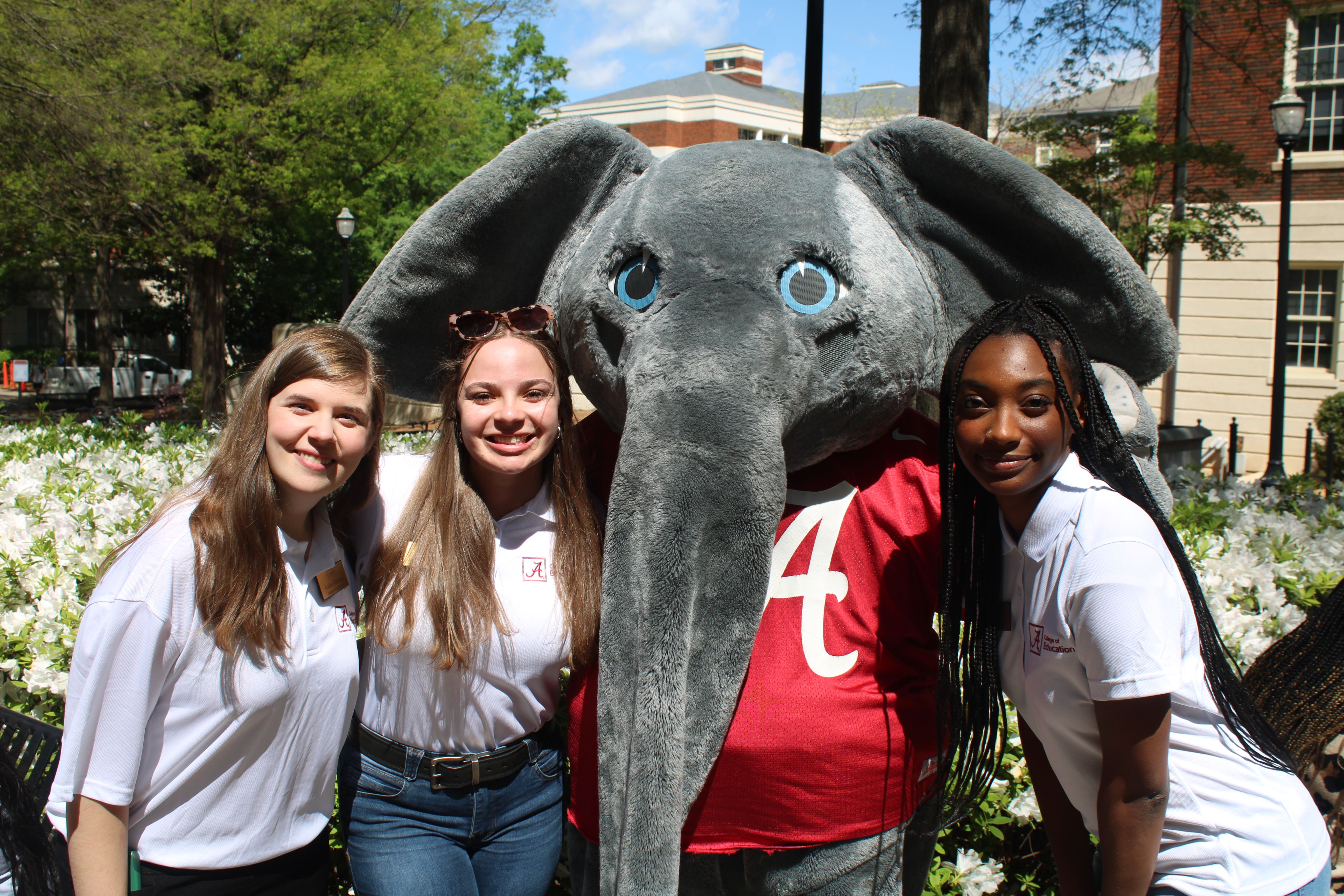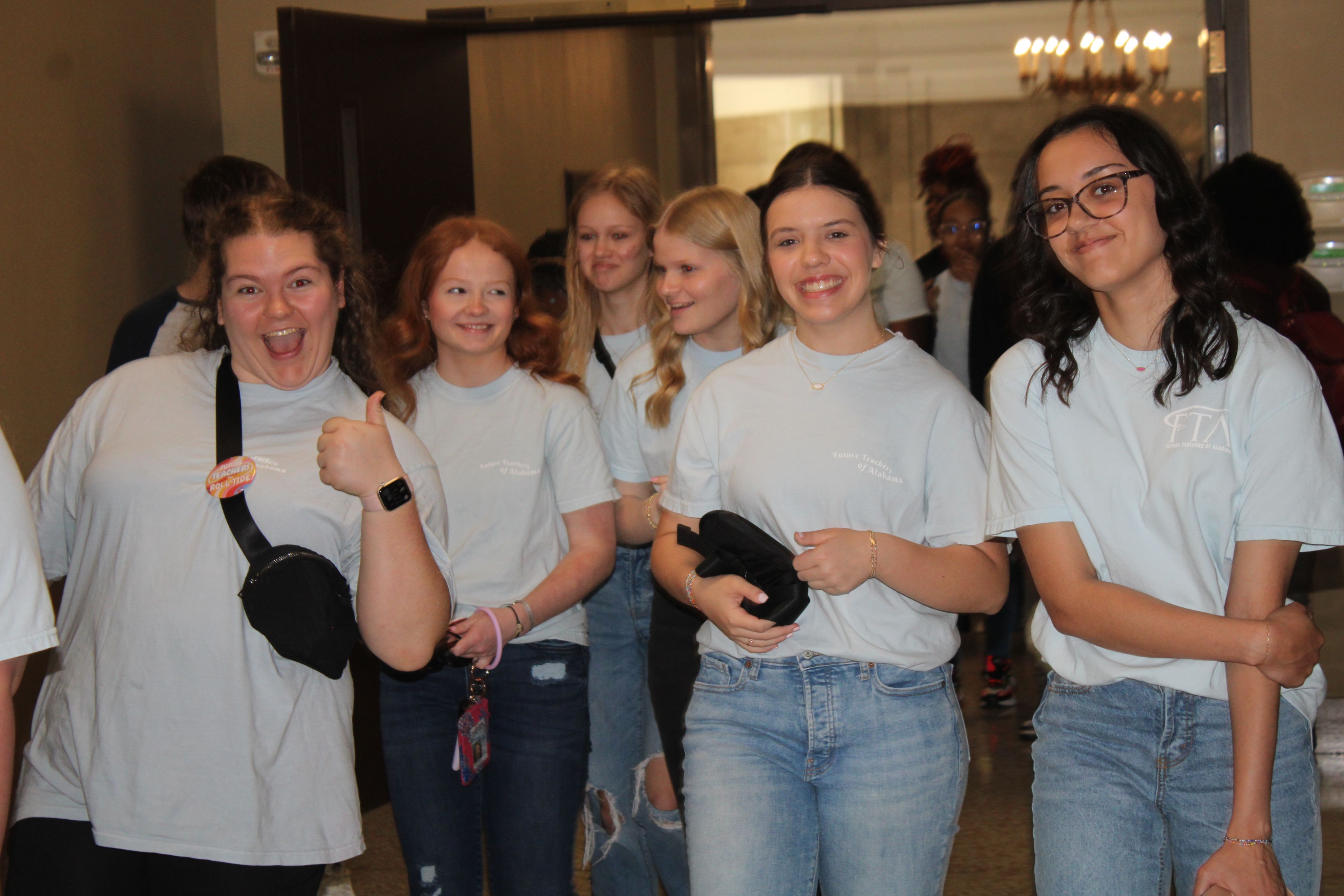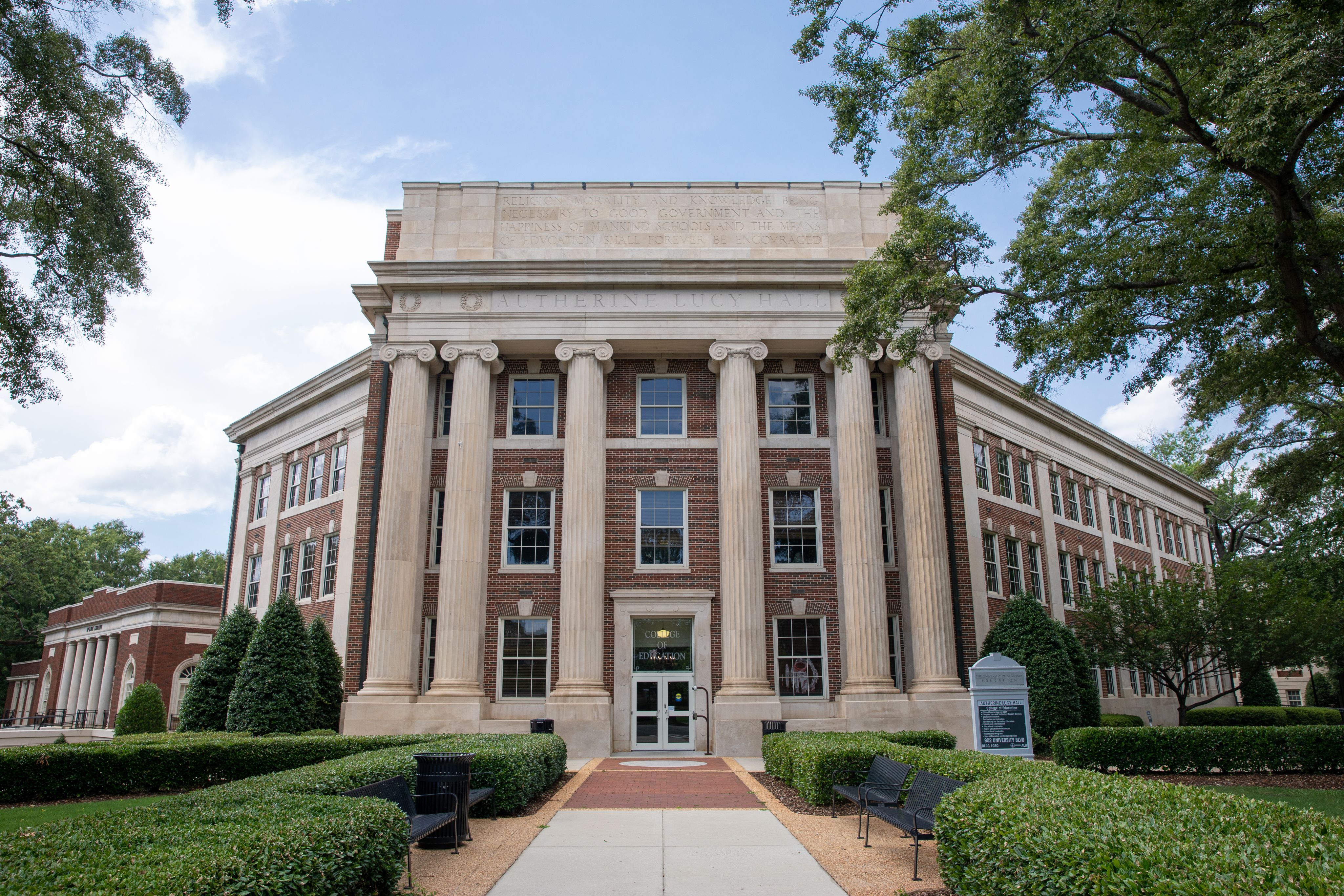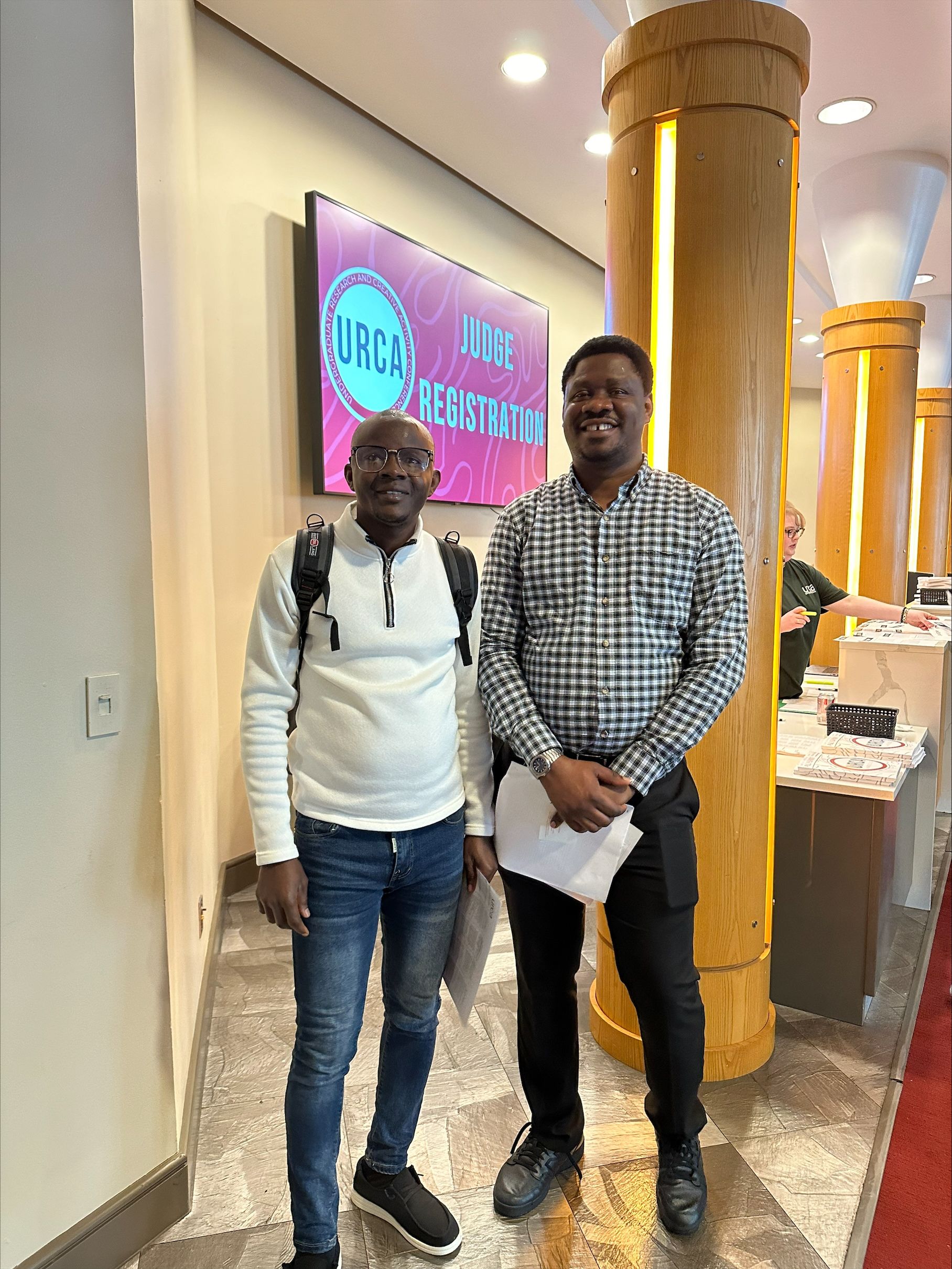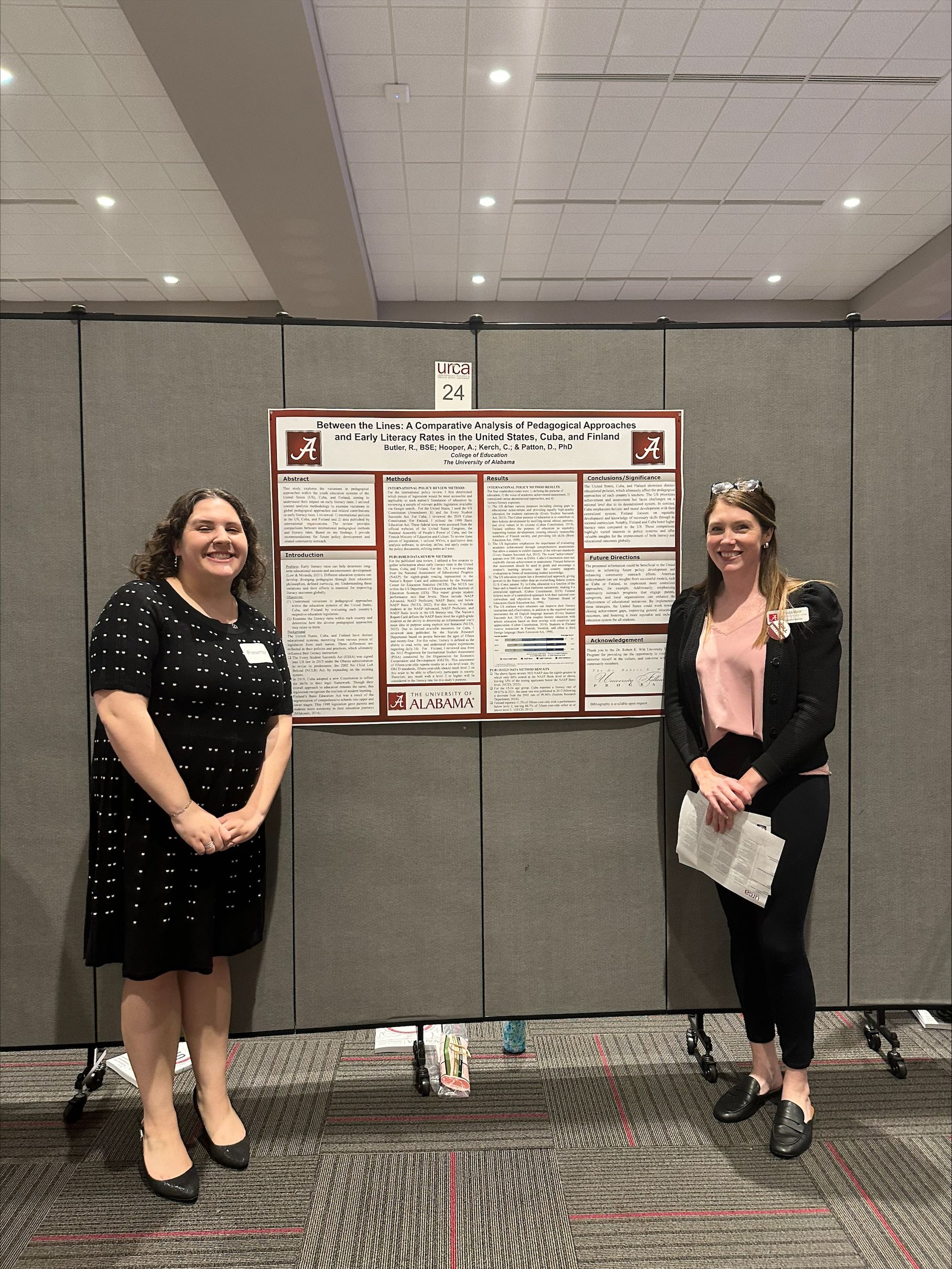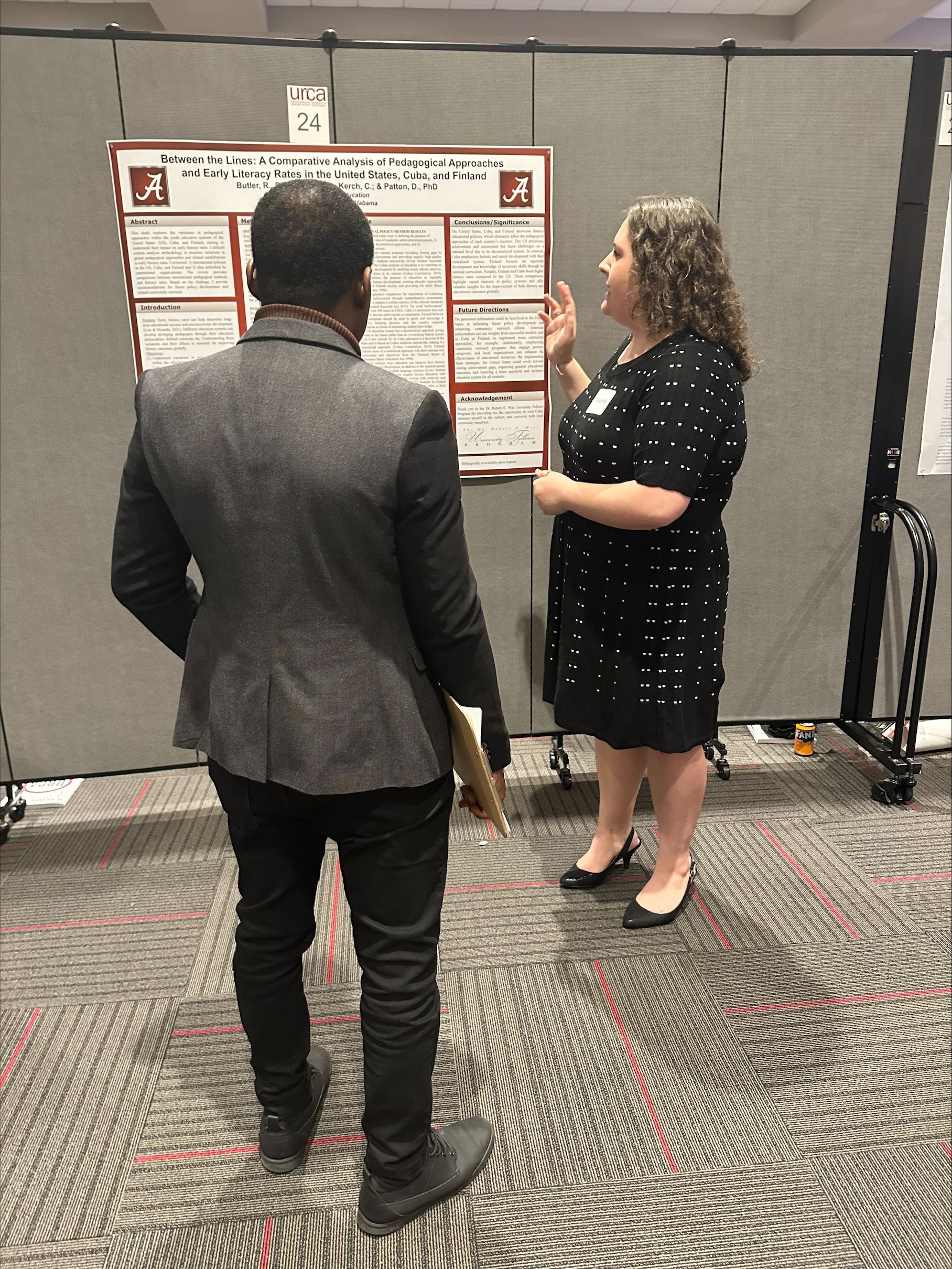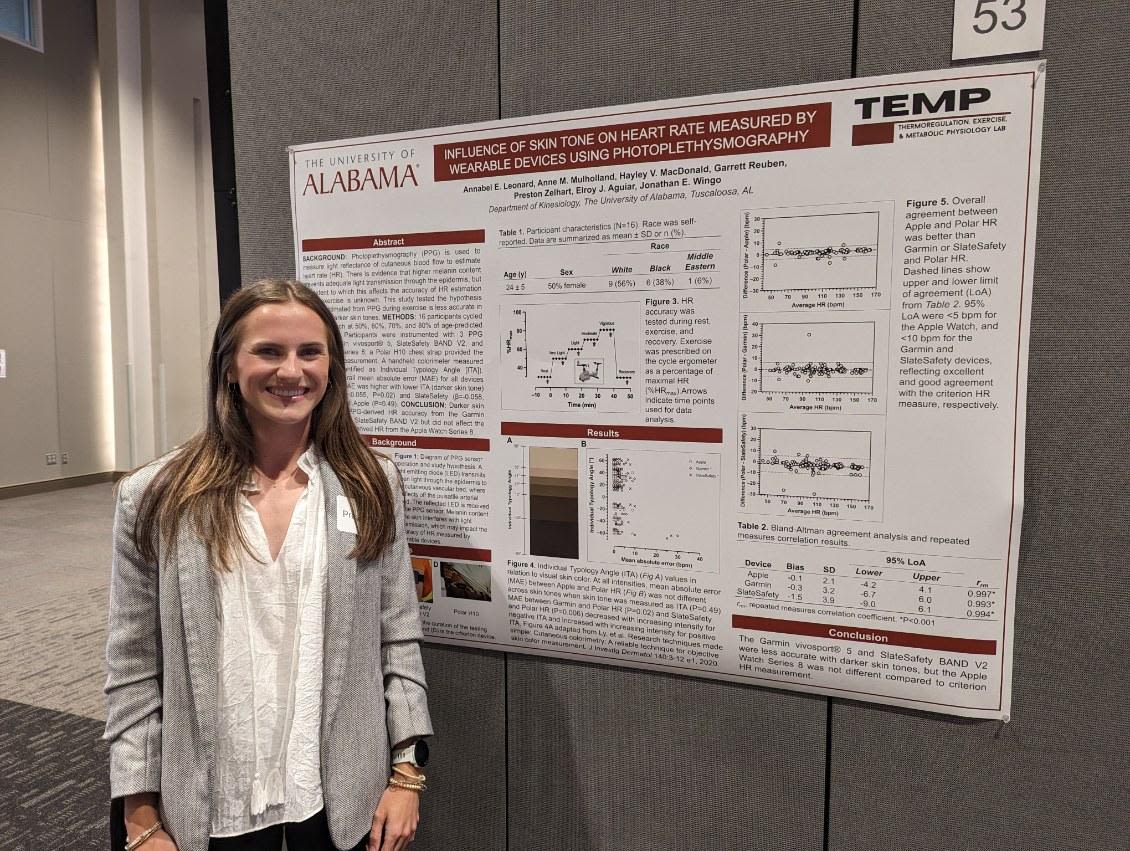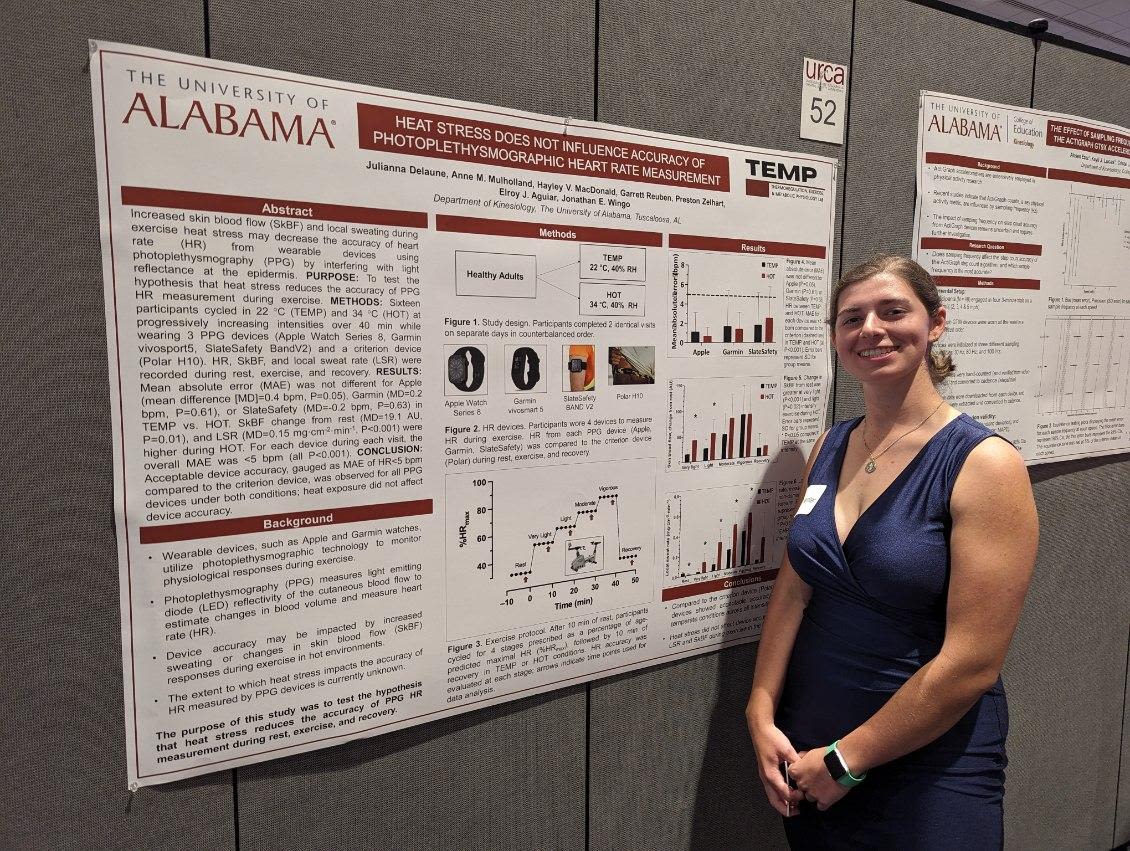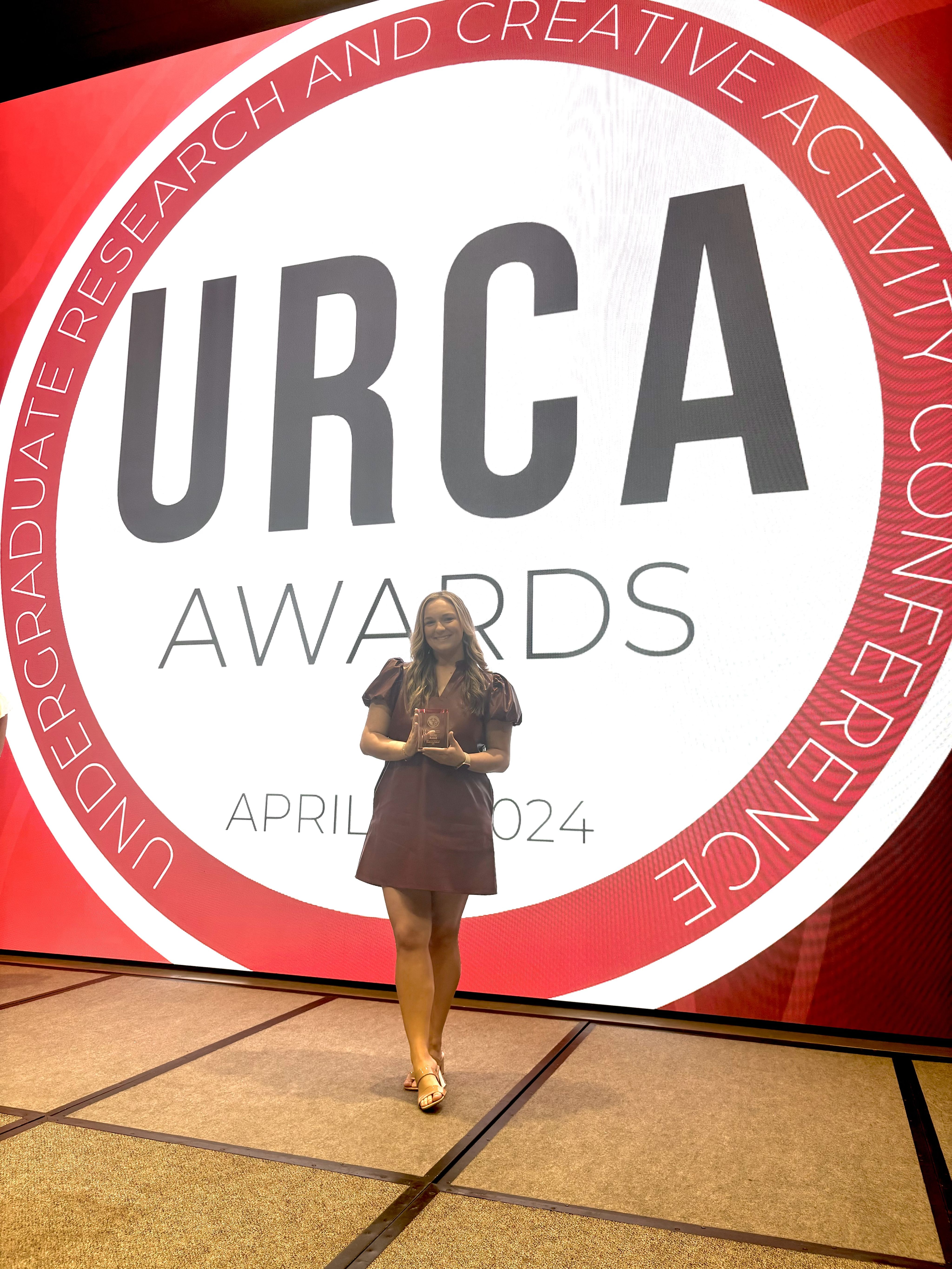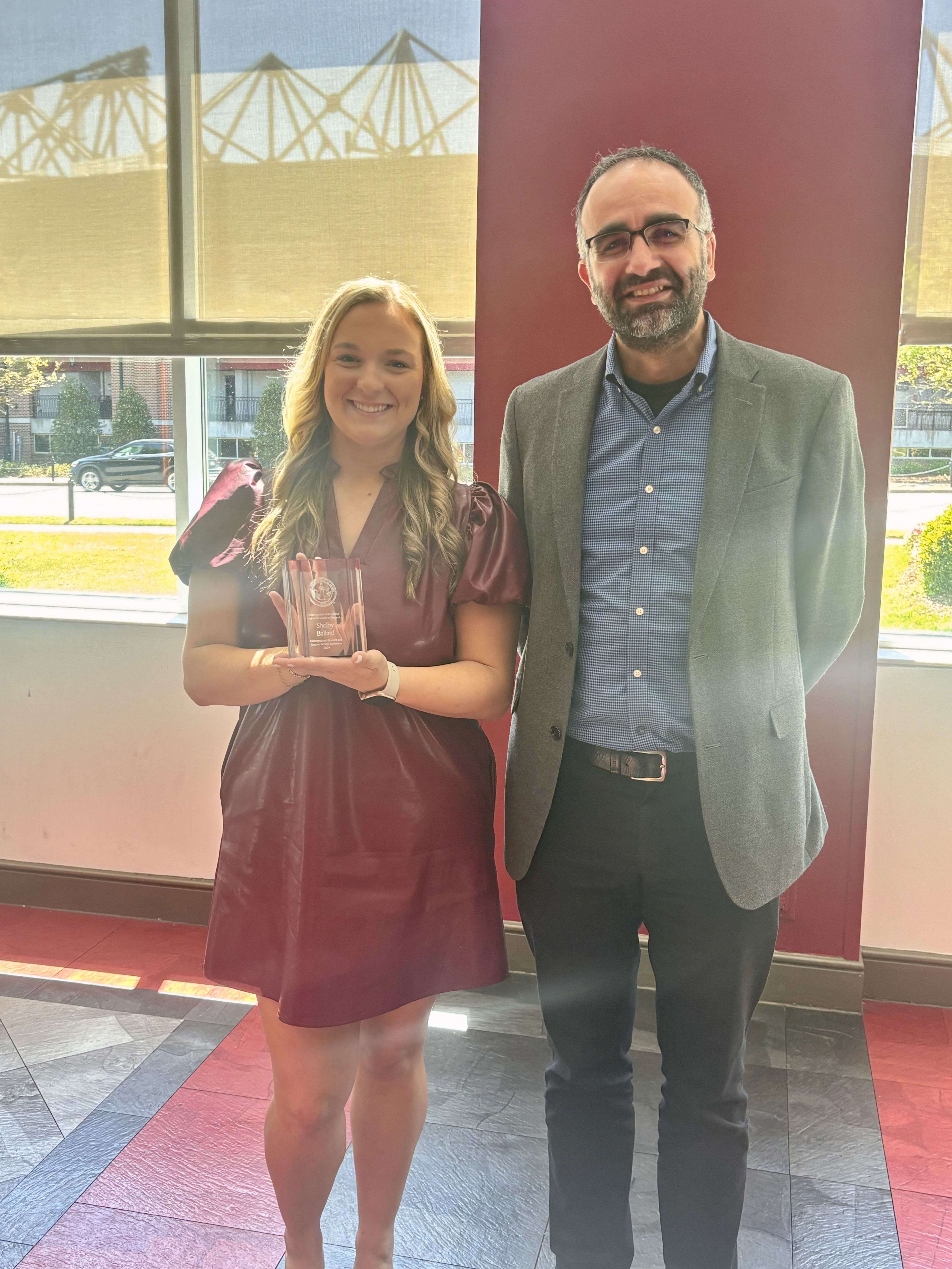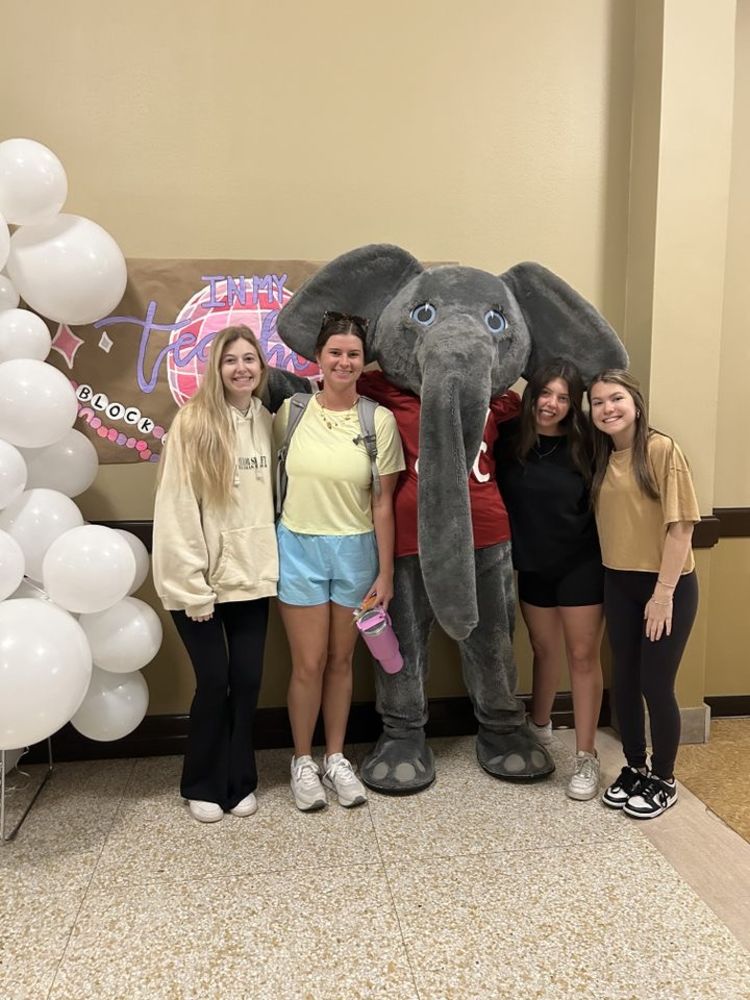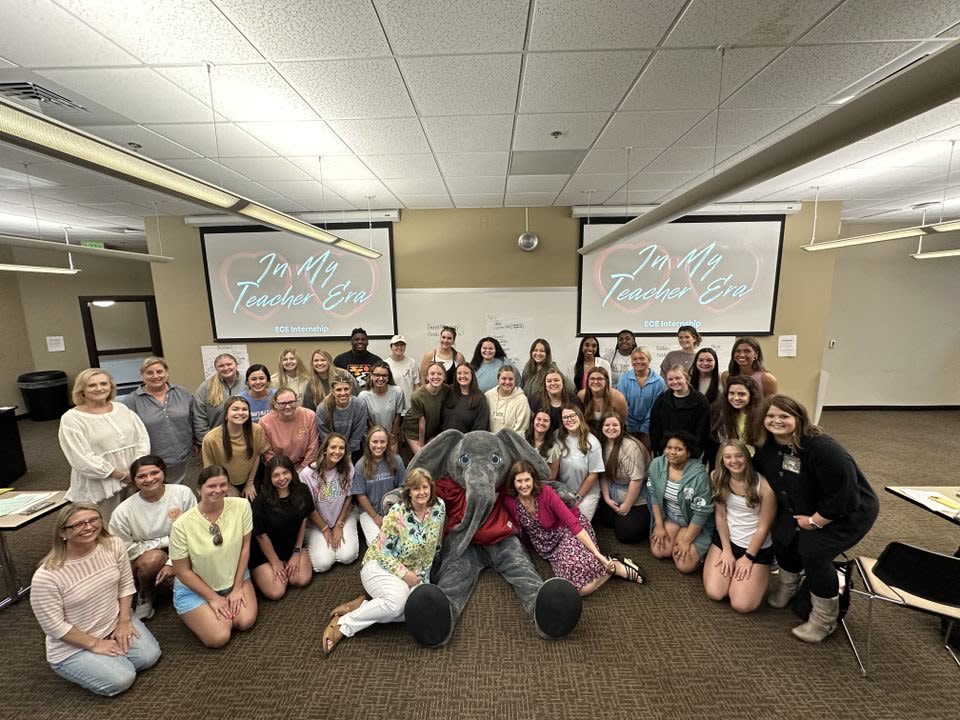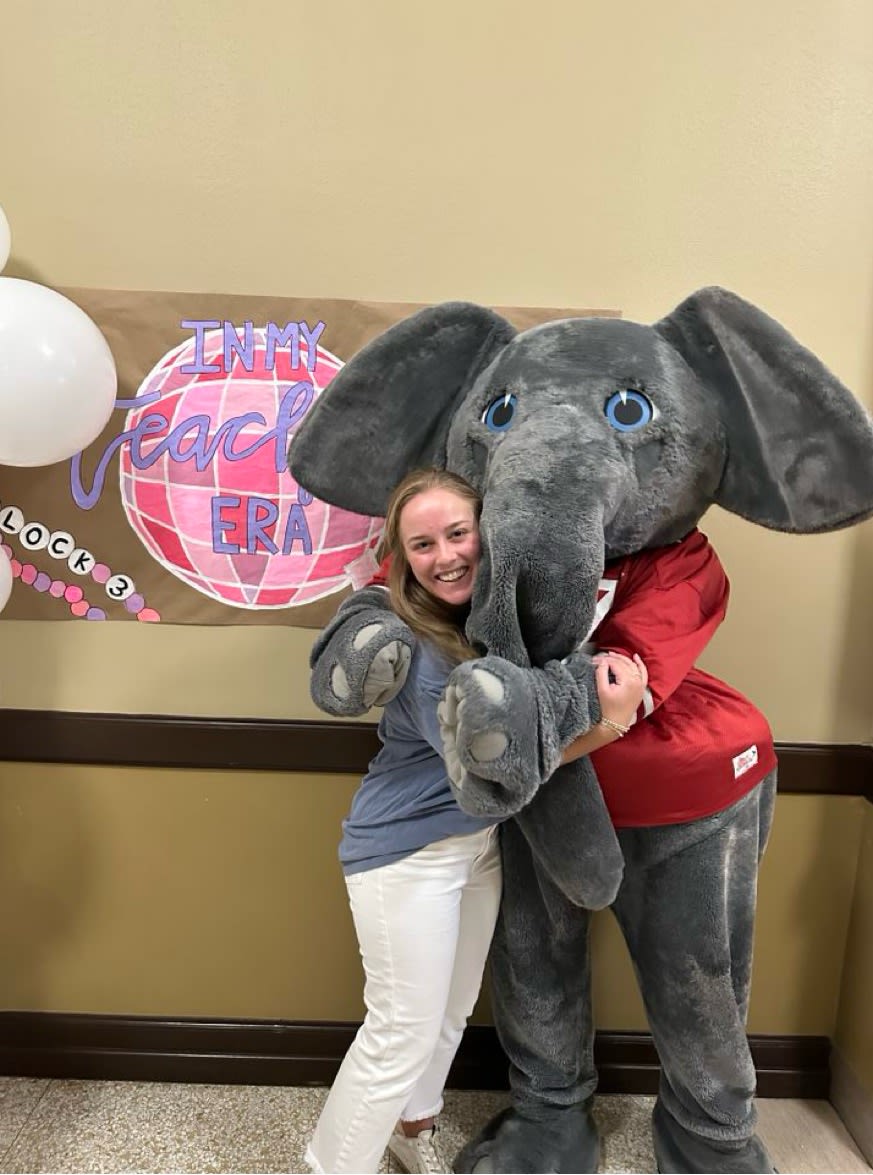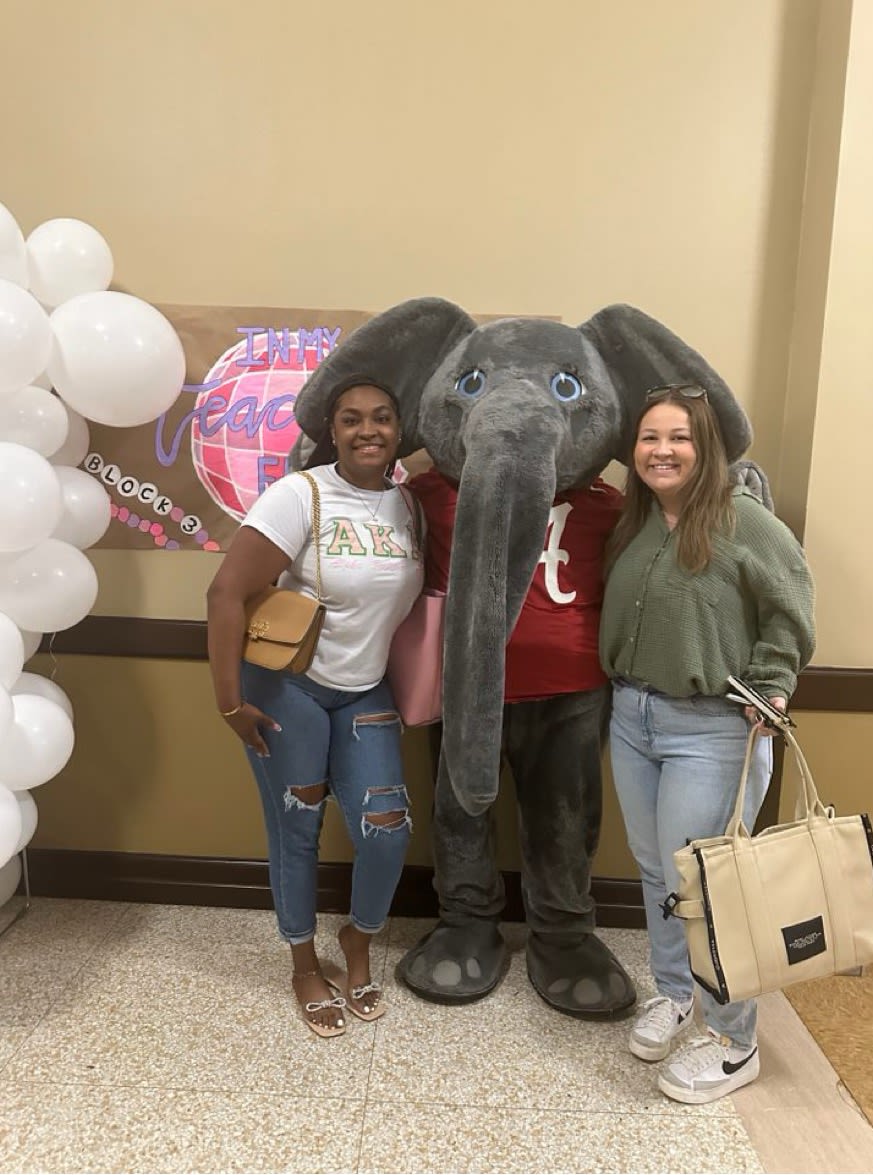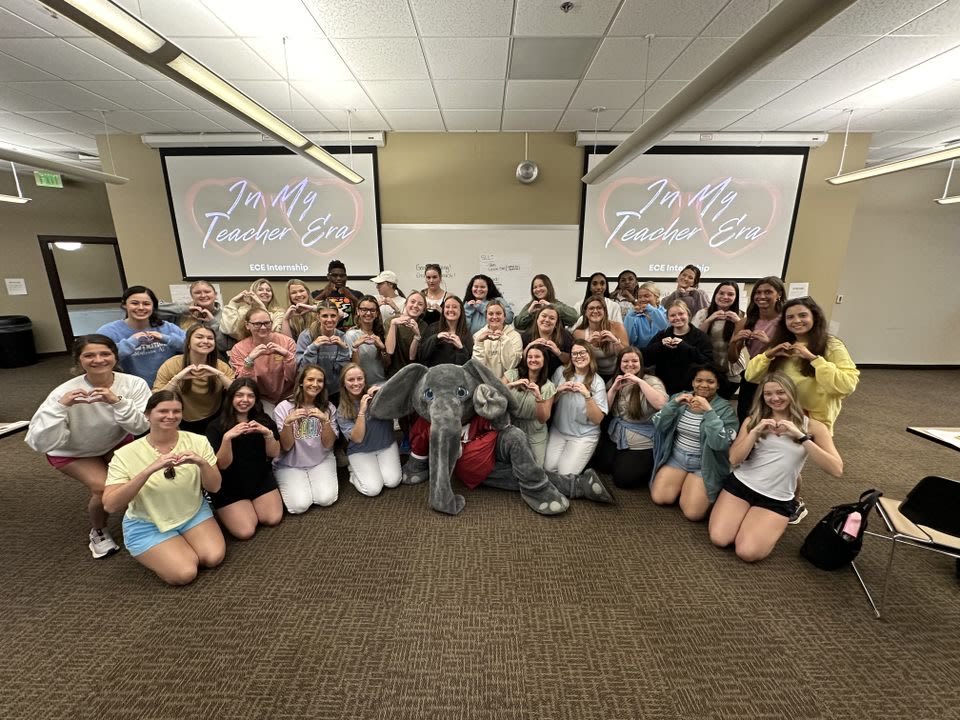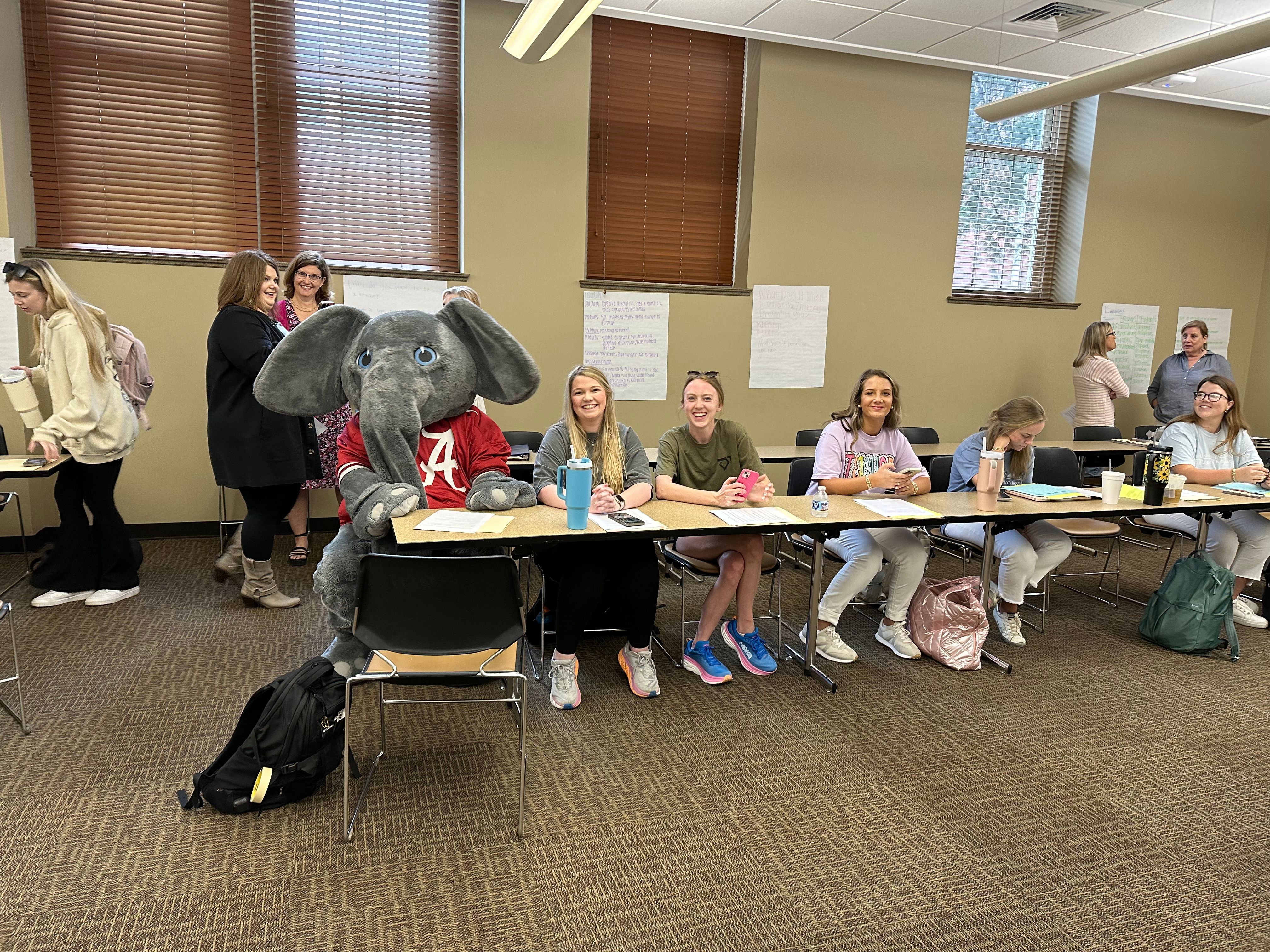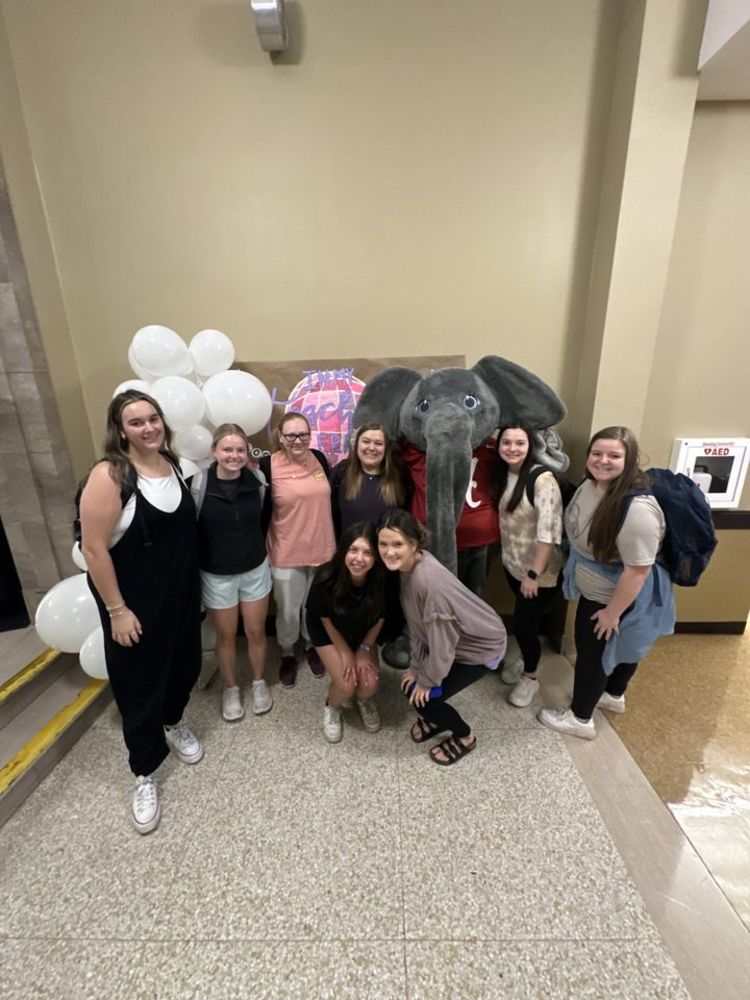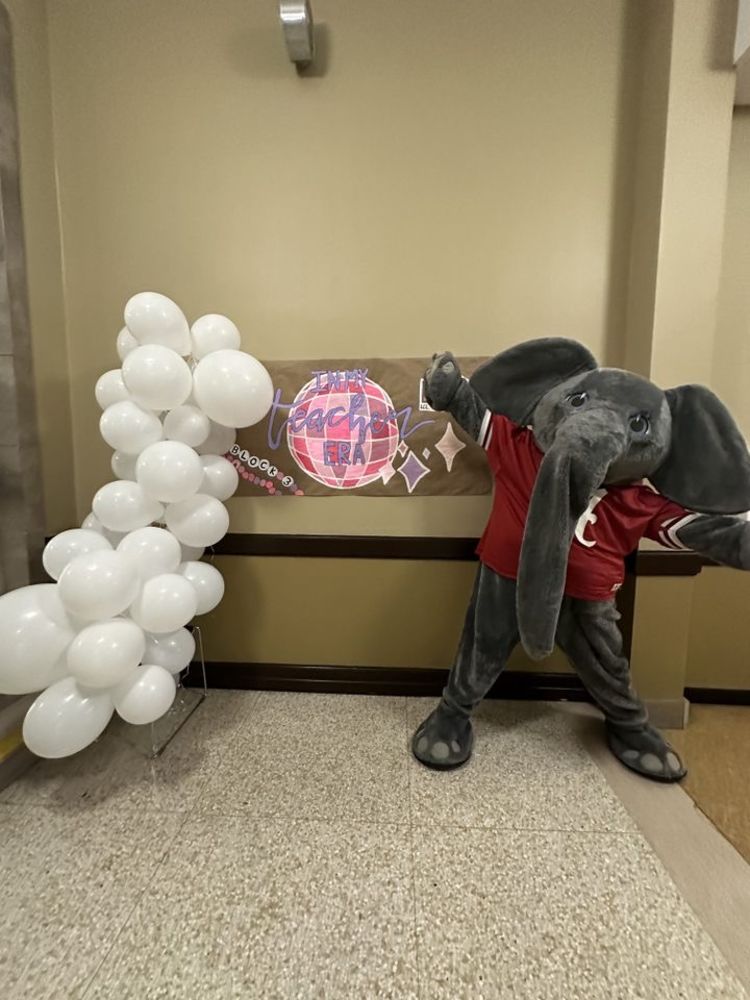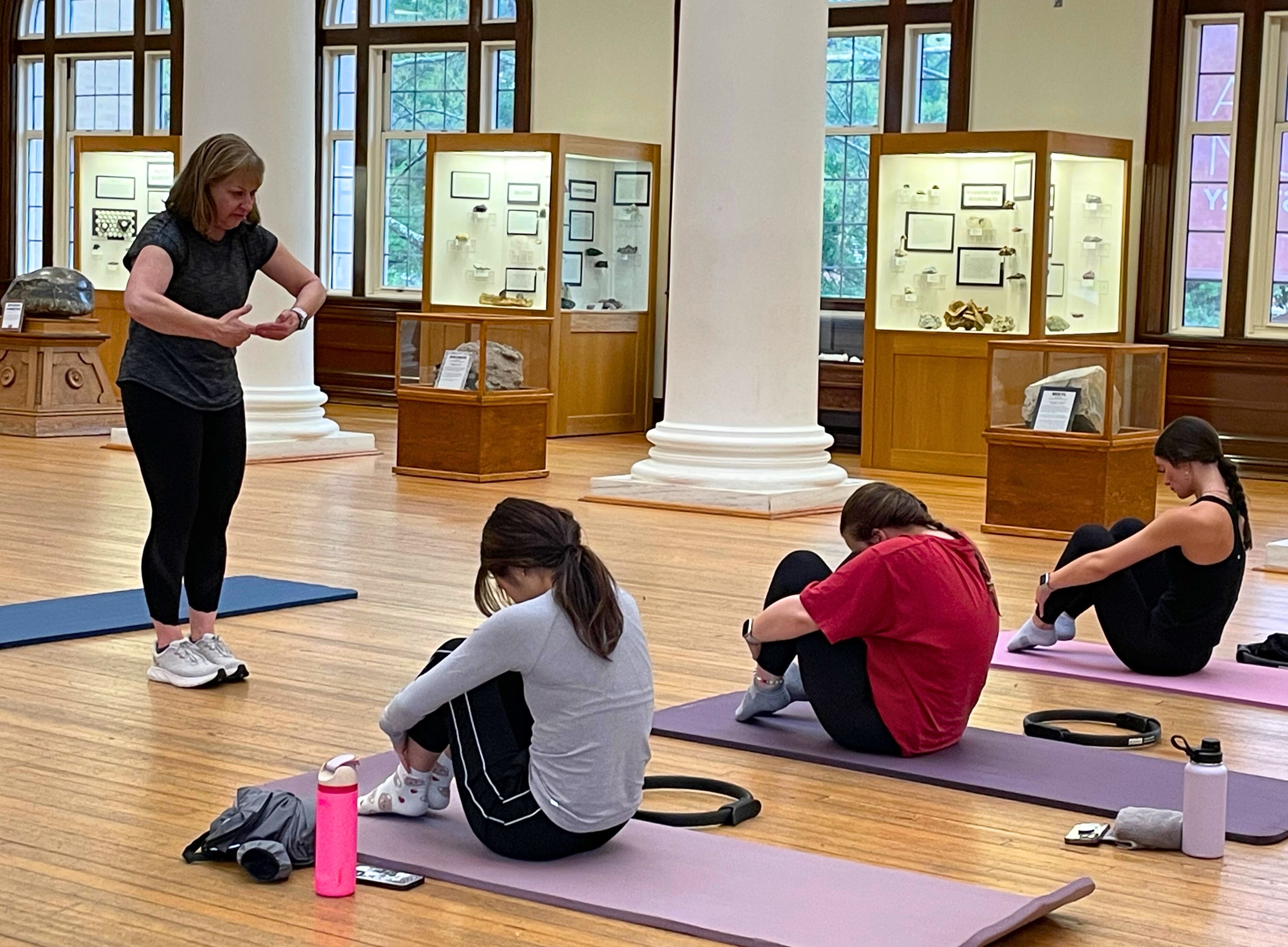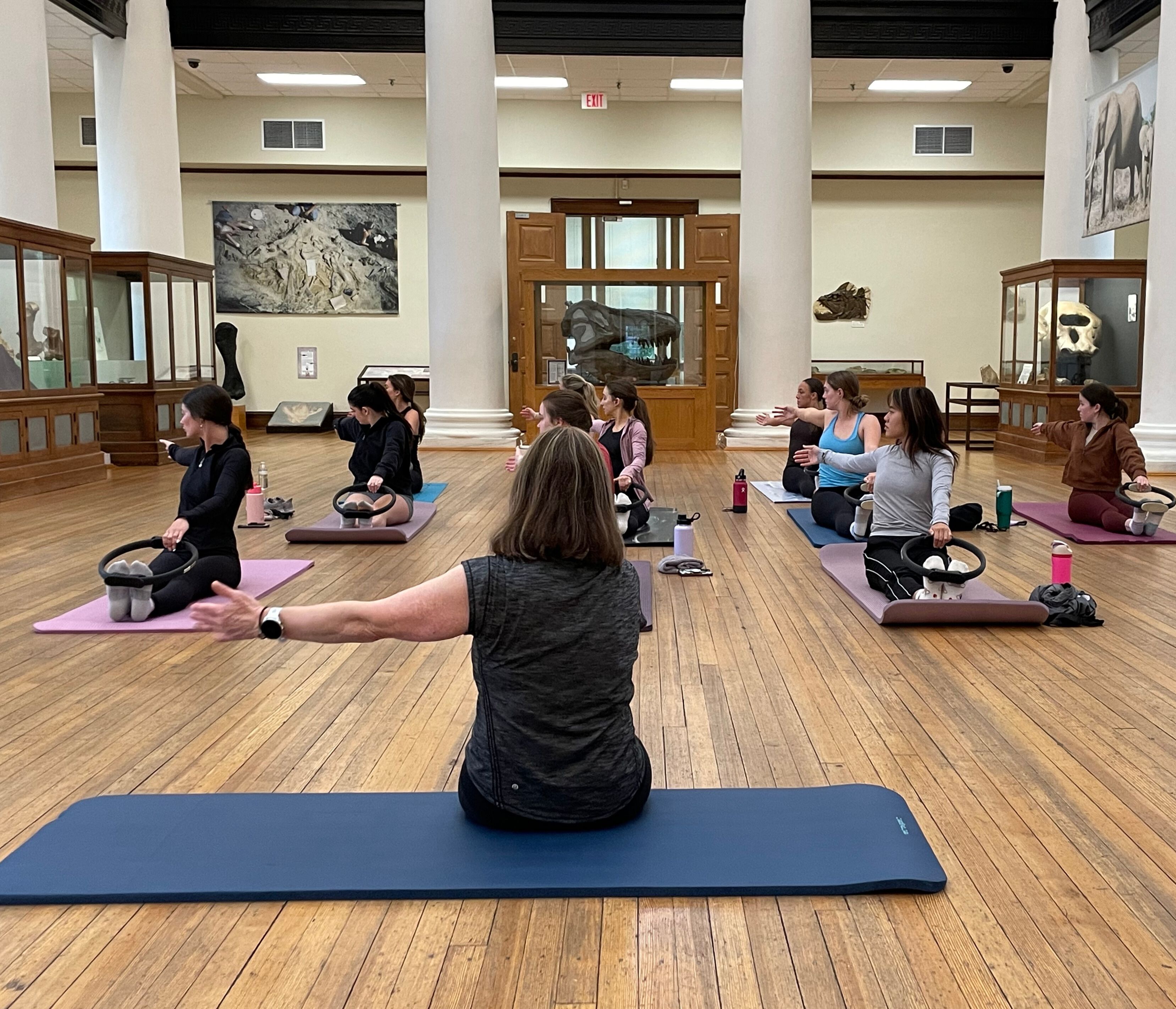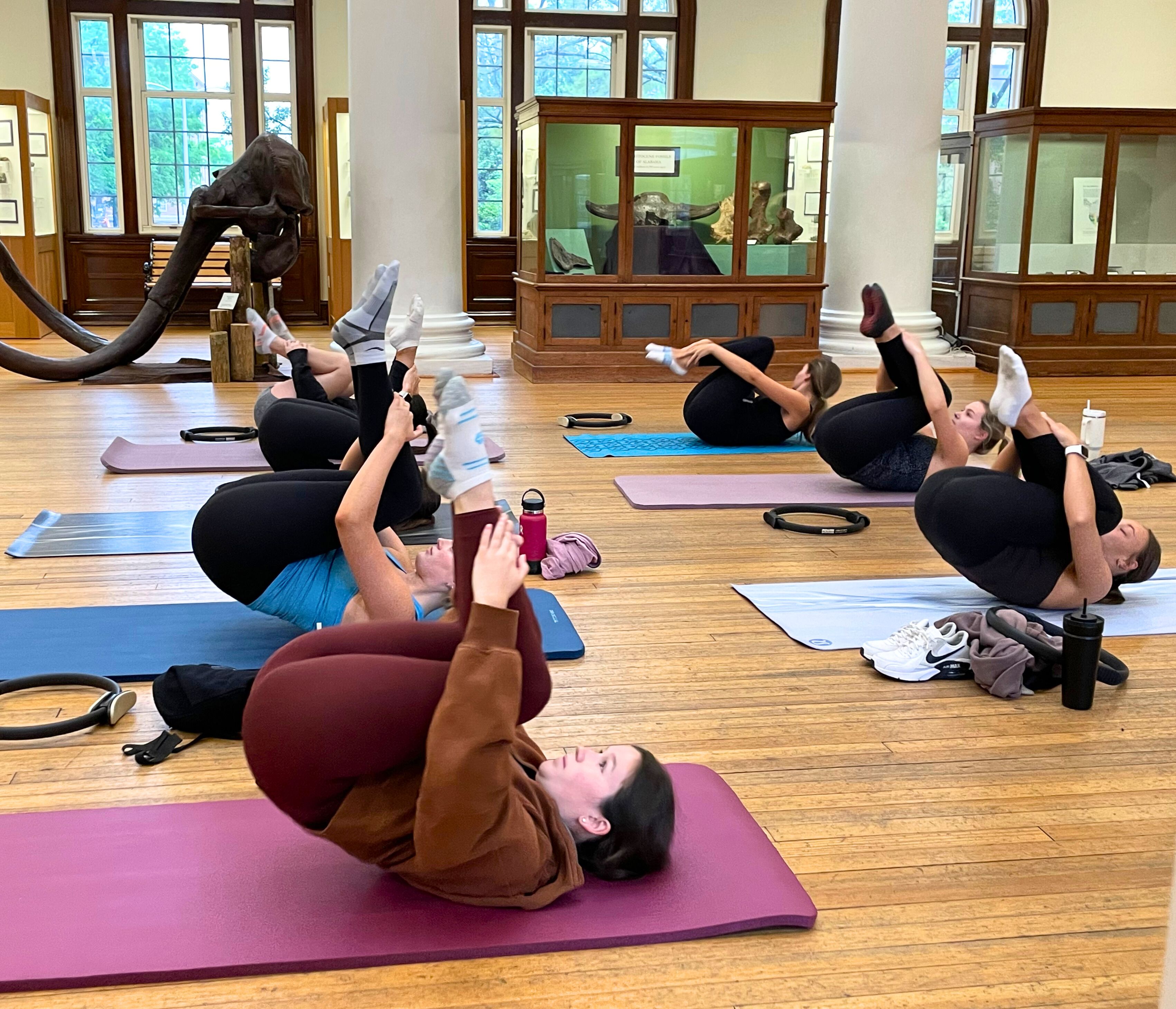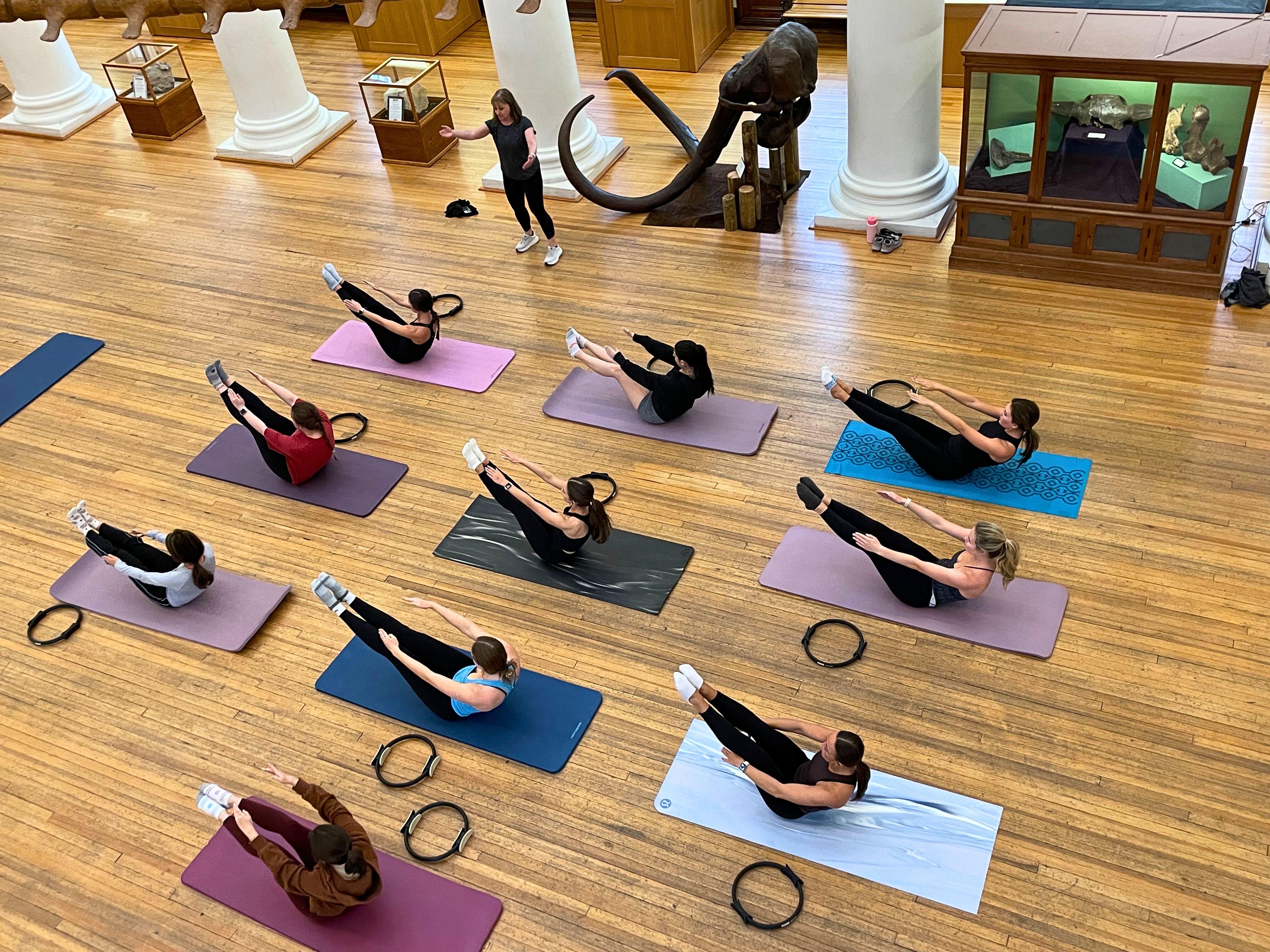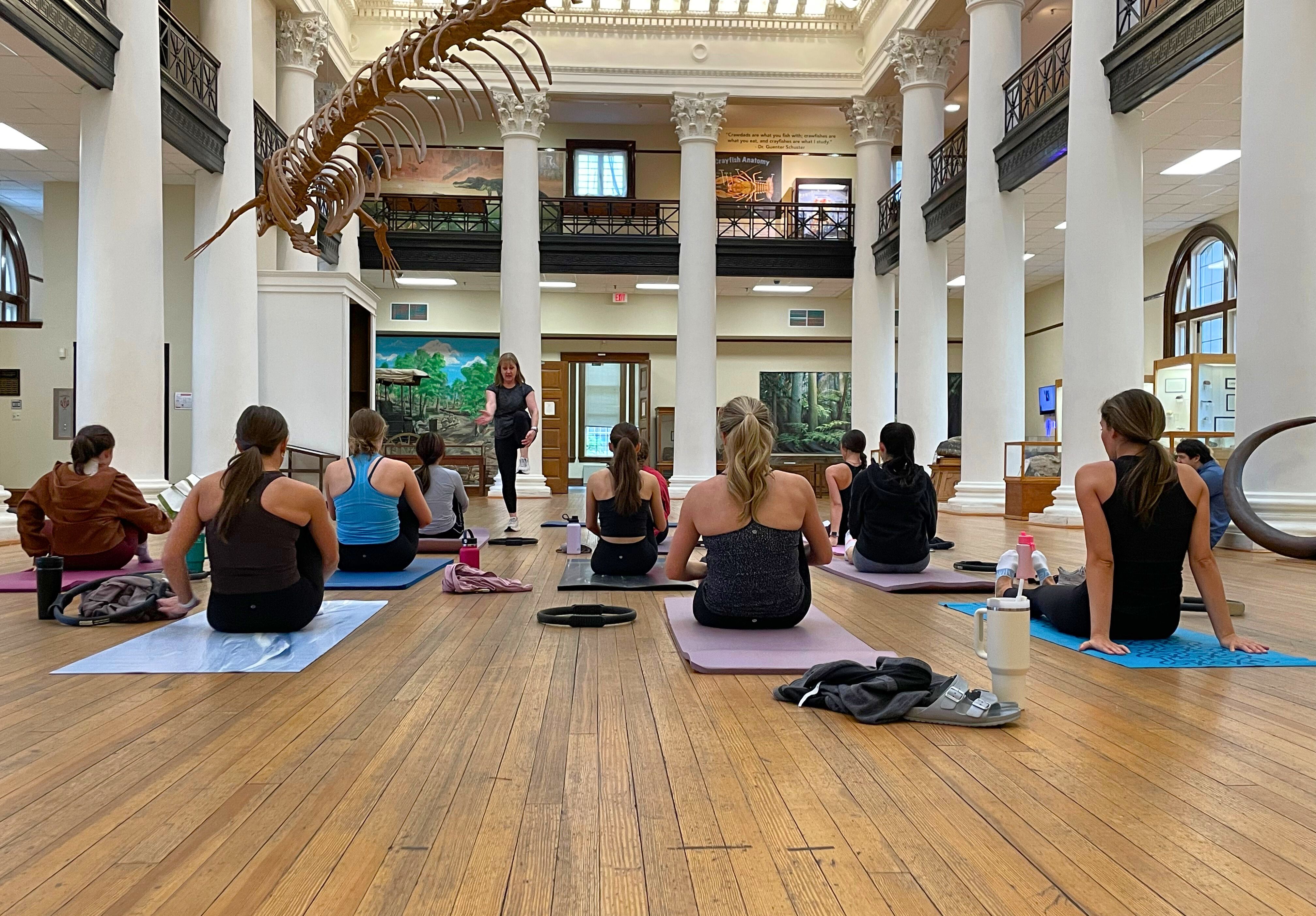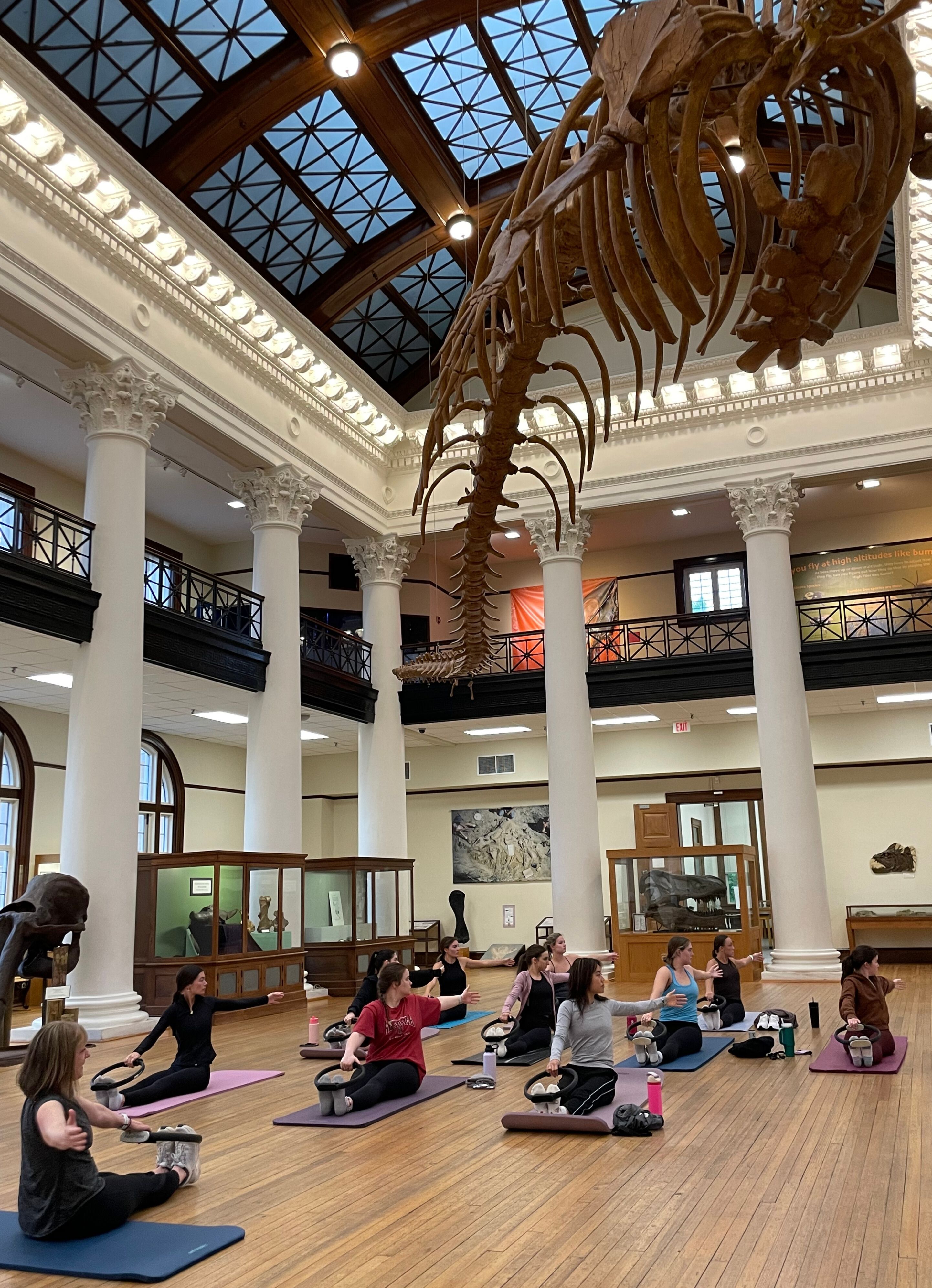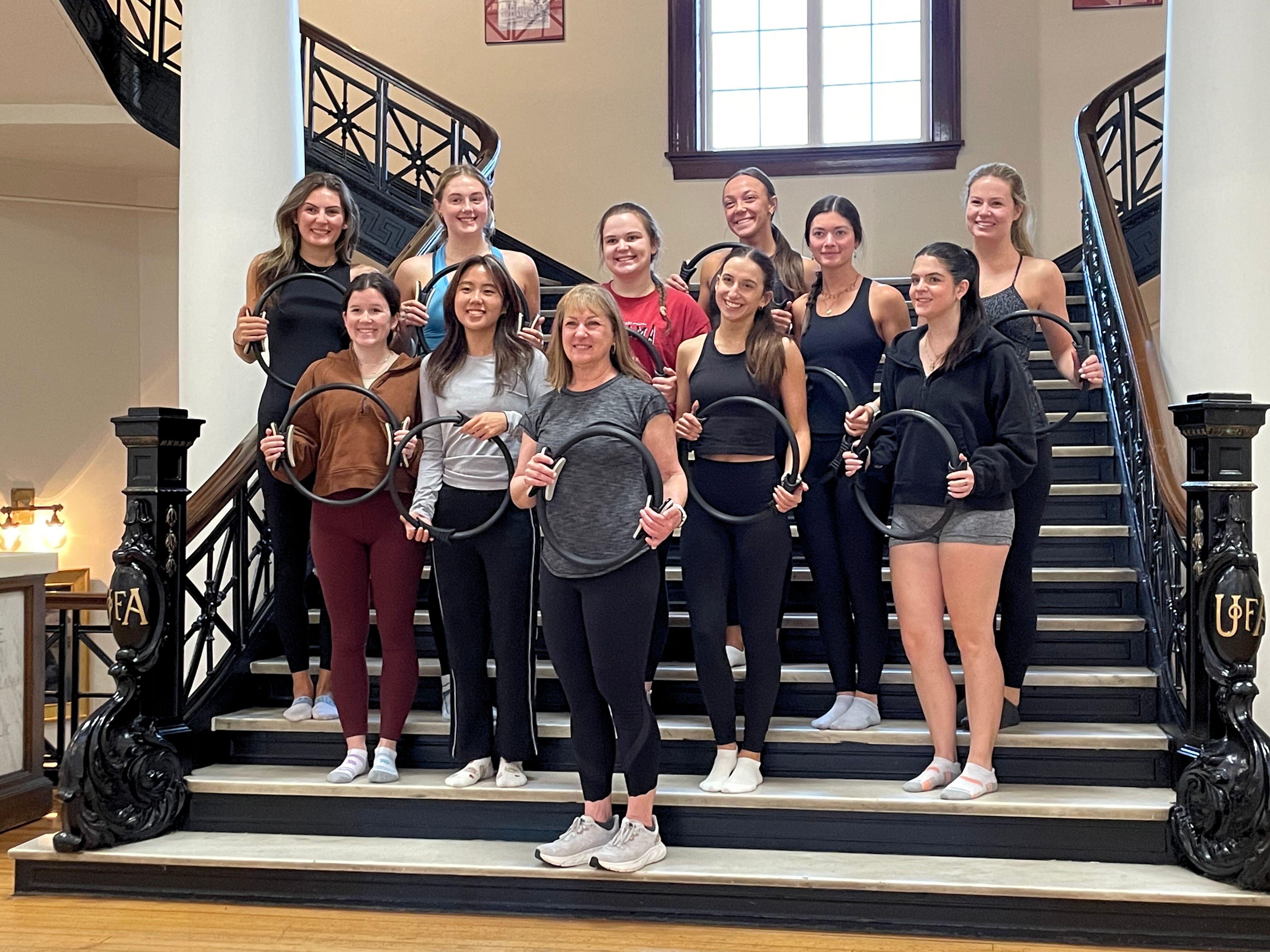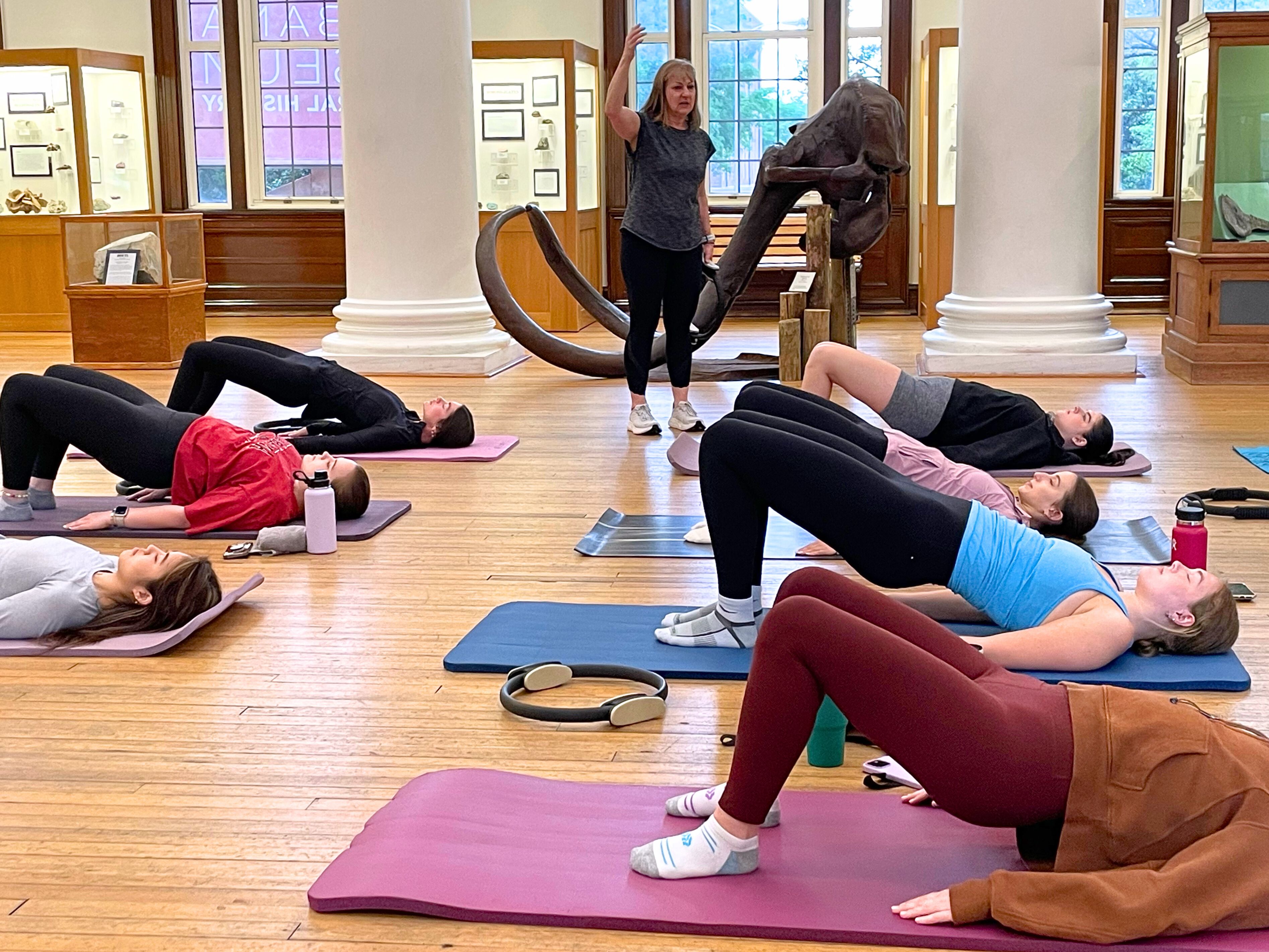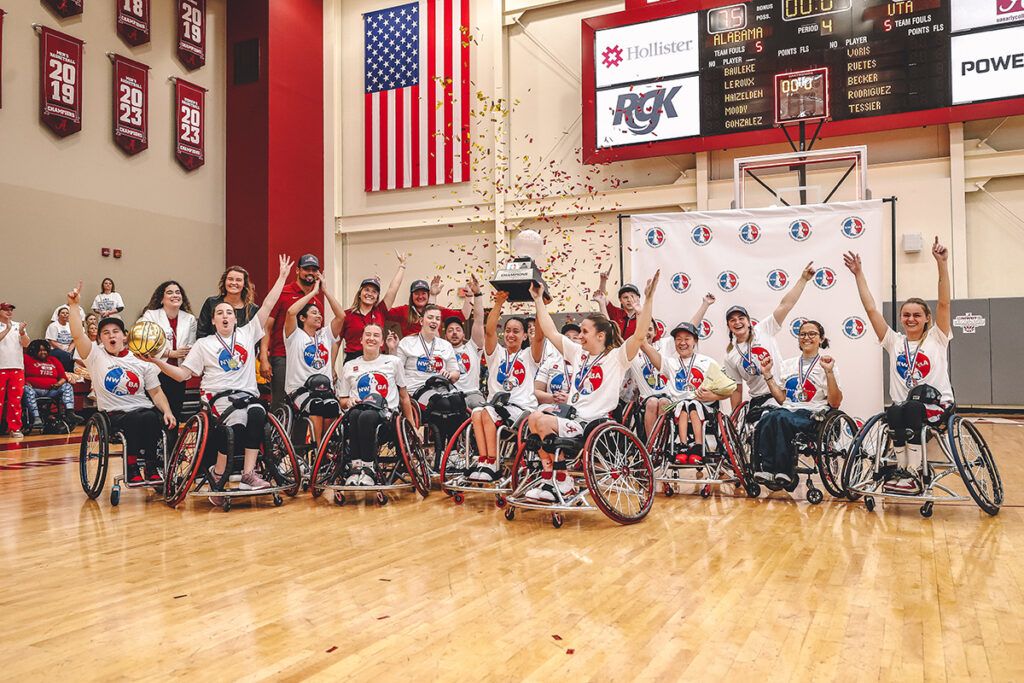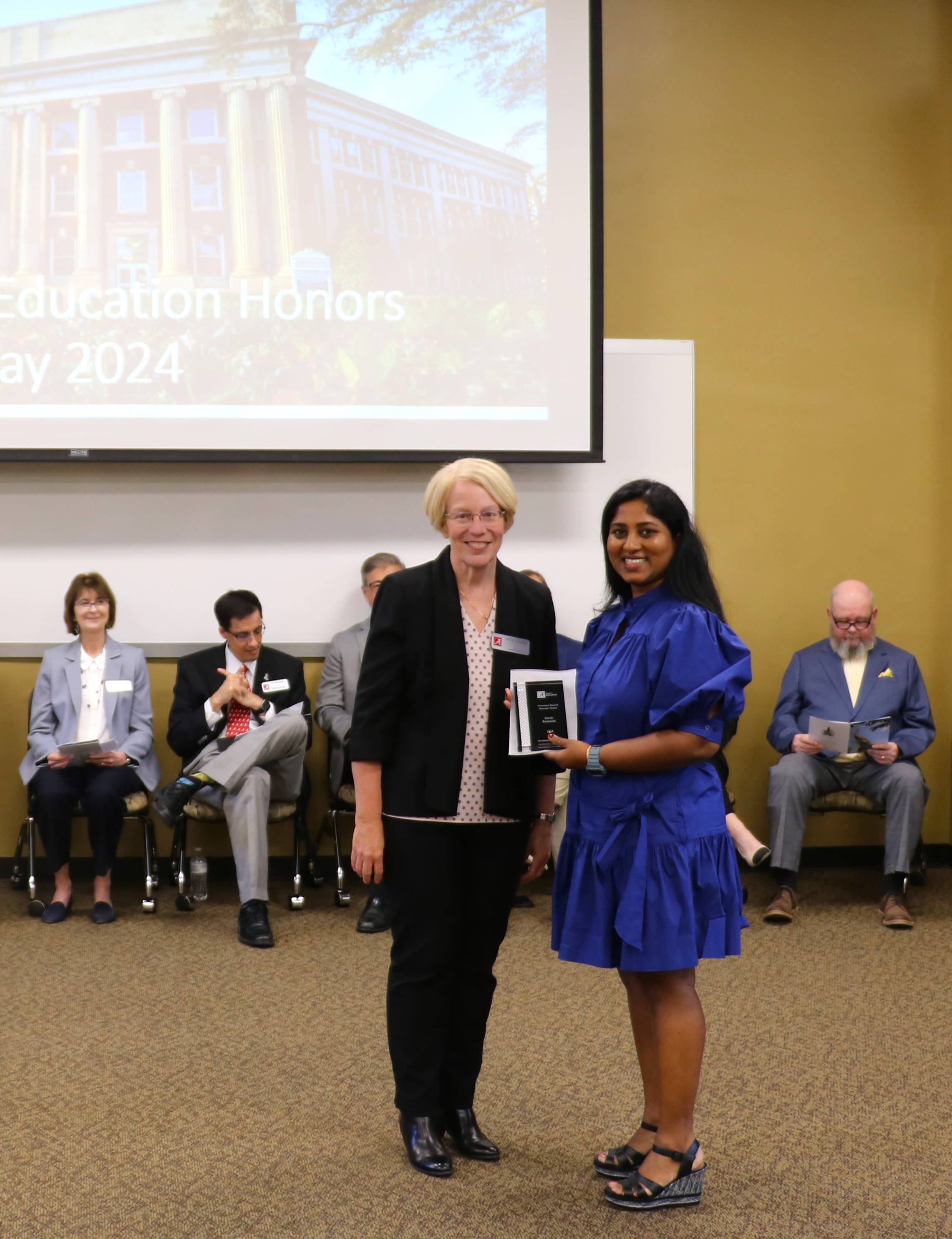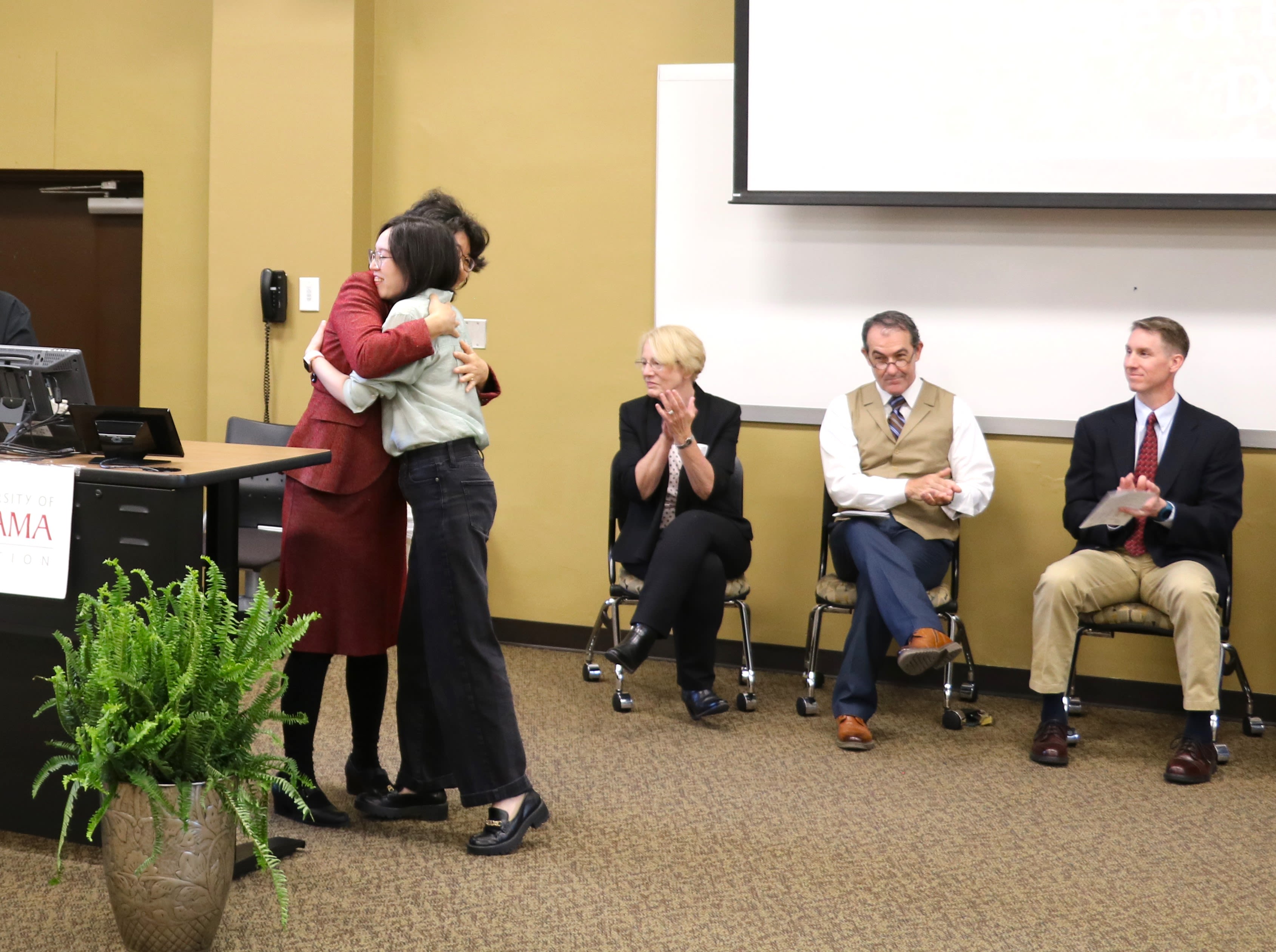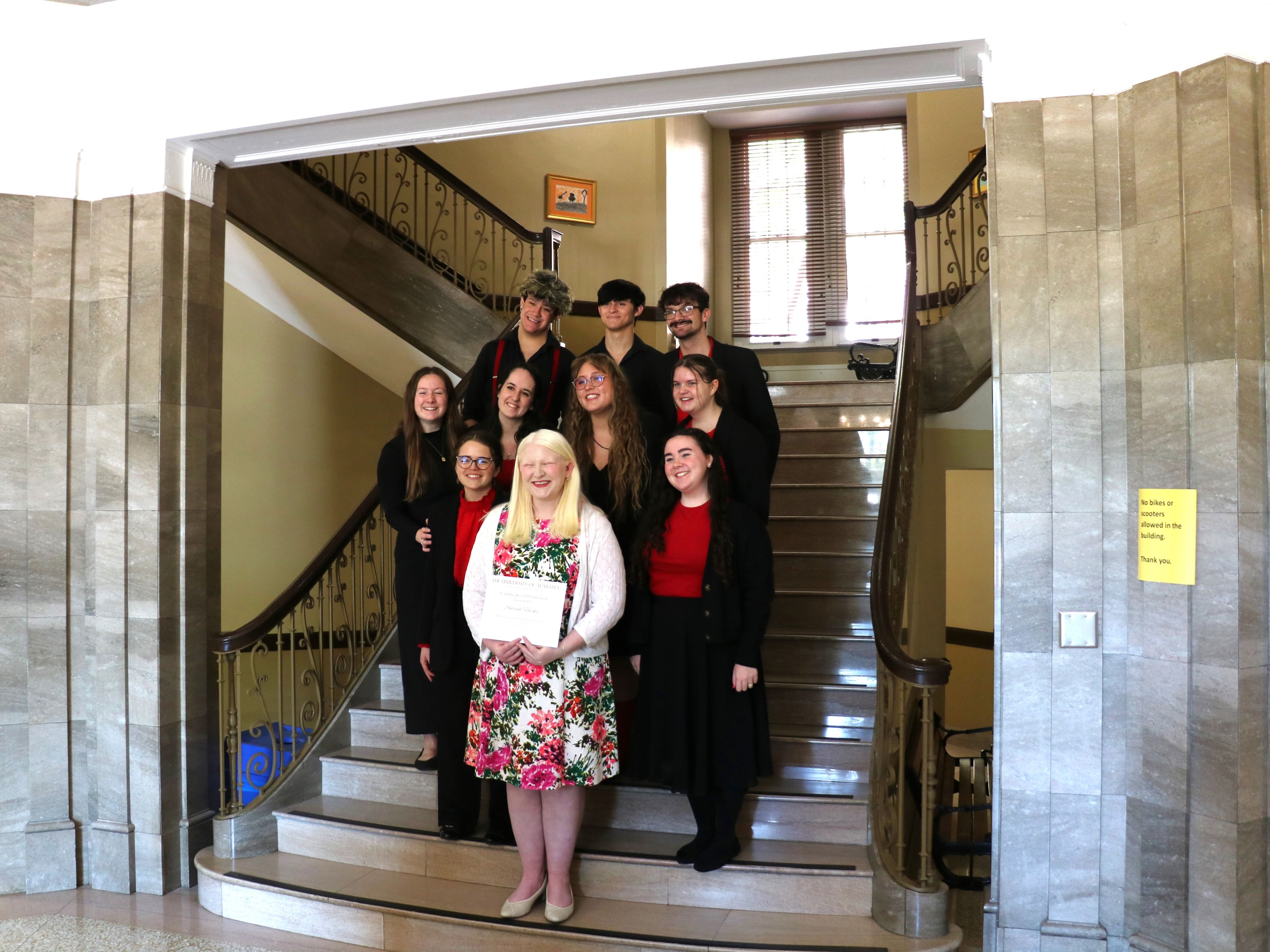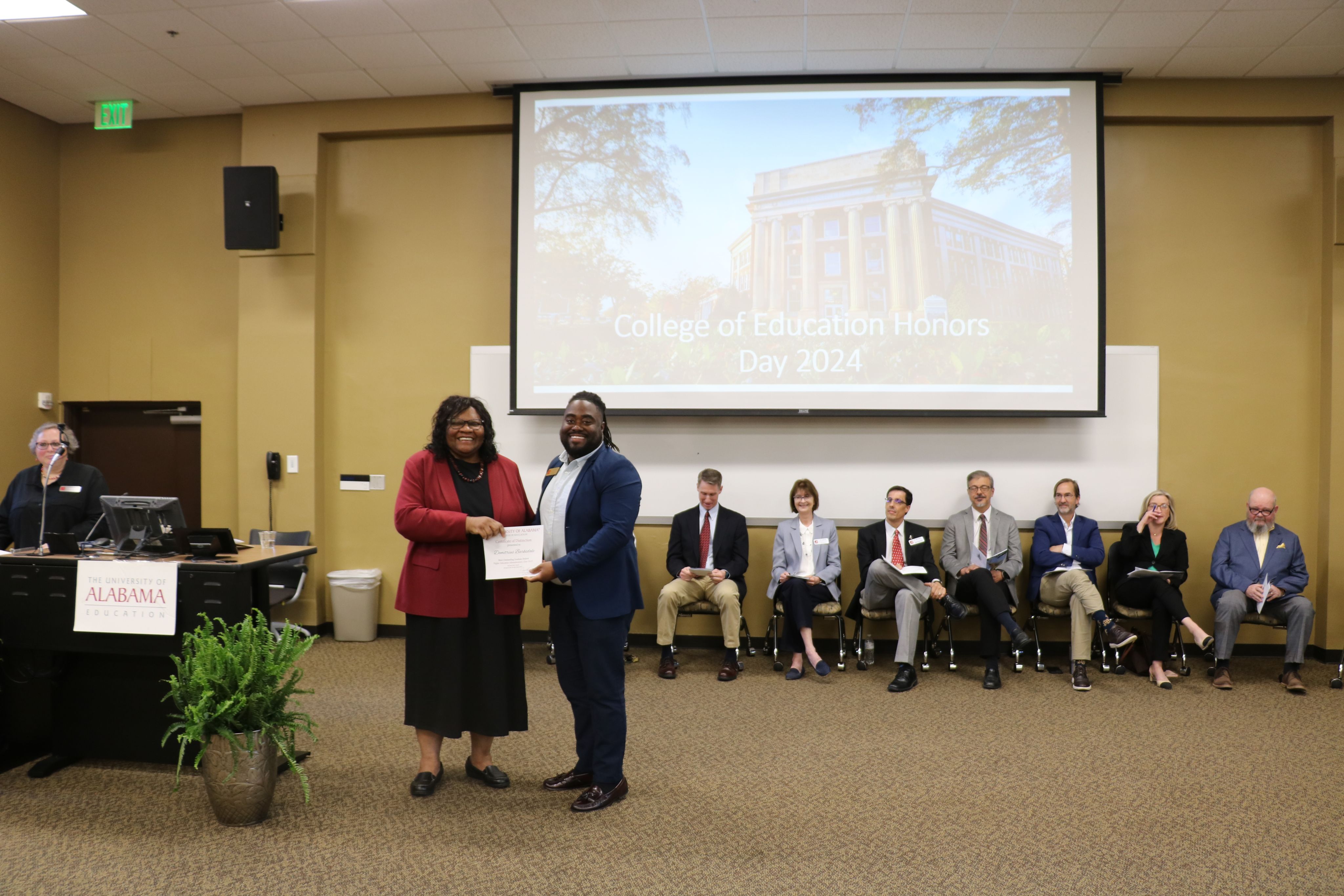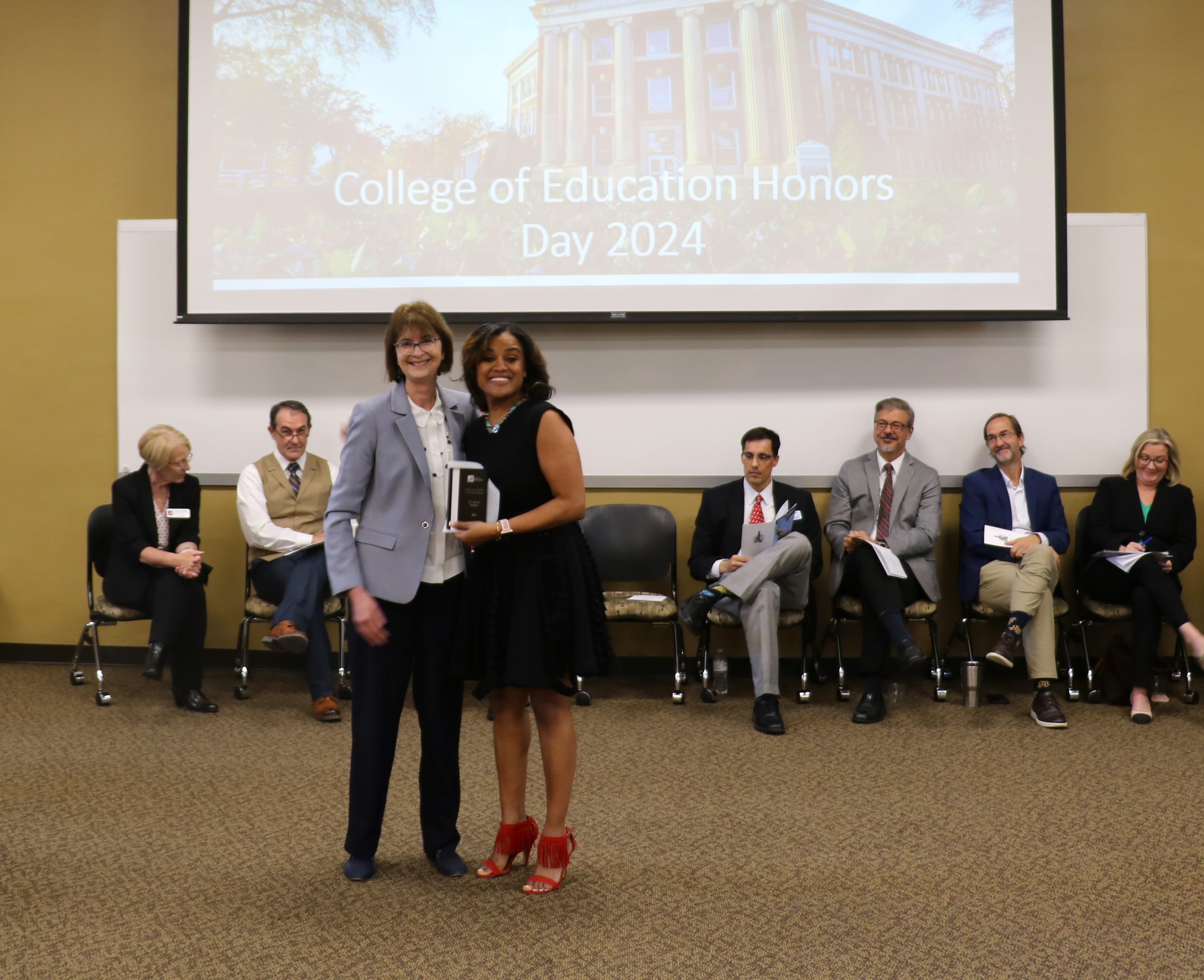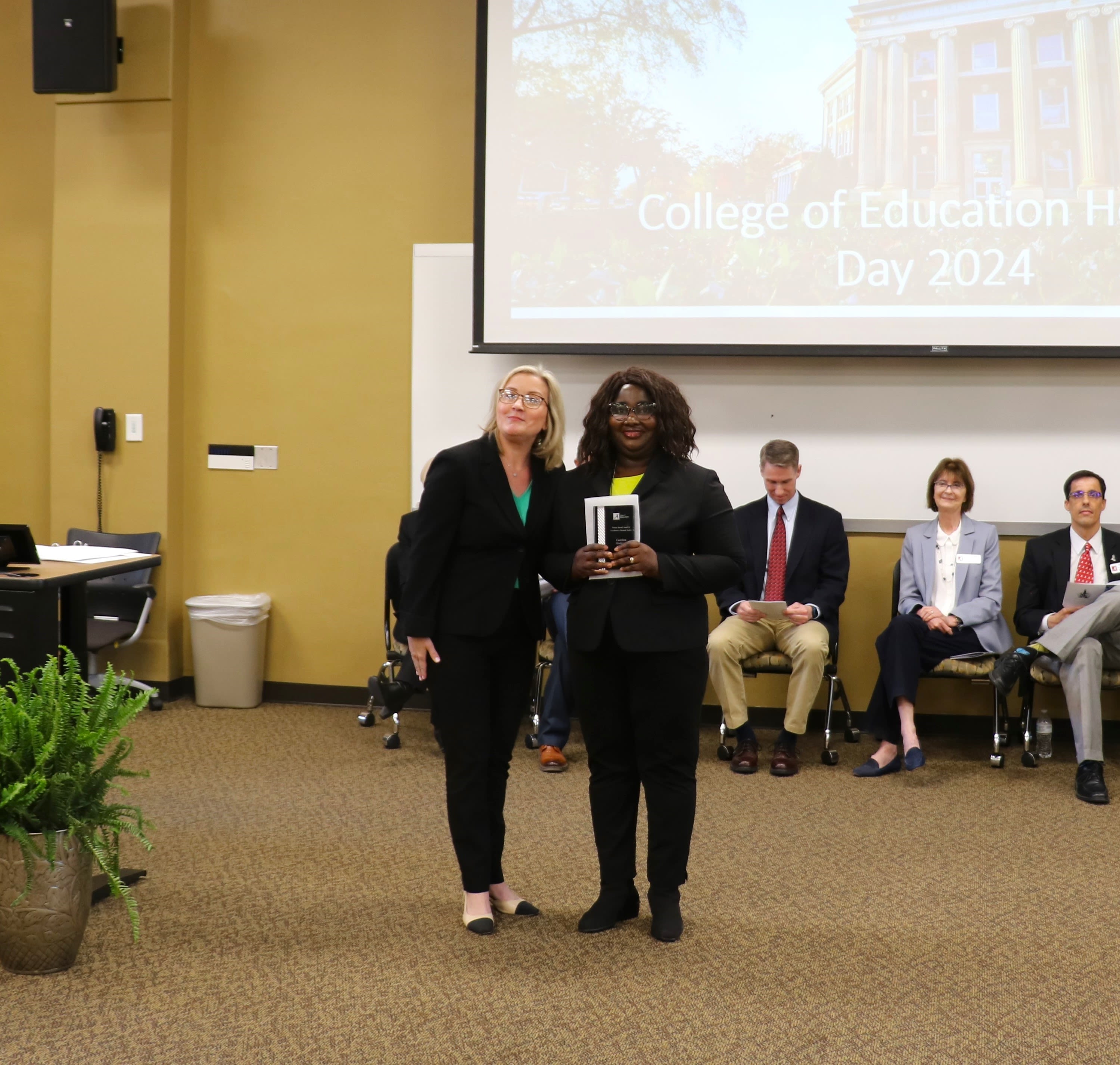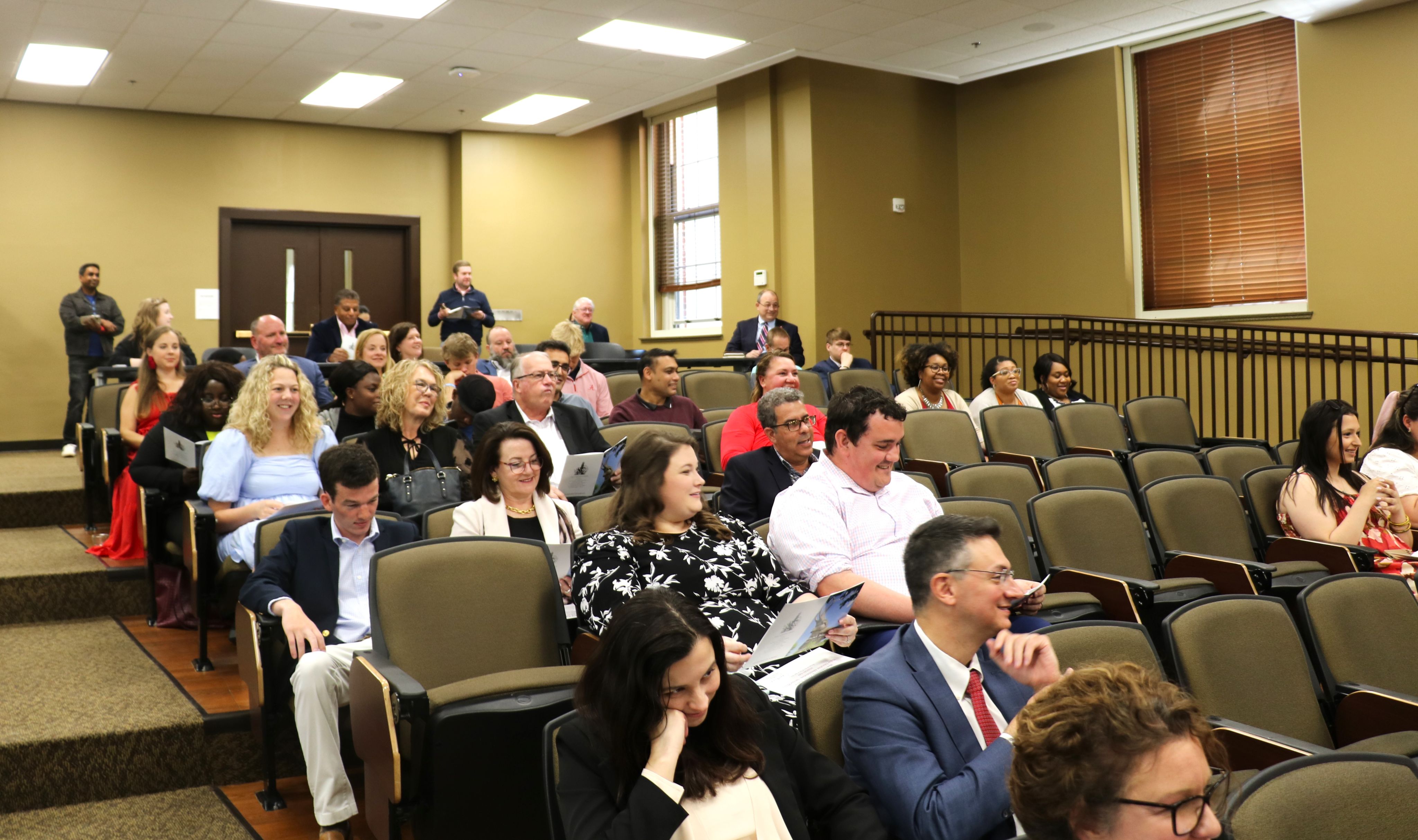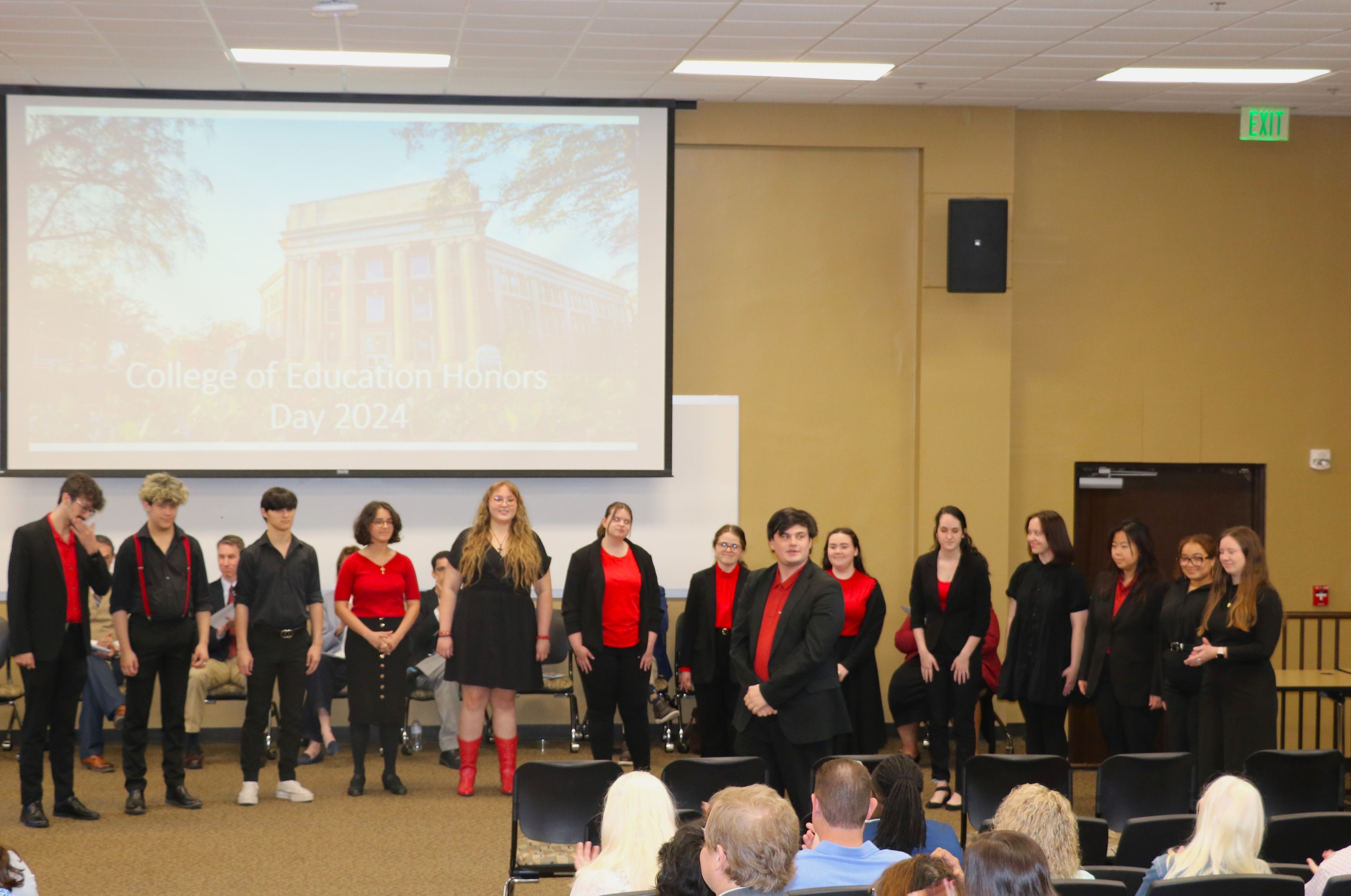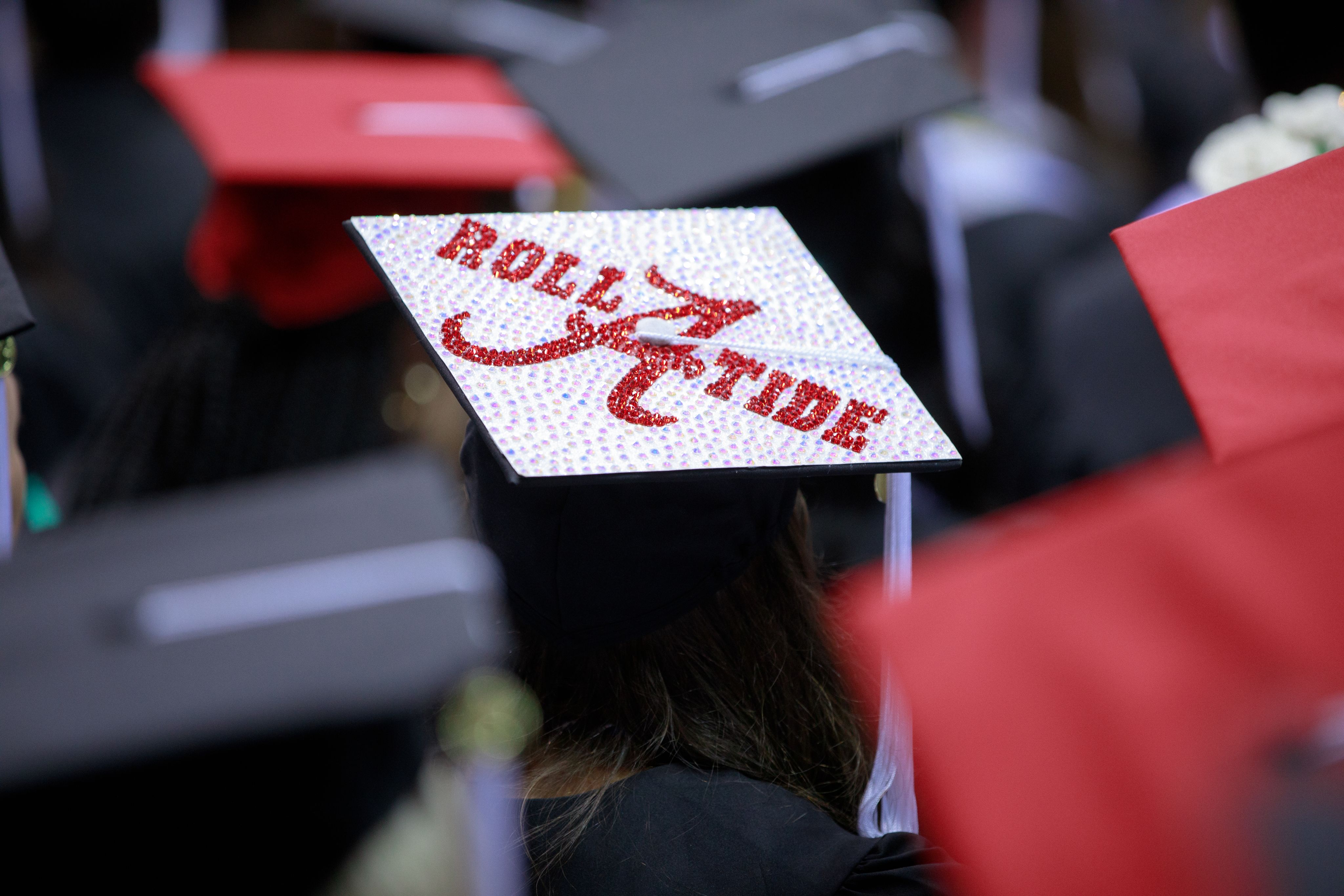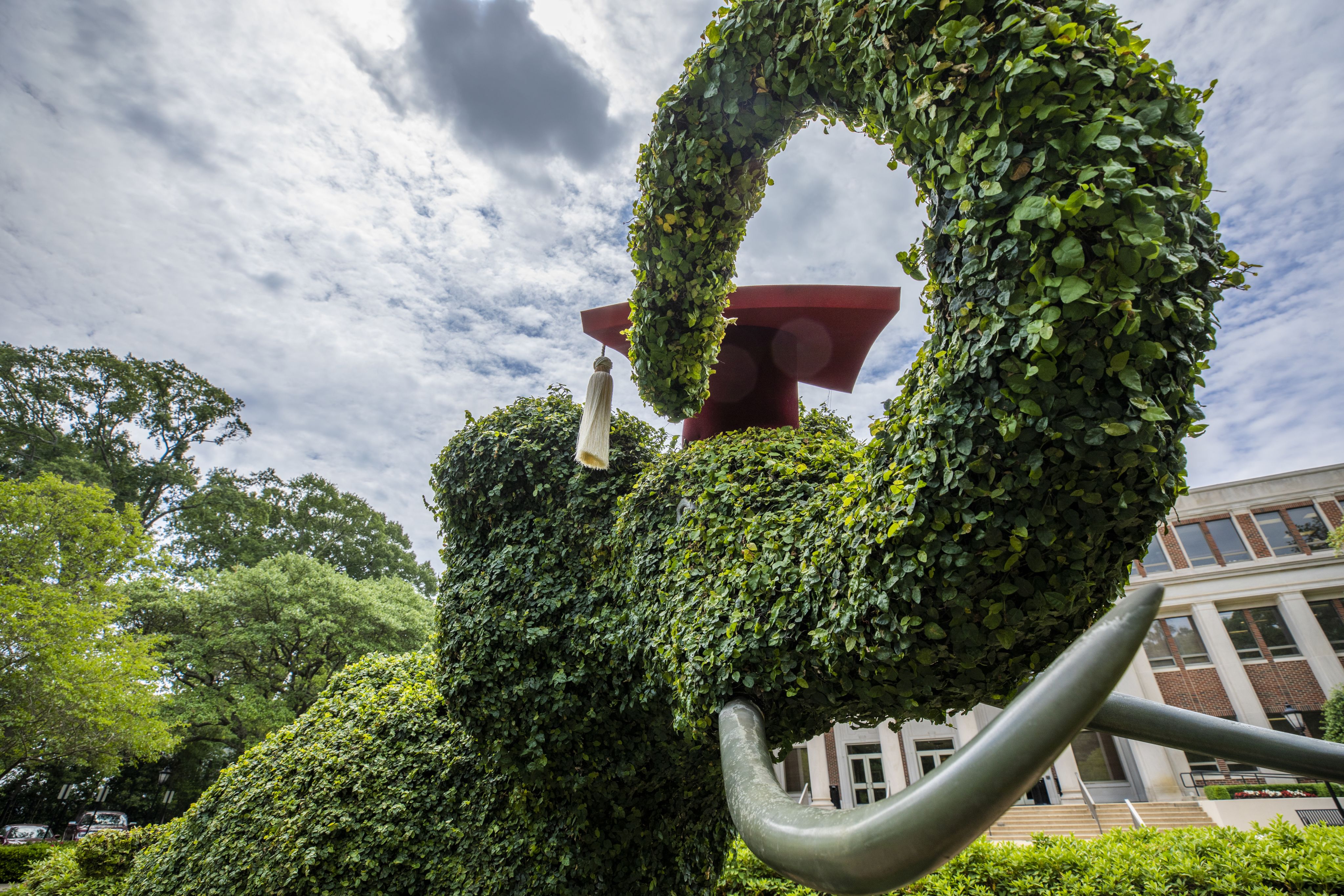

$1.1M grant will help bridge computer science education gap in underserved Alabama communities
Tuscaloosa students get physiological computing experience through its hands-on curriculum
The U.S. National Science Foundation’s Innovative Technology Experiences for Students and Teachers (ITEST) program recently awarded $1.1 million in funding to a grant program that will introduce young students to a hands-on physiological computing curriculum while also giving them a look at what kinds of STEM career opportunities await them in the future.
This three-year project, which begins in May, will work toward bridging the gap that students in underserved communities experience when it comes to computer science education – specifically, for now, in Tuscaloosa City elementary schools. Professional development will be provided to more than a dozen teachers within these schools, equipping them with the knowledge, preparation, and skills needed to teach basic computer science education.
Dr. Feiya Luo, assistant professor of instructional technology, is the grant’s principal investigator, along with co-principal investigators Dr. Chris Crawford, assistant professor of computer science, and Dr. Amy Hutchison, Fayard Family Endowed Chair of Literacy Education.
During the afterschool program, students will gain an understanding of foundational computer science concepts, learn how to work with block-based programming platforms that allow them to interact with visual block coding components instead of typing strings of code, as well as gradually be introduced to aspects of physiological computing.
By using wearable computing devices, students will be able to measure and monitor their own physiological data – in this case, muscle energy – while building block-based computer programs that react to this data in real time. This allows them to observe the ways that physical changes, like flexing their muscles, affect the program.
This helps create a fun, immersive computer science learning experience for the children, which can also make learning more personal, Luo said.
“It’s an innovative way for (them) to learn more about the advanced technologies that are out there,” she said. “It helps them see that they can use their own physiological input and, depending on the state of this data, they can make their computer program react differently.”
But computer science is not just learning how to code, Luo said.
“It’s also about learning how to use the thinking processes that computer programmers use every day then applying that to problem-solving.”
Students will use computational thinking skills to resolve issues throughout the curriculum, but they will also begin applying them outside of the program as well as they work to “debug” everyday problems. Educators who participated in the successful pilot studies last year said they saw a notable difference in their students.
“When observing computer science education in action in the classroom, what the teachers were telling me is that since they introduced the (computer science) term ‘debugging’ to their students, they see more perseverance,” Luo said. “Students are more likely to continue trying when they encounter an error instead of giving up.”
The goal of the grant is to enroll more than 100 elementary-aged students in the program and work with more than a dozen in-service and pre-service teachers to strengthen their knowledge of computer science in order to educate these students. All of this will help better prepare Alabama students for a future full of changing technologies and a workforce that will require STEM- and technology-based careers.
“Many children in Alabama are historically underrepresented,” Luo said. “I am happy that the reviewers and program officer at NSF agree that this is necessary for the state. We really made a strong argument to broaden participation in computing and bring access to underserved communities.
“We don’t want children in Alabama to lag behind when computer science education is more accessible in many other states,” she said.
Drs. Feiya Luo, Chris Crawford, and Amy Hutchison
Drs. Feiya Luo, Chris Crawford, and Amy Hutchison
Dr. Lisa Matherson retiring after 10 years with the College
What first began as a temporary clinical associate professorship with the College of Education for Dr. Lisa Matherson has evolved into a 10-year career filled with lifelong friendships, celebrated accomplishments, and cherished memories.
Dr. Matherson has devoted the last decade of her life to the College, to teaching and research, and to helping faculty and students move forward in their own endeavors. In June, she will move forward in hers and retire after 35 years as an educator.
“For so long, being a teacher, being an educator, is who I have been,” Matherson said. “I'll never stop being an educator, and I'll never stop learning, but just knowing that it won’t be a day-to-day thing anymore – it's going to be a little bit different for me.”
Since 2013, she has continued to teach students as a clinical associate professor of secondary social science, the position she was hired for, and work with teachers in the local schools. She serves as Coordinator of Continuous Improvement for the College and Academic Curriculum Director for the Gandhi-King Scholarly Exchange Initiative.
It may come as a surprise, but teaching is actually Matherson’s second career. She was previously a secretary at Shelton State Community College, which is also where she earned her associate degree in business with a concentration in information science in 1988. She served in that position at Shelton for 11 years in the area of grants and financial aid. During that time, though, she realized she needed to make a change.
“I decided this is just not what I see myself doing for the rest of my career,” she said. “I've always loved learning, and I’ve always enjoyed social studies, so I looked back and thought, ‘That's what I'm going to do.’”
And she did exactly that. In 1997, Matherson went back to school to become a social studies teacher, earning her bachelor’s and master’s degrees as well as her doctorate in education from The University of Alabama.
Her career in education began in 2000, teaching history at Warrior Academy in Eutaw, Ala. In 2002, she was hired at Central High School West and moved to Paul W. Bryant High School when it opened, where she taught for 11 years.
“(The College) really is everything to me. I mean, it truly is,” Matherson said. “It gave me my career, my profession … I am what I am because of the College and the mentors I’ve had here. Without Liza Wilson and Vivian Wright encouraging me, I wouldn’t have gotten my doctorate or had many of the experiences I have.”
Over the years, Matherson has played a key role in several milestones in the College, one of those being a member of the assessment team that helped ensure the College’s outstanding Council for the Accreditation of Educator Preparation (CAEP) accreditation and rating.
“We can say with pride that we passed both (CAEP visits) with zero areas for improvement or stipulations, and that's a rarity,” she said. “We have such great faculty who worked together to make it all happen.”
The University becoming the first institution ever to be awarded the Gandhi-King Scholarly Exchange Initiative grant is another momentous accomplishment, and though Matherson is retiring, she said she will remain heavily involved with the Gandhi-King program and will be project director for its upcoming year.
She also plans to continue teaching and being involved in the College when time allows.
“I adore my team and will miss working with them every day. More than anything, it’s going to be the people I miss,” Matherson said. “(As I retire,) I will take the enjoyment of knowing I had the honor of being here for a decade, working with the people I have, and knowing that I had some impact on helping students and faculty in the College move forward.”
Dr. Aguiar quoted in New York Times article about the risks of using smartphone while walking
Research studies show that doing so can negatively impact your physical health
As we go about our day, the chances of us seeing someone walking around while looking down at their phone are high. Whether walking on campus, at the grocery store, or moving from room to room at home, the majority of us do it at some point or another.
An article published by the New York Times earlier this year titled “When You Stroll and Scroll, Hazards Abound” took a look at some of the dangers that can stem from being distracted by our smartphones when out and about, such as a heightened likelihood of injury or accident, poor posture, or a negative impact on our mental health.
Not only do we become less aware of what happens around us, but our walking pace slows as well. In fact, one statistic included in the article states that, according to video footage, pedestrians who are on their phones walk about 10% slower than those who are not.
UA Department of Kinesiology's assistant professor of exercise science Dr. Elroy Aguiar is featured in the article and emphasizes how this can take a toll on your physical health, especially if walking makes up a large amount of a person’s physical activity throughout the day. This slowed walking speed can have negative repercussions on health-related fitness, he says.
In two recent papers, Dr. Aguiar and his colleagues examine the relationships between walking cadence and physical activity intensity, finding through their research that certain paces or speeds of walking allow you to achieve moderate or vigorous intensities, which are known to be associated with better health outcomes.
“Our studies have shown that walking at a pace of 100 steps per minute, or about 3 mph, corresponds to moderate intensity, which is ideal,” Aguiar said. “If the number of steps you take is 100 or above, then you are walking at an intensity that will give you better health benefits.
“Spending your time distracted on your phone while walking slows you down – if you fall to a pace or speed that is below these thresholds, you won’t get the ideal amount of health-related benefits,” he added.
As you reach those optimal speeds, your heart rate as well as your oxygen uptake increases. Expending energy through walking is incredibly beneficial to your health, particularly for those who may not have time or the physical ability to run or go to the gym.
“Some people don’t think of walking between places as an opportunity for exercise, but it actually is. Physiologically, there is no difference between walking for exercise, walking to class, or walking to your car after work,” Aguiar said.
If you think about every movement as an opportunity for exercise, he said, it will make you more conscious of your decisions. Taking advantage of these small opportunities for exercise and spreading them out throughout the day will help improve your walking volume and intensity.
Aguiar recommends reducing distractions, putting the phone away, and trying to include as much walking as possible at the right intensity, even if it’s just parking your car a little farther away or walking somewhere for lunch.
“Research shows that following exercise, there is a boost in mood, cognition, memory, attention span, processing speed, and overall executive function,” he said. “So, if you are thinking about walking to class or to the office, that will increase blood flow to your brain, which is associated with better cognitive function. Every move counts!”
“Cadence-based classification of moderate-intensity overground walking in 41- to 85-year-old adults,” Elroy J. Aguiar, Jose Mora-Gonzalez, Scott W. Ducharme, Christopher C. Moore, Zachary R. Gould, Colleen J. Chase, Marcos A. Amalbert-Birriel, Stuart R. Chipkin, John Staudenmayer, Peixuan Zheng, Catrine Tudor-Locke
“Classification of moderate-intensity overground walking speed in 21- to 85-year-old adults,” Peixuan Zheng, Scott W. Ducharme, Christopher C. Moore, Catrine Tudor-Locke, and Elroy J. Aguiar
Dr. Elroy Aguiar
Dr. Elroy Aguiar
Published student authors Tylor Gee and Jennifer Gutierrez with their books.
Published student authors Tylor Gee and Jennifer Gutierrez with their books.
Gutierrez with her friends and family.
Gutierrez with her friends and family.
Gee with his friends and family.
Gee with his friends and family.
Celebrating Young Authors
Central High School students shine as published writers, an accomplishment that was made possible by the COE PIE Grant
On April 19, two Central High School students were recognized for their exceptional achievement as published authors. Tylor Gee, a 12th-grade student, and Jennifer Gutierrez, an 11th-grade student, showcased their talent and dedication through their books. With the guidance of their teacher Rachael James and professor Dr. Latrise P. Johnson, the young authors received valuable support. Dr. Johnson, writer and associate professor of English Language Arts, and James, writer and ELA teacher, provided expert assistance in revising, formatting, and publishing the students' books.
Gee's book, The Busy Devil, and Gutierrez's book, Chaos Circus, represent the culmination of their hard work and creativity. The books were made possible through a Partners in Education Mini Grant from The University of Alabama's Office of School Partnerships. The recognition of Gee and Gutierrez as student authors is a testament to their passion for writing and their commitment to pursuing their dreams. Their achievement serves as an inspiration to other students, demonstrating that with determination and the support of dedicated educators, anything is possible.
The book launch celebration was held in the school's library, where friends, family, and members of the school and University communities gathered to honor the young authors. The atmosphere was filled with joy and pride as the students shared their inspirations, writing journeys, and aspirations with the audience. This event not only celebrated the individual achievements of Gee and Gutierrez but also highlighted the transformative power of education and the importance of nurturing young talent. It is a testament to the dedication of the teachers, the support of the school, and the limitless potential of students when given the opportunity to explore their creativity and express themselves through writing. Both students plan to continue writing and are both working on new book projects.
Future Teachers Day 2024
On April 3, the College of Education hosted Future Teachers Day for more than 100 visiting high school students. Students were treated to a cookout lunch — special thank you to Wayne Chapman, husband of Jacky Chapman in Student Services, for grilling the hotdogs — in the Autherine Lucy Hall courtyard. During their campus visit, the high school students got a chance to learn more about the College's Teacher Education programs and posed for photos with Big Al!
Teach In Bama program
signs first school districts
The College of Education's Teach in Bama is committed to identifying and supporting the next generation of exceptional teachers and keeping them in Alabama’s classrooms.
Read the full UA News article here.
Inservice Center will host summer learning sessions
This summer, the UA/UWA Regional Inservice Education Center and ALSDE regional initiatives are offering more than 150 learning opportunities to any professional public-school teacher, school or district administrator, or school board member in the UA/UWA Inservice Center region. Most online offerings are open to educators throughout Alabama.
2024 Summer Professional Learning Sessions are listed here while registration instructions can be found here. If you have any questions or need additional information, please email UA-UWA Regional Inservice Center Director Dr. Holly Morgan at hgmorgan@ua.edu or call 205-348-3319.
Honors & Achievements

Dr. David Walker
Dr. David Walker
UA center named one of the leading character education entities in the U.S.
The UA Center for the Study of Ethical Development was among the premier character education institutions in the U.S. represented at a prestigious event hosted by the Jubilee Centre for Character & Virtues.
This workshop was aimed at promoting collaborative research and practice efforts dedicated to character development and human flourishing and featured the nation’s leading character education centers and organizations.
Dr. David Walker, director of the Center for the Study of Ethical Development, attended the event, which took place March 14-15 at the Harvard Faculty Club in Boston.
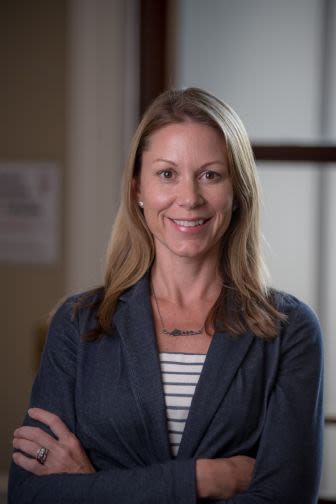
Dr. Sara McDaniel
Dr. Sara McDaniel
Dr. McDaniel wins 2024 President's Faculty Research Award
Earlier this month, Dr. Sara McDaniel, professor of special education, was named the 2024 President's Faculty Research Award winner, a celebration of her leadership and excellence in research.
McDaniel received a Mid-Career honor in the area of Social & Behavioral Sciences and was recognized during the President's Faculty Research Award Ceremony at the Bryant Conference Center on Monday.
The President's Faculty Research Award was created in 2015 to honor and acknowledge outstanding faculty researchers from across the University's colleges and schools.
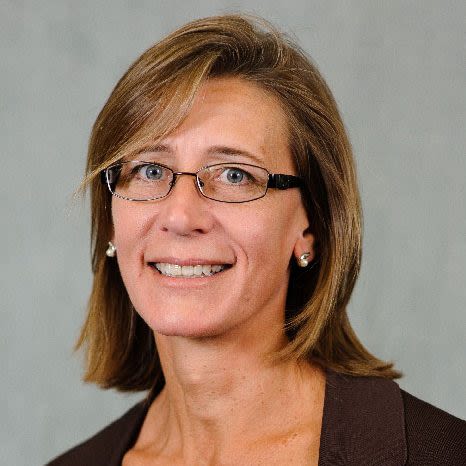
Dr. Carol Donovan
Dr. Carol Donovan
Dr. Donovan receives community scholar award, showcases UA CALT work at roundtable event
Professor of Literacy Education Dr. Carol Donovan received the 2024 Distinguished Community Engaged Scholar Award for Faculty at the Council for Community-Based Partnerships luncheon on April 11.
This award recognizes individuals who have gone above and beyond in support of community-based partnership projects or whose work demonstrates superior understanding, appreciation, and support of community-based partnership efforts.
Dr. Donovan also led an important roundtable event on March 28 that showcased her great work with UA CALT. Sen. Katie Britt, Louisiana Sen. Bill Cassidy, and Dyslexia Resource Center Board Member Dr. Laura Cassidy were all in attendance. Participants shared their stories and the program's impact on their abilities to support K-12 students with dyslexia.
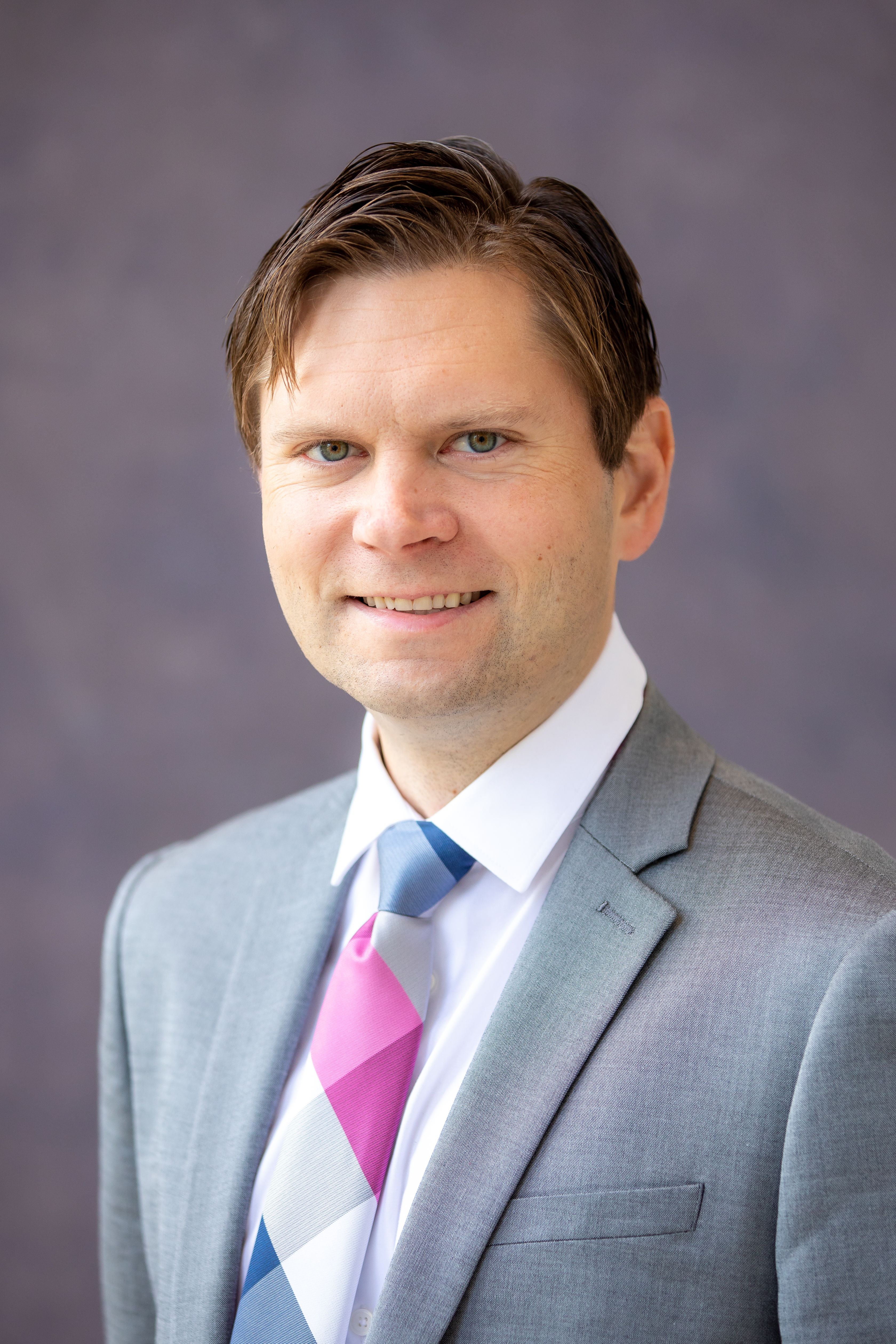
Dr. Michael Sulkowski
Dr. Michael Sulkowski
Article on benefits of CPTED featured in top School Psychologist publication
An article co-authored by Drs. Michael Sulkowski, James Pyle, and Daniel Lamoreaux was published in the March/April 2024 edition of Communiqué, the National Association of School Psychologists' most popular publication. It is also the most widely circulated publication in the field of School Psychology.
“Schools or Fortresses? A False Dichotomy” takes a look at how crime prevention through environmental design (CPTED) is more consistent with best practices for preventing school violence than traditional hardening measures.
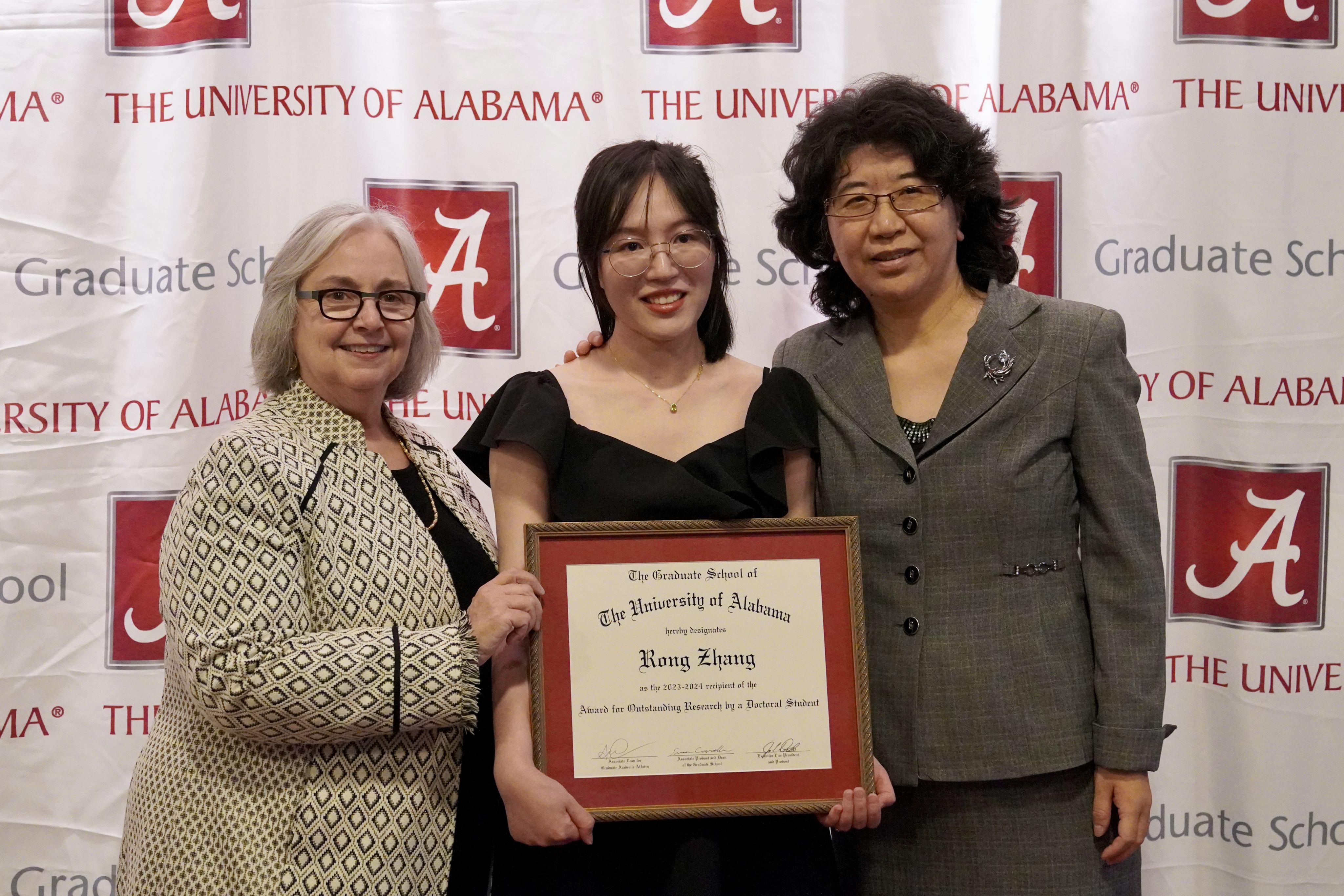
From left: Dr. Susan Carvalho, Rong Zhang, and Dr. Jingping Sun
From left: Dr. Susan Carvalho, Rong Zhang, and Dr. Jingping Sun
Rong Zhang earns Outstanding Research by Doctoral Student award
Educational leadership doctoral student Rong Zhang was named the winner of the 2023-24 Award for Outstanding Research by a Doctoral Student by the UA Graduate School for her impressive work and dedication to her research.
She and her fellow 2023-24 honorees were recognized at a recent reception held at the Dinah Washington Cultural Arts Center by the Graduate School.
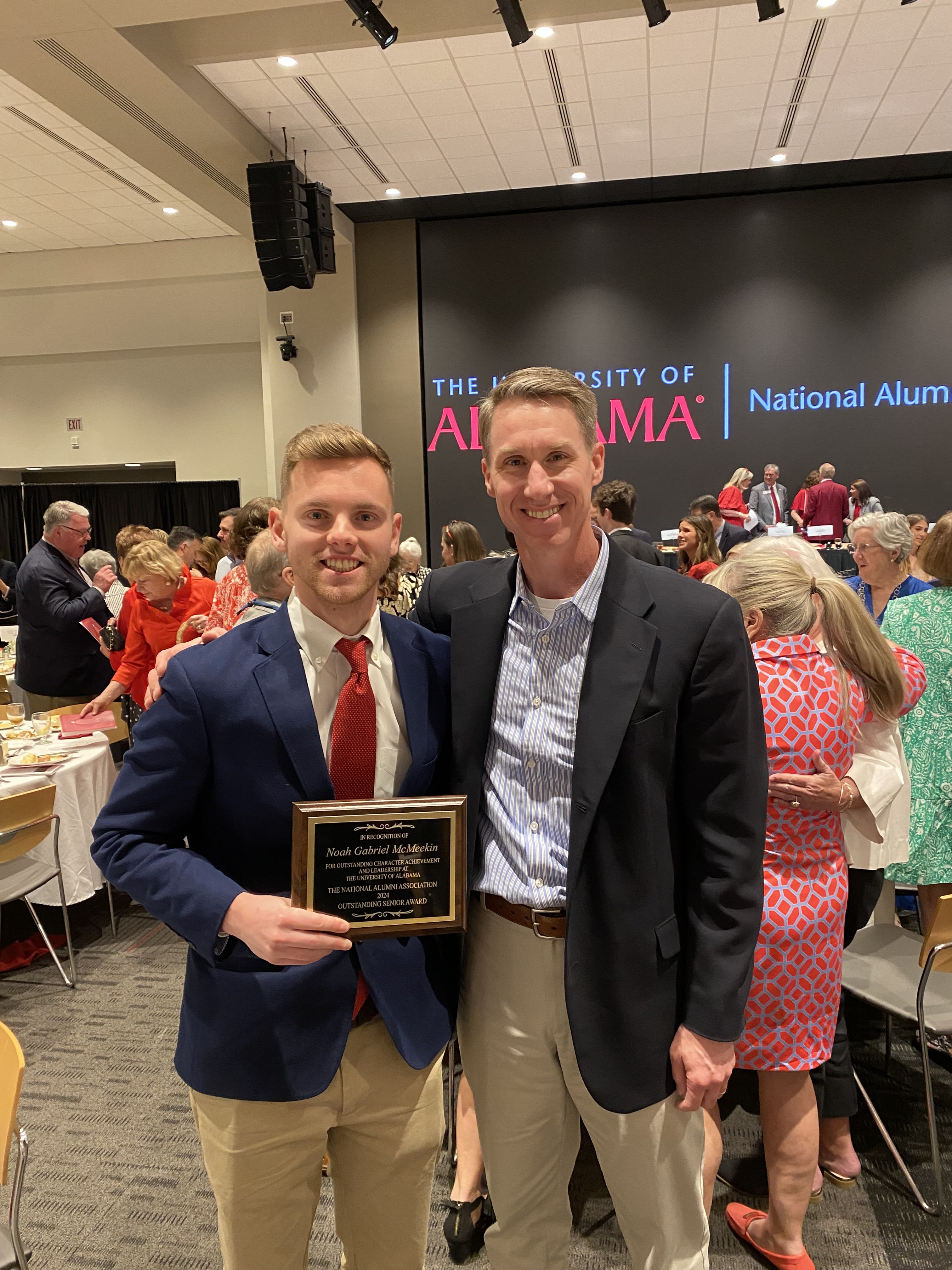
Noah McMeekin and Dr. Jonathan Wingo
Noah McMeekin and Dr. Jonathan Wingo
Exercise Science student wins 2024 Outstanding Senior Award
On April 13, exercise science student Noah McMeekin received the 2024 Outstanding Senior Award during this year's University of Alabama National Alumni Association Awards Ceremony.
McMeekin, along with nine others from across UA, was recognized for his consistent demonstration of exceptional leadership and achievement as well as personal character.
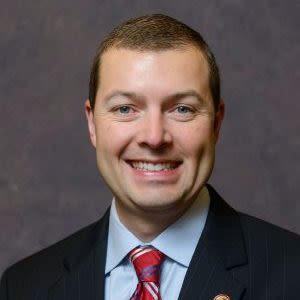
Darrell Hargreaves
Darrell Hargreaves
Hargreaves headed to Paris to work the 2024 Paralympic Games in the fall
Darrell Hargreaves, associate director of recreation facility operations, adjunct with the Kinesiology Department, and graduate student in the higher education administration program, will work at the Paris 2024 Paralympic Games in the sport of wheelchair basketball in the fall.
Earlier in the spring, he also worked the 2024 State Finals as well as the Division II 2024 Gulf South Conference Men's Basketball Championship tournament.
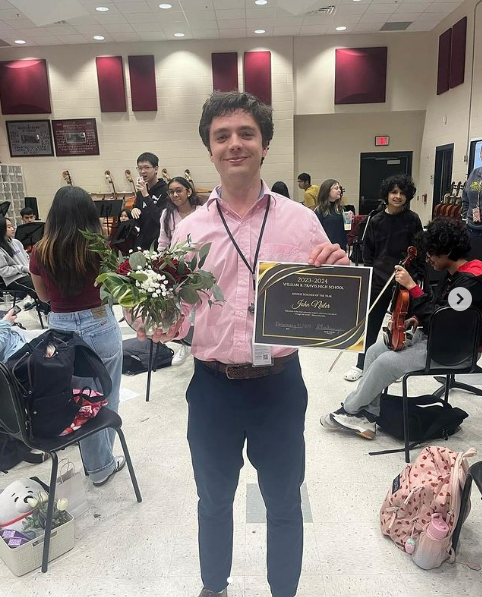
John Niiler
John Niiler
Music education alum named Rookie Teacher of Year in Texas school district
University of Alabama alumnus John Niiler was named a 2024 Secondary Rookie Teacher of the Year by the Fort Bend Independent School District for his work as assistant director of orchestras at William B. Travis High School in Sugar Land, Texas.
Niiler earned his bachelor's degree in Instrumental Music Education in 2023, graduating summa cum laude and receiving the Most Outstanding Student Award. During his time at UA, he was a cellist with several symphonies and orchestras and gave private cello lessons to students.
U.S. News ranks College of Education graduate program 58th in nation's best graduate schools
The U.S. News and World Report announced its Best Graduate Schools for 2024 this month. The University of Alabama education graduate degree program was ranked #58 in the nation.
Emmanuel Babalola and Francis Yakubu were judges at the Undergraduate Research and Creative Activity Conference on March 26.
Emmanuel Babalola and Francis Yakubu were judges at the Undergraduate Research and Creative Activity Conference on March 26.
Raven Butler and Dr. Cailin Kerch with Butler's undergraduate research poster presentation.
Raven Butler and Dr. Cailin Kerch with Butler's undergraduate research poster presentation.
Butler presents her undergraduate research during URCA.
Butler presents her undergraduate research during URCA.
Annabel Leonard with her poster presentation at URCA.
Annabel Leonard with her poster presentation at URCA.
Julianna Delaune with her presentation during URCA.
Julianna Delaune with her presentation during URCA.
Shelby Ballard was honored for Outstanding Presentation in Education at the URCA awards luncheon on April 12.
Shelby Ballard was honored for Outstanding Presentation in Education at the URCA awards luncheon on April 12.
Ballard, left, and Dr. Firat Soylu, right, were recognized for their excellent work as student and mentor.
Ballard, left, and Dr. Firat Soylu, right, were recognized for their excellent work as student and mentor.
2024 Undergraduate Research & Creative Activity Conference
The 18th annual Undergraduate Research and Creative Activity (URCA) Conference took place March 26 at the Bryant Conference Center with more than 550 students attending to present their research. URCA is a University-wide event that underscores undergraduate student research and creative activity by allowing students from a variety of disciplines to present their work and connect with faculty and the UA community.
Shelby Ballard and Dr. Firat Soylu were honored at the URCA awards luncheon on April 12 for their excellent work as the conference's Outstanding Presentation in Education winners. Their winning presentation abstract is included below:
Presenter: Shelby Ballard
Mentor: Firat Soylu
Do adjacent letters elicit a P3 response?
In a visual oddball task, participants are shown frequent and infrequent (target) stimuli. Participants typically elicit a P3 response when shown stimuli that are in a different category than frequent stimuli. P3 ERP components are linked to categorization of stimuli. At approximately 350 ms, when rare stimuli are presented, there is an elevated neural response. 40 participants were presented with the task in which one of 5 letters (A, B, C, D, E), would be the target letter. The target letter was shown 20% of the time. Participants were asked to press one button when the target was shown and another button when non-targets were shown. When participants were shown the target letter, there was a typical P3 response. My research question was: will participants show a similar P3 response when letters adjacent to the target letter are presented? For example, B is adjacent to C. After analyzing data with ERP Lab, the results showed that there is a minimal P3 response to adjacent letters in the visual oddball task. This suggests that people are quick and accurate in understanding the difference in categories. This result could impact further research related to cognitive mechanisms involved in categorization.
Block 3 students enter
THEIR TEACHING ERA
Students were all smiles throughout the Elementary & Early Childhood Program's biannual Block 3 Early Childhood Education Pre-Internship Orientation. The theme for this year was "Teacher Era," which was a nod to the students' love for Taylor Swift.
C&I CEE 496 instructors Melissa Leahey and Vivian Miller, ECE Pre-Internship faculty, as well as ECE Clinical Assistant Professor Dr. Mandy Cramer helped coordinate the event. Additional support was provided by Dr. Stacy Hughey Surman, Dr. Tracy Windle, OCE supervisors, Dr. Miguel Montero, and Angelia King.
We wish our Block 3 students the best as they take the next step in their teaching journey!
Pilates can take you and your health to new places
The morning of April 9, Dr. Cathy Pagani and 10 students from her KIN 109 class met in Smith Hall, though they were not there to tour the Alabama Museum of Natural History. They each carried a Pilates mat, neatly laying them on the floor beneath the massive skeleton that hung above.
Under the replica of a basilosaurus cetoides — an early archaeocete whale that lived off the state coast 34 to 40 million years ago — and surrounded by fossils, Dr. Pagani led her class in a series of Pilates exercises. This was an interesting change of scenery from the UA Student Recreation Center, where the class usually meets in the mornings.
Physical Condition: Pilates is a course that equips students with the skills and knowledge to help them practice Pilates safely and effectively. Pilates is a holistic whole-body movement and mind approach to exercise developed by German physical trainer Joseph Pilates in the early 20th century. By using a system of repetitive exercises, it improves your physical health and well-being but your mental health as well by helping your body release stress and other emotional tension.
Not enrolled in one of these Pilates courses? No problem. The Student Recreation Center offers 45-minute group exercise classes in classical and modern mat pilates as well as Pilates Reformer classes. The reformer classes incorporate Balanced Body Allegro® Reformers and other props to help individuals get the most out of their experience. For additional information on these (and yoga) classes, please use the buttons below. For other exercise classes available at the Student Rec Center, visit the Fitness page on the University Recreation website, where you can also find membership options and info on guest passes.
ADAPTED ATHLETICS EARNS
MULTIPLE CHAMPIONSHIPS
Student-athletes in The University of Alabama’s Adapted Athletics program earned national championship status in both women’s wheelchair basketball and para track and field.
Read the full article here.
HONORS DAY 2024
Undergraduate Honor Graduates
Summa cum laude: GPA of 3.9 or greater. Magna cum laude: GPA of 3.7 or greater, but less than 3.9.
Cum laude: GPA of 3.5 or greater, but less than 3.7. Latin honors are calculated on UA GPAs.
May 2024 Candidates
Summa Cum Laude
Hannah K. Adams
Shoshana L. Ambers
Jack D. Barnes
Emma R. Bauer
John T. Bonvillain
Ashley P. Breindl
Abigail E. Burley
Veronica M. Campbell
Alice A. Carey
Grace E. Carmosino
Veronica G. Cody
Erin R. Coiro
Meredith L. Crego
Anna C. Cuomo
Ashley N. Devoe
Lillian N. Duke
Carley C. Dyer
Caleb D. Enfinger
Macie L. Fanning
Graci E. Fowler
Olivia G. Freed
Hannah G. Gentz
Annabel R. Gilligan
Graci D. Gilliland
Emily L. Goozen
Katherine G. Grill
Alexander T. Gruchot
Presley A. Guin
John W. Harless
Alexa G. Herron
Sarah E. Hicks
Emma O. Holland
Graham M. Holzapfel
Anna X. Hopwood
Janna L. Jewell
Dalton L. Johnson
Krimson A. Kidd
Taylor M. Knox
Megan G. Knuppel
Faith E. Kuper
Kathleen E. Lelko
Annabel E. Leonard
Eliana G. Leonard
Jacob C. Livingston
Irelynne D. Loesche
Leslie Luna
Ella S. Malek
Anna M. Martin
Dakoda L. Mincey
Nicole E. Mitchell
Annamarye R. Morgan
Alyson C. Morris
Ashley A. Muscarella
Lorin A. O’Rear
Brian C. Osburn
Ashlyn R. Pack
Emily A. Panciroli
Brown P. Patterson
Marissa D. Richards
Natalie S. Richards
Mary L. Rivers
Victoria A. Rohner
Erin N. Sanford
Abigail E. Scott
Emily M. Sheppard
Alexandra G. Smith
Anna C. Sorrells
Corinne E. Stanton
Lindsey B. Stewart
Kylie M. Stouder
Maria K. Talabis
Giselle A. Tropeano
Brooke Volpe
Brady A. Weems
Delaney N. Williams
Olivia A. Wombacher
Skyla B. Wright
Emily C. Yi
Magna Cum Laude
Lauren K. Adams
Kaylee G. Anders
Caroline K. Bradford
Ananda Burrell
Kamryn E. Cole-Wood
Emily C. Corbett
Eleanor A. Cox
Elizabeth A. Dieckhoner
Kenzie M. Dircks
Eva E. Dreiling
Cameron A. Duncan
Alexis N. Elksnis
Kaitlyn J. Evans
Madelyn G. Farmer
Lindsey G. Fisher
Madeline E. Fleming
Caleb O. Fondren
Lillian M. Gabriel
Alexis L. Henson
Darby A. Hickman
Julia E. Holcomb
Samantha G. Holliman
Caitlin M. Howell
Paisley B. Hudson
Seth D. Hudson
Mary K. Hughes
Kaley B. Jones
Ashlyn . Kelley
Ella C. Kemna
Allison K. LeBlanc
Madison P. Lesser
Lauren V. Little
Caroline E. Montgomery
Macy E. Montgomery
Madison G. Murry
Laura G. Nelson
Molly E. Norris
Maeve C. O’Brien
Mary H. O’Brien
Joseph M. Powell
Abigail D. Pratt
Carlie A. Santos
Colin A. Schleicher
Margaret A. Stuardi
Jordon M. Tidwell
Victoria M. Vandiver
James M. Watson
Maggie L. Willis
Ross T. Zeanah
Cum Laude
Taraneh Abolfath
Cadden P. Arlis
Abigail L. Beech
Chandler L. Brewer
Katherine A. Brockmann
Lane B. Burbage
Ashleigh A. Burroughs
Covington C. Byars
Olivia N. Carpenter
Ella B. Centracchio
Luc M. Charlebois
Jett R. Clayton
Sarah L. Desmond
Alyssa . Eidson
Amaria M. Fulgham
Madison B. Heatherly
Ashleigh L. Hogan
Noelle E. Jones
Anna K. Kelley
Allison I. Lavin
Andrew E. Link
Laura B. Lunsford
Brendan M. Mulanix
Caroline E. Murray
Kyle M. Owens
Ritik K. Patel
Moira E. Paulus
Kacy R. Powell
Kaitlyn M. Roberts
Kaela J. Robinson
Audrey L. Sams
Britton L. Samuel
Emily A. Scarborough
Bethany J. Shafer
Lakien M. Shinault
Samantha M. Sirk
Taylor R. Smith
Grace R. Solazzo
Elizabeth R. Struble
Olivia R. Taylor
Abbrionna A. Thomas
Grace A. Todisco
Parthasarathi Venkatram
Makenzie C. Watlington
Jessica Watson
August & December 2023 Graduates
Summa Cum Laude
Andrea S. Albus
Rachel K. Banks
Jonathan B. Burks
Olivia A. Burleson
Grace C. Crawley
Alexis N. Davis
Jaclyn H. Finn
Lauren K. Haley
Cade T. Herring
Katelyn M. Herring
Olivia G. Jones
Daniel J. Jorgensen
Ashleigh J. Ketch
Julianne E. Koebel
Julia K. Leskow
Kayli J. Lucas
Adrian Martinez
Caroline G. Neisler
Paige S. Nicholson
Alexis M. Northcutt
Grace E. Otto
Hope M. Owens
Alyssa L. Poe
Kyleigh R. Richardson
Sarah Q. Richey
Jamia C. Stokes
Hailey K. White
Magna Cum Laude
Sydney T. Battams
William Blackledge
Shyla D. Dumas
Alexzandria M. Eytel
Hannah K. Ferguson
Graham C. Humphreys
Jamyah L. Jackson
Payton L. Mcdaniel
Sarah L. Paul
Sara E. Priborsky
Patrick A. Royster
Gessica L. Skorka
Sophia M. Spada
Avery A. Stiber
Hannah N. Yasenchok
Cum Laude
Allison D. Bobo
Andrew M. Bunker
Zachary L. Chorn
Amelia G. Collins
Tionna Douglas Cargle
Samuel O. Gomez
Cadee A. Hood
Isabel P. Horn
Madison M. Irvin
Samantha Kunza
Amanda C. Menton
Cody A. Monday
Kate A. Pittenger
Ella M. Rocha
Jamie R. Schaffer
Rachel M. Truex
Myrikle Walker
Preston G. Zelhart
College-wide Awards
Most Outstanding Student Awards
Curriculum & Instruction
Early Childhood Education (Undergraduate) Allie Lavin
Elementary Education (Undergraduate) Annamarye Morgan
Elementary Research (Graduate) Kaleigh Pate
Elementary Service (Graduate) Qi Si
Elementary Teaching (Graduate) Kristen Johnson
English Language Arts (Undergraduate) Lorin O’Rear
English Language Arts (Graduate) Terry Mantooth & Abby Patterson
Literacy (Graduate) Lucy Rogers
Mathematics (Undergraduate) Cadden Arlis
Mathematics (Graduate) Jay Jackson
Science (Undergraduate) Veronica Campbell
Science (Graduate) Jale Ercan Dursun
Social Science (Undergraduate) Caleb Enfinger
Social Science (Graduate) Michael Hartzell
Overseas Student Mariana Adame-Martinez
Educational Leadership, Policy, & Technology Studies
Educational Leadership — Ph.D. Casey Dykes and Jonathan Hood
Educational Leadership — Ed.D. Katrina Smith
Educational Leadership — Instructional Leader, Ed.S. Jonathan Allen
Educational Leadership — Library Media, Ed.S. Jolynn Fenton
Educational Leadership — Teacher Leader, Ed.S. Crystal Johnson
Educational Leadership — M.A. Mary Beth Gilliland
Higher Education Administration — Research, Ph.D. Andrew Ross D’Entremont
Higher Education Administration — Service, Ph.D. Chelsea Fancher
Higher Education Administration — Exec. Ed.D. Demitrius Barksdale
Higher Education Administration — Ed.D. Erika Mason-Imbody
Higher Education Administration — M.A. Hailey Kubilus
Higher Education Administration — M.A. (Online) Jennifer Dugat
Higher Education Administration — Teaching Certificate Adam Wolecki
Higher Education Administration — Service, M.A. Iesha Smith
Instructional Technology — Ph.D. Judi Fike
Instructional Technology — Innovation, Ph.D. Victoria Pei
Instructional Technology — Research, Ph.D. Jill Westerlund
Instructional Technology — M.A. Elizabeth Brooks
Instructional Technology — Certificate Chloe Gooden-Ighabor
Social and Cultural Studies — Ph.D. Shelby Morris
Educational Studies in Psychology, Research Methodology,
& Counseling
Clinical Mental Health Counseling Carolina Goyeneche Gomez
Counselor Education — Ph.D. Fatima Akmal Leghari
Counselor Education — Ed.S. Melissa Baker
Educational Psychology Ghasim Nabizadehchianeh
Qualitative Research April M. Jones & Venus Trevae Watson
Quantitative Research Mehdi Rajeb
Rehabilitation Counseling Monica Martin
School Counseling Morgan Ratynski
School Psychology Laura Galles Mitchel
Kinesiology
Exercise Science — Ph.D. Annie Mulholland
Exercise Science — M.A. Tiffany Adams
Exercise Science (Undergraduate) Anika Clark
Sport Pedagogy (Graduate) Adam Wolecki
Physical Education Teacher Education (Undergraduate) Brown Patterson
Music Education
Choral Music (Graduate) Siyu Tian
Instrumental Music (Undergraduate) Sarah Hicks
Instrumental Music (Graduate) Emily Monson
Special Education
Autism (Graduate) Monica Hartis
Collaborative Teacher (Undergraduate) Krimson Kidd
Collaborative Teacher — Multiple Abilities Program Cohort (Graduate) Abby Grace Walker
Gifted and Talented (Graduate) Lore Bennett
Early Childhood Special Education (Undergraduate) Mary Kathleen Hughes
Multiple Abilities Program (Undergraduate) Skyla Wright
Severe Disabilities Linda Cheshire
CrossingPoints Certificate in Occupational Studies Luther Richardson
Graduate Research, Teaching, & Service Awards
College-wide & University Wide Outstanding Research by a Doctoral Student
Rong Zhang
Outstanding Service by a Graduate Student
Lavender Huaiyue Zhang
Dissertation Research – Honorable Mention
Stacy Jett Jess
Dissertation Research – Honorable Mention
Sarah Ramaiah
Dissertation Research – Honorable Mention
Christopher Shropshire
Recognition for Excellence in Dissertation Research
Dr. Kameron Carden
Evaluation Perceptions and Practices for Preschoolers Who Are Deaf/Hard of Hearing Using Listening and Spoken Language
Dissertation Chair: Dr. Robin McWilliam
Recognition for Excellence in Dissertation Research
Dr. Sylvia Hollins
#Wokework for School Counselors or Nah? A Quantitative Analysis of National Survey Data Examining the Antiracist Practices of School Counselors
Dissertation Chair: Dr. Joy Burnham
M. Ray Loree Most Outstanding Dissertation
Dr. Mark Butt
The Role of Letters of Recommendation in Perpetuating or Challenging the Social Stratification of American Secondary Schools: A Quantitative Analysis of Admission Officer Assessments in Highly Selective College Admission
Dissertation Chair: Dr. Nathaniel J Bray
Departmental Awards
Janice Bargdill Wilson Award for Excellence in Teaching with Children’s Literature
Ella Malek
This award honors the late Wilson, Assistant Professor of Elementary Education, by recognizing an undergraduate elementary education student who has exhibited excellence in teaching through the use of children’s literature.
Judy L. Bonner Award for Nurse Educator of the Year
Laura Fletcher-Djibo
This award honors Bonner for her leadership in the development of the interdisciplinary Ed.D. for Nurse Educators. The recipient of the award has evidenced the traits of integrity, enthusiasm, and creative leadership.
George H. Stopp Academic Achievement Award
Giselle Tropeano
Established by George Stopp, Jr., in memory of his father, George Stopp, Professor of Recreation, this award is presented to a student in the Department of Kinesiology who has achieved the highest GPA as a senior.
The University of Alabama Adapted Athletics Academic Award
Luke McDowall
This award recognizes a student who is a member of Adapted Athletics for their academic achievements.
Jasper Harvey Award for Excellence in Graduate Studies
Megan Lord
Harvey, the first Professor of Special Education in Alabama, was hired in 1959 to design the College’s Special Education programs, which he directed from 1959 to 1969.
Tommy Russell Award for Excellence in Doctoral Studies
Carolina Kudesey
Russell, Professor of Special Education, was the recipient of the first doctorate in special education awarded at the Capstone (1963) and he chaired the program in cognitive disabilities from 1968-1996.
Stephen A. Willard Memorial Award
Megan Fedewa
Willard, Professor of Special Education, was the director of the special education program and founder of the Hackberry Summer Camp program for persons with disabilities.
Kappa Delta Pi Award Distinguished Undergraduate Scholar
Ella Malek
This award is presented to the graduating senior with the highest cumulative grade point average.
2023 Kappa Delta Pi Initiates
Kylie Baldeosingh
Marilyn Barnes
La’Toya Barnes-Anderson
Morgan Beggs
Breanna Bell
Sophia Biernat
Garyn Blair
Allison Bobo
Lee Ann Box
James Bozeman
Amy Bradl
Kelly Bragg
Ashleigh Burroughs
Abigail Chandler
Penny Chasko
Amber Colon
Saul Cortez
Julie Crawford
Meredith Crego
Ashley Dancy
Sarah Desmond
Katlyn Dickerson
Marilyn Dillard
Jennifer Dugat
Katherine Edge
Alexzandria Eytel
Madelyn Farmer
Madeline Fields
Emily Fountain
Raeven Fowler
Veronica Funches
Eric Garmon
Tiffany Green
Monica Harris
Jerran Hill
Maryluz Hill
Sarah Hinton
Amanda Holtzclaw
LaFecia Hoover
Madison Irvin
Brandy Jackson
Jamie Jackson
Richard Johnson
Breanna Johnson-Anderson
Hailey Kilian
Kerri Kitchen
Ashley Liberto
Amanda MacDonald
Jennifer Mahnken
Julia Marquardt
Monica Martin
Rachael McDonald
Allison McGlaughn
Meghan Miller
David Morris
Joycelyn Morris
Michael Morris
Emma Mullenix
Erin Neary
Laura Nelson
Paige Nicholson
Alexis Nolen
Maeve O’Brien
Ciera Pendley
Allyson Pitzel
Kirsten Racioppi
Amelia Ragusa
Stephanie Rayburn
Mya Reliford
Amanda Rhinehart
Leann Rhodes, Ed.D.
Jasmyne Rogers
Reginald Savage
Emily Scarborough
Taylor Smith
Colbi Snider
Grace Solazzo
Emma Stunda
Cecilia Sutton
Ashley Symonds
Haley Tew
Carla Thomas
Grace Todisco
Myrikle Walker
Leslie Warren
Chelsea Wells
Sydney White
Felita Winn
Stephanie Yonce
Saphronia You
College of Education Ambassadors
Kaitlyn Balding
Caitlyn Bobo
Lily Burnett
Veronica Campbell
Meredith Crego
Stephanie Crist
Macie Holcombe
Grace Lassiter
Lauren Lee
Magnolia Malone
Brian Matias
Nicole Mitchell
Jinaya Murrell
Maggie Shelton
Lillian Stermer
Aaliyah Taylor
Jared Williams
Upcoming Events
MAY 8
COE Faculty & Staff Retreat
The College will hold its first-ever Faculty and Staff Retreat next month! The daylong event will be held in the Rast Room at the Bryant Conference Center.
MAY 27
Memorial Day
UA closed, classes dismissed.
JUNE 19
Juneteenth
UA closed, classes dismissed.
JULY 4
Independence Day
UA closed, classes dismissed.
OCT. 26
Homecoming 2024
Alabama will take on the Missouri Tigers for Homecoming this year.
Registration and ticketing for events and programs will open early in the fall semester.
Student Deadlines
🌟 REMINDER 🌟
Graduation Cap & Stole
Students can pick up their cap and stole for the Spring 2024 commencement ceremony in 104 Carmichael Hall.
APRIL 26
Classes End
Final day of classes for the Spring 2024 semester.
APRIL 29 – MAY 3
Final Exams
For the full exam schedule and additional information, visit catalog.ua.edu/undergraduate/about/academic-regulations/curriculum/final-examinations.
MAY 3
Spring 2024 Commencement
The commencement ceremony for College of Education graduates will take place May 3 at 7:30 p.m. For more details, visit commencement.ua.edu.
SUMMER CLASSES START
MAY 6
Interim Session and All Summer
MAY 28
Full Term and Summer 1
JULY 3
Summer 2
Have news or story ideas you want to share? We want to hear from you!
Email us at klsexton@ua.edu or rebecca.ballard@ua.edu.
Visit the official College of Education website at education.ua.edu.

